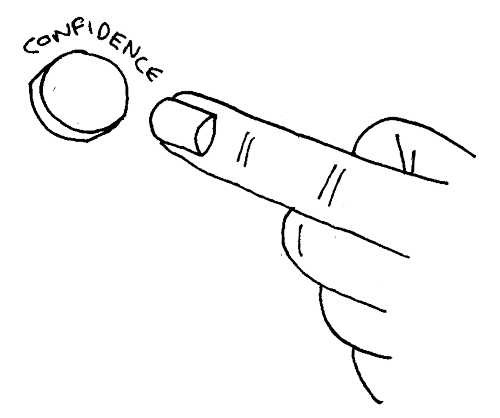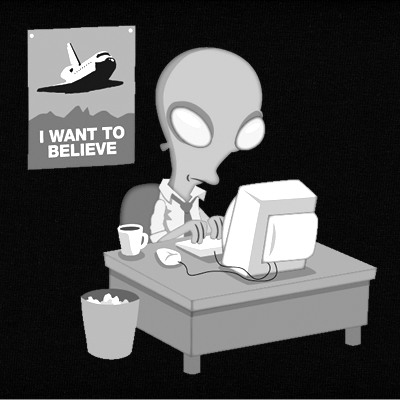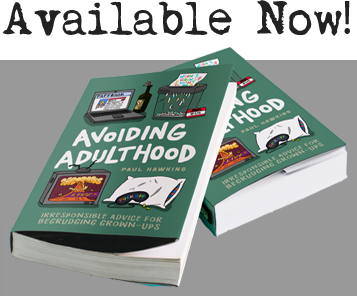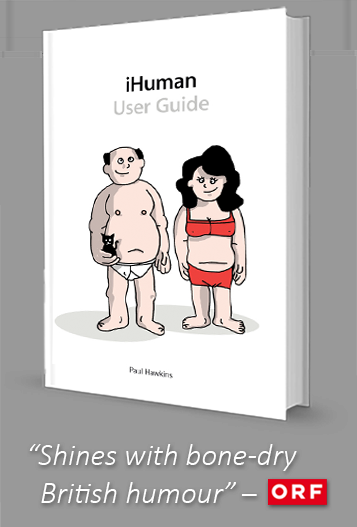The first thing that generally strikes smart, young adults about the world is not just how unfair and unapologetically insane it is, but how casually society seems to be responding to this arrangement. They might learn that there is enough food and buildings for everybody, for example, before somebody else tells them, “well, yes, but there’s not enough money to pay for them, so you need to get a job.”
At this point, flabbergasted, a smart, young adult would have to be pretty lacking in creativity if they didn’t next think, “What? Who’s in charge of this madness? These lunatics must be stopped!
Soon after, no doubt, they’ll probably stumble upon some set of clever-sounding ideas about how to make it all instantly better, also known as an ideology. This is a set of opinions which instantly allow an otherwise happy adult to imagine what the world could be instead, and then be immediately, unendingly disappointed by what it is not.
So far, so good. That’s your twenties sorted.
The more they learn more about politics, economics, and history, however, the more a creeping, uncomfortable realisation might start to settle in to the smart, young person’s head. The World— upon closer inspection — reveals itself to be almost infinitely complicated in every direction; complex, intricate and unhelpfully fragmented; famously tricky to unite and worryingly fragile to manage.
The more they learn about, like, you know, The System, man, the more they might become aware of the almost limitless ways it could go wrong. Some evils, uncomfortably, start to seem like necessary evils, and some bastards — much to their personal horror— become their bastards, as those bastards increasingly emerge as the lesser of all available bastards in the great, big possible bastard bag of life.
Essentially, the world they live in — with all its flaws, stupidity and entrenched unfairness — starts to not look so bad, compared to what it could be instead. With every passing book and newspaper, it looks less like some grand machinery could be wrestled from the forces of old and evil then steered into a bright tomorrow if enough people grab the wheel all at once. Instead, it looks more like a flimsy, long-running arts and crafts project, made of match-sticks and bits of old cereal box, with the occasional sequin for glamour, beset on all sides by a legion of limb-waving, sugar-addled toddlers, while a lone kindergarten volunteer or two try desperately to keep them at bay just long enough for the PVA glue to dry.
We call it civilisation.
Their idealism, after a messy enough collision with reality, might then slide into cynicism or apathy (“this world is stupid and broken and terrible and I want nothing to do with it!”) However, there’s something else it could become: a queasy, reluctant, begrudging, unenthusiastic kind of appreciation. For whatever reason, ‘civilisation’ in some clumsy, crappy form is presently ticking along. Slowly but surely, their mild and brewing paranoia that some global mischief is afoot might dissolve into a more sober, sympathetic and ultimately terrifying world-view: that civilisation might be nothing more than flawed, confused, ignorant, boring and ordinary people like them, trying their very best.
Oh god, the horror.
Indeed, probably the only thing more frightening than imagining a tight-knit global conspiracy of powerful elites in charge of everything is the realisation that there isn’t one. There’s no grand plan. There’s no plan. It’s all just people, in offices, sending e-mails, eating paninis, yawning, and no one knows what the hell is going on.
Given this sophisticated, horrible new understanding of their ignorance and impotence, political notions like ‘moderation’ – playing it safe and maintaining ‘the status quo’ – start to look more defensible than gathering all of their mates, covering their face, and charging towards the palace with a bunch of fire extinguishers and cricket bats. No.
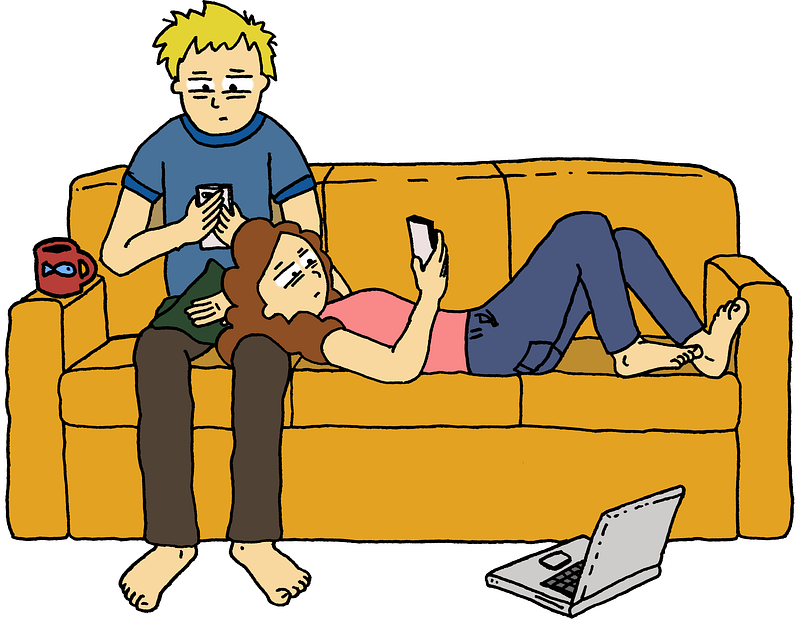
Accepting that they probably live in a world where so much more could go wrong than is currently going wrong, it seems increasingly rational to just stick with whichever boring party or dead-eyed candidate is least likely to interrupt their as-yet unbroken, uncompromised access to beer and cheese. Bernie “I want to be Norway” Sanders starts to look infinitely safer than Donald “I want to melt the Middle-East” Trump, but — in the end — they’ll probably sleep easiest once the Americans abandon their giggly fling with Karl Marx and Ayn Rand, and begrudgingly marry Hillary “What would you like me to say?” Clinton. Yes, we all know she’s awful, but — in her defence — at least she’s awful in exactly the way we all know. “The Establishment” is established, after all, because the whole works has not yet fallen apart on their watch.
It’s hardly a strong opinion of support, but — if you’ve ever had a heated argument about politics with a member of a competing ideology — what you might have noticed is that strong opinions are the age-old nemesis of fun.
And so I turn to the U.K. referendum on leaving the E.U., which has inspired a surprising amount of very strong opinions. Indeed, there’s been so many outbursts of passionate conviction recently on the island, you’d think the issue involved tea.
For the less fanatical voter, however, it has been almost perfectly confusing. Even for those who normally have an ideology-donkey to pull their opinion cart, this referendum has failed to summon the usual clear decision. Membership of the E.U., it seems, is amongst those rare issues that can unite (and divide) the Right and Left equally. It is both a grand, bureaucratic tool of economic redistribution, and a market-unifying lever for greater freedom of goods and services. It is like a big, unwieldy socialist interfering thing, clumsily lubricating the market cogs of capitalism. Only with an issue so big and weird could the British political scene divide as it has, with Jeremy Corbyn, David Cameron and Nick Clegg on one side, and George Galloway, Boris Johnson and Nigel Farage on the other. It’s like the usual chess-board has been blasted with a power-hose and re-assembled by someone with a head injury.
How, then, should one make a pragmatic decision of this nature? Through which lens — house prices, immigration, GDP, industries, wages, prices, ideals — should we even squint at the binary choice on offer?
Well, luckily for us, one answer that both sides can agree on is fear. Both sides have accused the other of scare-mongering, and both sides have defended themselves from the claim. Britain should be afraid of Leaving the E.U., we are told, because of reasons A, B, and C, and yet we must also hold in mind the terrifying dangers of X, Y, and Z, which litter the horizons of Remaining.
So, if “Project Fear” is the most reliable way to chase the jittery and risk-averse to the voting booth, here are the three most terrifying reasons why I think Remaining seems less terrifying:

TERRIFYING REAL SUPER-FEAR #1 — NUCLEAR WAR!
We need peace between the world’s nations, because we’ve now become so good at making explosions, that the de-escalation of explosion-inspiring conflict is now essential. If the world — in a similar configuration as it is now — could stumble into the second world war, with the tinnitus of the trenches still ringing in its ears, I see only flimsy reasons to trust that we wouldn’t or couldn’t do it again, despite knowing in the abstract what it would likely mean. We are a world of institutional hierarchies — in other words, increasingly few egos, making increasingly big, unpleasant decisions. Combined with arrogance, stubbornness, ignorance, and irrationality — qualities a hundred thousand years older than the 50 megaton nuclear warhead — this is a frankly silly landscape for an “us and them” form of politics to play out in. With the totally unprecedented and modern impossibility of surviving another war (i.e. a third “world” one, which our current configuration of alliances could easily force upon us, from just the stubborn human escalation of one small squabble), the surest way to species-level safety, it seems to me, is to become so inter-dependant and inter-linked that it becomes practically impossible to trigger the traps set at our borders, by intentionally and methodically de-bordering the world as much as is feasibly possible. To aim, in other words — for a Great, Big United States of the European Union of Everyone ©.

TERRIFYING REAL SUPER-FEAR #2 — CLIMATE CHANGE!
Sorry if you’d already figured this out, but we need environmental health for no lesser reasons than existing. We’re hamsters, in the cage of Earth, and our owner is dead. If you think this situation is going to keep being fine indefinitely, you’ve never had a hamster. We probably don’t need to fear the total destruction of the human race just yet (some of us will find some way to survive, probably, because we’re nifty), but we really do have to worry on much, much nearer timescales about the frequency of extreme weather events and sea level rise, which threaten to create instability and mass human displacement like the world has never known. The ‘migrant crisis’ was a mere conga line, compared to what seems to be coming. Uninterrupted, this will be The Century of Refugees, going in any and all directions. 80% of the world’s population live on the coast, and the water’s edge also hosts an unhelpful amount of the world’s nuclear power plants, reliant as they are on a constant supply of wetness to cool their reactors. Ugh. Serious conversation on these topics suggests — well, let’s not depress ourselves — but, let’s just say, some stuff needs to be done, ok? So, answer yourself this: how is some stuff most likely to get done? By individual people, or by slowly growing grass-roots movements of idealists, or by massive, massive, pre-established institutions?

TERRIFYING REAL SUPER-FEAR #3 — GLOBAL INSTABILITY!
As boring and unromantically moderate as it sounds, we need civilisational stability to do everything else that’s good for us in the long-term: a serious enough shock to our increasingly interconnected global economy or political systems — a depression, a collapse in the dollar, runaway inflation — could affect everything else of significance that we’re quietly doing in the plodding, uncelebrated world outside of the rolling news headlines. Look at this list of notable people who endorse Leave and Remain, and see where the world’s scientists, academics, doctors, Nobel laureates, and inventors have thrown their weight. This is important. All of the cool and useful stuff that could just make the future maybe good and fine again, like medicine discovery and space programs and electric cars and vertical farms and lab-grown meat and renewable energy infrastructure, must all grow out of the soil of our present-day, fragile, political and industrial context, where the work of the world can Start or Stop, based on the erratic swing-o-meter of The Economy. Faced with the extent of what we don’t know about what we don’t know, how safe is it to touch the house of cards? We don’t know, obviously. So, please leave scientists and their money alone.

In relation to the U.K. referendum on E.U. membership, to me it all means this: no matter how good the arguments for Leaving are (and I think there are some good ones, mixed in with some silly, dangerous and confused ones), the arguments to Remain would still be better: it is easier to tackle global problems, the closer we go in the direction of global governance. The E.U. is a step in this direction; Brexit is a step away. We make war less probable and less possible, the less borders we have to war over. The E.U. is a step in this direction, Brexit is a step away.
As for the U.S. Presidential election, Mr Donald would be an entire tango backwards. He denies climate change, yet blunders ever forwards in the race to lead the planet, having paid no political price for believing himself smarter than scientists. Through the right ideological lens, Mr Donald could be everything that his most loyal supporters think he is — smart, strong, business-savvy, anti-establishment, straight-talking, patriotic, idealistic, incorruptible, great — and it would still be madness to let elect him, based on this one opinion alone. Ignore what he says about Mexicans, Muslims, Women, Walls, everything — Mr Donald must be hammered on this question, and this question only: what would you do, sat in earth’s most powerful seat, in earth’s most urgent time, to save it? His answer, whether he understands it or not, is fuck you, we’re going down with this ship.
This “save ourselves” bullshit of nation states is fast becoming fatally irrational. What we think of as ‘self-interest’, i.e. Britain’s self-interest (Think Brexit, UKIP), or the USA’s self-interest (Think Mr Donald), is near-sighted confusion. Our problems are bigger than national. On time-scales longer than an election or a presidency, it’s sado-masochistic, self-sabotaging, suicidal delusion, or — in Trump-speak— “not amazing.”
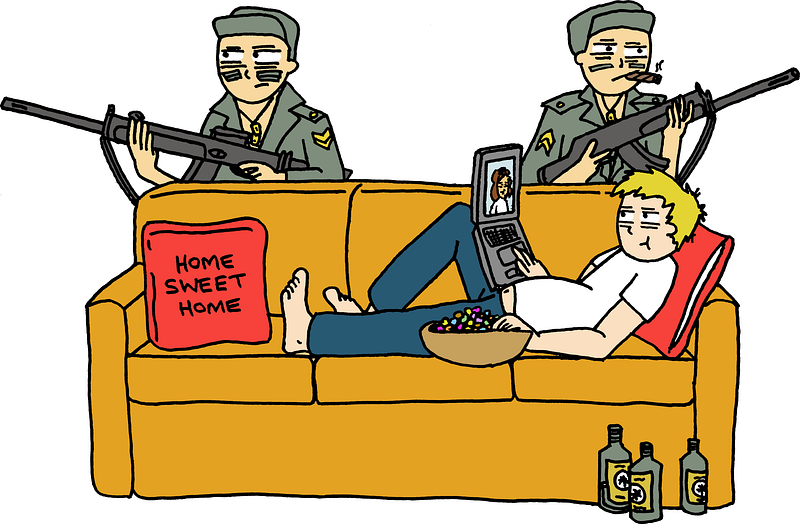
When we run out of antibiotics, we all run out together, and viruses will not stop at check-points, fences and walls. A nuclear winter would roll across all of our skies, and, when the swollen sea rises, it will not know who owns the cities that it swallows from the coast. A world of nuclear weapons and tense border-based disputes is insane. A world of climate-poisoning and countrified, competitive GDP-racing is lunacy. It is one planet; one eco-system; one species that lives in one food chain under its one sky.
House prices, immigration, GDP, industries, wages, prices, ideals … these issues seem important to individuals and communities. But when you zoom out to the level of civilizational stability, environmental health and existential safeguards, which are the context for them, they start to seem as problematic as an itch on your ankle, one moment after you’ve noticed your parachute wont open.
Increasingly global governance will, of course, be difficult, presumably in all the ways that E.U. membership and NAFTA membership is difficult — but who or what is offering a sensible alternative? There is not the time to design it. The I.M.F., W.T.O., W.H.O., U.N., World Bank, and all of the intra-national bodies from your favourite conspiracy theories are flawed and scary, yes, but they also hold a lot more hope of acting in the global, species-level interest than their smaller, older, and more locally self-interested equivalents. A bodge-job of a One World Government still sounds much more promising, after all, than the two hundred bloody Belgiums we’re currently working with.
Think, too, of the benefits, whatever your ideology: It’s ironic on a global scale to have taxes and tax havens. Justice’s limits are jurisdictions. Welfare and socialist programs struggle because of the migration incentives involved. Free trade, on the other hand, is hindered by tariffs, customs, and sanctions. Arguably, humanity’s biggest achievements so far, from the International Space Station, whizzing over our heads every 90 minutes, to the Large Hadron Collider, recreating the Big Bang beneath our feet, were pulled out of cross-border collaboration, contributed to by countries whose extracurricular activities include bickering, and generally being silly to and at each other.
Imagine all the money spent on the Space Race in the 20th Century, then imagine it had not been in two bank accounts, but one. For one cool, hippy idea of what a really good new long-term goal might look like, imagine all of the world’s money that it currently spends on militaries — from the moon, all you’d see is humanity’s great expense protecting itself from itself — and contemplate the directions that money could be diverted, if we could overcome the institutional expressions of our tribal monkey nonsense. A decent Mars trip, for example: we could ‘back up’ our civilisation, our culture, and the light of human consciousness, so everything we’ve done from Algebra to Wikipedia is no longer prone to evaporation from one unfriendly space rock or some fatal form of home-grown nuisance.
It is going to be uncomfortable and problematic and sticky and hard and exhausting, but we may have to do it anyway. Just as we know it is unpleasant, but rational, to suffer the boring, repetitious cruelties of diet/exercise now for a greater chance of future health, so I think that civilisation too should be viewed through this lens. Instead of imagining politics to be a massive game of Whack-a-Mole, where we manically try and hammer each and every new PROBLEM as it pops up, to be instantly replaced by a set of new and different ones, we could imagine governance in terms of what problems we could and should perhaps endure, given how much cooler it would be to join the universe’s aliens, rather than its dinosaurs.
If we could magically swap something— 10% of global GDP, or Australia, for example — for a new antibiotic, or the removal of 50 parts per million of carbon from the atmosphere, it would be worth it (sorry, Australia), because if we could just solve the problem of keeping the earth cool enough and not all dying in some Dark Age puddle of a super-plague, we might buy ourselves a hundred thousand lovely years to slowly solve the rest.
If all these risks sound exaggerated to you, here’s the question: are you definitely right, or is there any chance you could be unknowingly enjoying the usual fuzzy-sighted tunnel-vision of a person living inside a civilisation that is presently ticking along? History, after all, is nothing but a vast and ugly catalogue of counter-warnings against our native intuition that we live in safe and stable times; any study of what has already happened, indeed, reveals only an enthusiastic habit of great swathes of humanity to leap enthusiastically into whatever brand of dumb mess their place in history has offered them that afternoon.
We can not retreat from joining the world — we are in it, in every important and relevant respect, whether we like it or not. Nationalism is a childish symptom that we have not yet learned to see ourselves as we are: not a collection of distinctive groups and tribes, which look out in all directions upon a wide flat world, and mark lines upon the earth where our ideas of us and them begin, but a quiet outburst of surprisingly clever animals, invisibly peppering the skin of a little pearly marble, in a gossamer-thin shell of air, floating in a vast and inky sea of blackness, with only ourselves to rely upon to wrestle a future from the daft inertia of the past.
Die Nerven, die Briten!

by Paul Hawkins & Goldmann/Random House
Ein Landsmann packt aus…
Was ist eigentlich mit den Briten los? Nicht erst seit dem Brexit muss man sich fragen, was das Inselvolk so anders macht. Warum sind die Briten so extrem höflich, reden immer über das Wetter und sagen nie, was sie meinen? Wer könnte das besser erklären als ein Landsmann. Paul Hawkins entlarvt skurrile Eigenheiten, Schwächen und Verwirrungen. Er verrät, wie man mit den Briten umgeht, ihre Höflichkeit und ihre Fußballfans gegen sie verwendet. Schonungslos, äußerst witzig und sehr aufschlussreich! Für alle, die dieses seltsame Volk verstehen wollen.
>> Click here to buy on Amazon
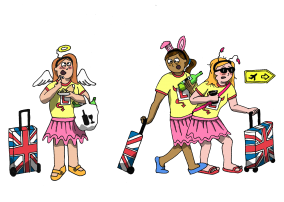 YAY?
YAY?
Clicking the World Away: Drugs, Addiction and the Future of Consciousness
Part I: The Remote Control
Imagine you had a remote control for your conscious experience of the world, and whenever you wanted to feel uplifted, think faster, relax more, experience joy, empathise with someone, enjoy more confidence, or be instantly less bored, all you had to do was push a button, and the desired state would reliably and instantly arrive to replace your current one. Click.
In this world, when you were sad, you would press a button. Bored? Press a button. You wouldn’t have to do laborious things like practice your speech in front of the mirror for weeks on in order to slowly build-up the native confidence to perform it in public. No, you’d press a button. You wouldn’t have to research areas of interest or pursue new hobbies for years to slowly alleviate the boredom inherent in monotonous and unproductive spare time. Nope. Just press a button. You wouldn’t have to go through a long, unwieldy session of therapy to slowly learn to fully empathise with and forgive your family, boss, or partner. How old-fashioned. Instead, why not pick up your Consciousness Remote Control, press a button, and simply change the channel of your conscious experience instantly? Click.
Here are some of the buttons I would expect any top-of-the-range Consciousness Remote Control to have:
Well, luckily we don’t have to work too hard to imagine a Consciousness Remote Control, because we already live in a world where almost precisely such a remote control exists.
We call them drugs.
The Remote Control
Saying positive things about ‘drugs’ is risky. It’s a baggage-laden collective noun for good reason, and it’s not hard to see why slightly more hysterical people might get emotional when discussing an umbrella term for things as diverse in their effects as coffee and LSD, beer and barbiturates, cigarettes and crack cocaine, magic mushrooms and morphine. However, there’s one predominant quality of all ‘drugs’ that is not at all controversial: drugs consist of stuff – powders, liquids, crystals, gases, beans, leaves, cacti, fungi, rotting fruit – that contain chemical compounds (look for the scrabble letters LSD, THC, DMT, MDMA, etc.), which can be absorbed by our mammalian bodies, whoosh through our bloodstreams, nip across the blood-brain barrier, and plug into receptors in our brains, that are – rather remarkably – exactly the right shape to take them. Then something pretty weird happens.
They change the experience of whatever part of life is currently screening in the theater of our consciousness.
CLICK.
Drugs are, quite literally, mind-altering substances. They are psychoactive catalysts (or gateways) to different states of consciousness – many of them so decidedly interesting, pleasant, uplifting, helpful or just generally appealing to try out that ‘we’ (society/voters/the government/whatever) make most of them illegal, so democratically afraid are we of dependency, addiction, and the other risks we perceive to civilisation of too many people having too nice a time on their own, instead of doing all the other things they’re supposed to. Comedian Louis C.K. put it this way:
I don’t know how I’m going to tell my kids [about drugs] … How do you take a miserable person with no control over their lives, and tell them with a straight face: ‘you can’t do drugs … You can’t do it, baby… All drugs are are a perfect solution to every problem you have right now.’ How do you beat that?! Drugs are so fucking good… that they will ruin your life! That’s how good they are!
Think about it this way: your waking life feels like an experience (rather than a something which is having an experience), because you only experience life from one perspective – a kind of ‘headless’ vantage point as the consciousness ‘you’ are. Hopefully, it’s a mostly good experience. If ‘you’ are indistinguishable from your thoughts, feelings, and experiences funneling through your head, then what drugs are actually doing is temporarily changing who you are. (This should be our first clue as to why some people crave them, some people can easily dip in and out, and some people are terrified, perhaps rightly, to never go near them.)
In terms of the absolutely reliable consciousness changes that drugs bring about, drug dabblers, drug aficionados and drug addicts will find it increasingly easy to pair up many of the desired states listed on the Consciousness Remote Control with their corresponding chemical partners. Some of these conscious states are relatively mundane and familiar (drunk, over-caffeinated), some of them are harder to define (high, stoned), and some of them sit so far outside the parameters of normal conscious experience, they feel less like you’re changing the channel of your experience, and more like you’re downloading an IMAX experience onto your wind-up radio (tripping.)
For our purposes, however, we will work with the most commonly-used drug on the planet, because it is the one that the majority of readers are most likely to be familiar with: the chemical C2H6O, a.k.a. the active chemical compound in fermented organic sludge water, a.k.a. the selection of popular liquids more lovingly known as booze.
If you’re feeling shy at a party, or worried on a first date, or struggling to make conversation at an awkward family dinner, what you might be looking for is this button:
(Can’t find it? It might also be labelled extroversion, bravado, lowered inhibition, or reduced self-consciousness.) Luckily, the button is there on most of our Consciousness Remote Controls, labelled beer or gin or whiskey, and you can press it from basically anywhere you want in our modern world of near omnipotent booze-access — from shops to airplanes, from hotel mini-bars to almost every public building that you’re expected to spend more than an hour in. Click, click, glug, glug.
Your increasingly confident State of Consciousness is on its way!
Addiction
“OK,” you say, “great! Finally, the solution to all life’s annoying problems! Let’s all do all drugs all the time!”
Ah. Well, this is awkward. You see, there’s a second way to imagine our Consciousness Remote Control.
Firstly, let’s just take those buttons off. Instead of the State of Consciousness we want to come, we can now see the State of Consciousness we want to get rid of. OK. Now the holes represent the baseline ‘problem’ we are actually trying to solve by using the drug in the first place. Here’s our exact same Consciousness Remote Control, except now the device looks about as much fun as Morrissey’s to-do list:
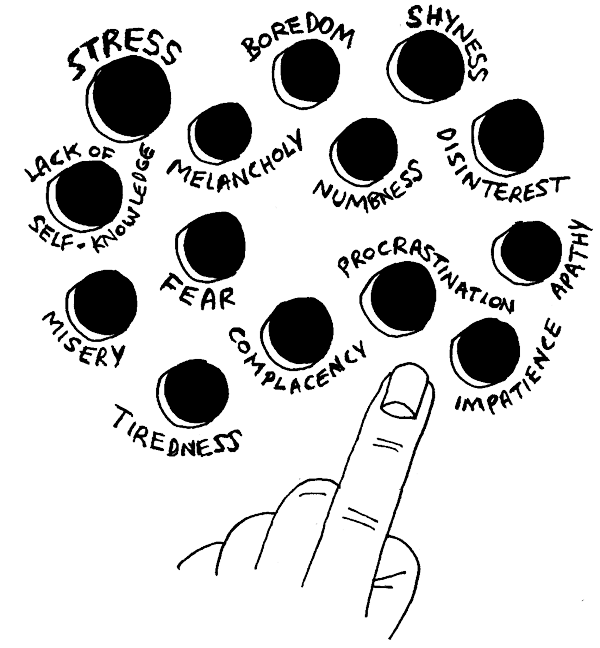
From this angle, the story of drugs already looks a little different. Indeed, this Consciousness Remote Control looks less like a snazzy tool-kit for all kinds of positively-tweaked experiences and other casual wizardry, but more like something designed by the Massively Depressing Television Company.
Actually, looking at some of those fairly big and recurrent problems, drugs look a bit more like something else…
Medication
There’s two main ideas about drug addiction, which you can see in action watching the (conservative) journalist Peter Hitchens bicker with Chandler.
In summary: Peter thinks that addiction is a choice, and a not very good choice, and a not very good choice that the government should protect us from with its friendly police-type people. Chandler thinks it is not a choice, at all, but a medical condition, and as such the government should protect us from it with its friendly doctor-type people.
The debate is politically charged, for two reasons: Firstly, the Addiction-as-Not-a-Very-Good-Choice model fits more with ideologies on the right of the political spectrum, with its emphasis on personal freedom, and therefore personal responsibility, and less with the left, with its emphasis on trying to design into society systems that account for the world’s inherent unfairness, and, therefore, collective responsibility for its problems, ‘addiction’ being one of them. Secondly, if the Addiction-as-Disease model is right, that’s a bit awkward, given the rather embarrassing little fact that for a hundred years we’ve been shepherding hundreds of millions of people into prison to punish them for being so unhelpfully unfortunate. Oh.
On top of that, not only could people like Peter Hitchens no longer feel quite as delighted with themselves for being Very-Good-Choice People, but suddenly The War on Drugs would seem a lot more like an expensive global witch-hunt for the mentally ill. This would be, to say the least, embarrassing. Meanwhile, we’ve made drugs (which people wanted/needed) harder to get, therefore more profitable (criminals are famed for understanding supply and demand), and our world spectacularly less pleasant (criminals are less famed for their responsible business practices.)
Well, in this instance, I’m with Chandler and friends.
Is addiction a disease? These fairly big-hitters think so:
- The American Medical Association
- The World Health Organisation
- The UK Drug Policy Reform All-Party Group
- The American Bar Association (ironic), Psychiatric Association, Hospital Association, Public Health Association, and College of Physicians
- The National Institute on Alcohol Abuse and Alcoholism and National Center on Addiction and Substance Abuse (US)
(There is still some controversy about labelling addiction as a full-on ‘disease’ alongside more obvious body malfunctions like rickets, leprosy and scurvy, which no amount of ‘will-power’ could overcome. While, in general, the definition holds in the sense that we know problematic, physical changes have occurred in an addict’s brain – changes which can be undone, but slowly – some doctors are reluctant to define personal responsibility completely out of the equation, wanting to avoid self-fulfilling ‘victim mentality,’ or transfering all responsibility away from Chandler when it hasn’t been his day, his week, his month, or even his year.)
Regarding governments’ acknowledgement of the well-prescribed medical consensus, however, I think most states are still acting like toddlers with chocolate all over their mouths. Mummy Scientist and Daddy Doctor are asking politely what’s going on, yet politicians keep claiming over and over again that the entire cake is gone because it was stolen by a dinosaur.
Just Say No
No. A hundred years of ‘Drugs are Evil‘ and ‘Just Say No!’ and Idiots have muddied our understanding of drugs, I think, to the point where we don’t understand what is happening to people who become addicted to them, so we don’t sympathise with them easily, so we don’t really want to (or know how to) help them. It seems to me that most of the world’s current drug policy is this:
1.) Addicts are shit.
2.) We don’t want addicts.
3.) Drugs create addicts, so no one should take drugs.
In other words, we’ve assumed that something inherent to the pharmacology of the chemical is hacking otherwise sensible folk that could be behaving themselves and paying taxes. By this theory, if you take heroin for a week, that chemical will set its grubby claws into your squeaky-clean brain, creating a new ‘equilibrium’ that only more drugs can maintain. Heroin has climbed into the driving seat, and now it, instead of you, is in control of the vehicle. You’re an addict now, kid. (Please proceed to prison, you naughty little drug person.)
But this idea has been so thoroughly murdered in medical, scientific and academic circles that whenever we see a journalist or politician trying to give it CPR in public, we should regard them with the same level of worry as a figure skater shouting, “The world is the shape of a pickle! The Jews did 9/11!”
It is little more than an unfriendly relic of Victorian daftness, unhelpfully enshrined in our legislature, from a generally more silly time when we had a lot less scientific understanding of the body, brain, and everything.
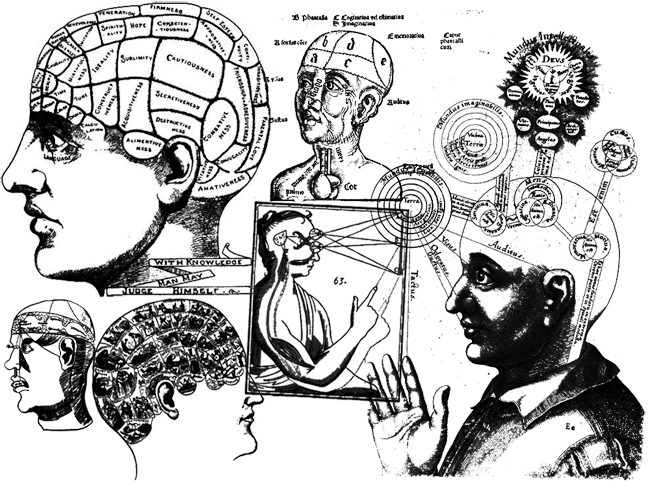
It was basically guesswork
Knowing nothing about the inside of the brain or how it works, we had to pin a wild stab-in-the-dark Theory of Addiction on weak character, moral failure, and general tomfoolery of the Pete Doherty variety.
Aw, so nice that you care. Pete’s doing better, thanks. While researching this article, I learned that he’s out and about, thanks to an Abstinence-based recovery program. Here’s a quote from the man, more famous for stumbling around near bins, looking like a schoolboy that just lost a fight with a quarry: “I suppose there’s a difference to being attracted to trinkets, rituals, and the idea of spirituality—which I think I am—and actually being engaged on a daily level with amending spirit faults when for me it’s been hard giving up everything else. There’s an element of mindfulness, which I believe is taken from the Buddhist culture. I don’t like to say it, but fuck it I will: it’s just the essence of Being really. And not getting on the train—not going with the negative thoughts.” Fine.
This fundamental confusion has led to a misdiagnosis of what society’s actual ‘problem’ is:
We’ve said: Drugs are addictive. Otherwise people are, or would be, fine. So, let’s fight the drugs (maybe even have a nice, expensive, world-wide War on Them.)
We should have said, though: People get addicted. Drugs are a thing that people that get addicted get addicted to. How do we fight addiction? Oh look it’s a massive pain in the arse project that involves reformatting a lot of society, one addict at a time. Annoying.
Just as an addict’s first step to recovery is to admit they have a problem, so too can society only recover when it looks in the mirror, and recognises the unpleasant things it has done to itself.
Life’s Lottery
We do not have to visit a madhouse to find disordered minds; our planet is the mental institution of the universe.― Johann Wolfgang von Goethe
Addiction is easiest to understand when you realise that every person has some problems, some neuroses, and some damage, lightly-hidden behind their eyes. We are all a bit broken, bless us. We just can’t easily see the health issues in each other’s heads.
Indeed, it seems basically impossible, or exceedingly rare, for someone to be thrown into the world, swim through a family, a school, a culture, and a puberty of infinite possibility for cruelty, then emerge as an adult totally dry on the other side. Nuh-uh. The odds are stacked extraordinarily against any of us coming out of something as insane as a childhood as a fully, totally ‘normal’ human being, completely well-adjusted in every respect to a very weird world (if such a thing were even possible.) Instead, we develop our odd little human problems, bundled up into a semi-functional personality.
However, let’s face it, we definitely don’t all get an equal share of the potential damage that’s getting doled out. Parenting is a game that has novices, rookies, pros, and people who probably shouldn’t even be allowed to play. Let’s briefly imagine a spectrum, with Joseph Fritzl and his wife-daughter-combo on one end, and Brad Pitt and Angelina Jolie on the other. You were born to parents somewhere on that parenting continuum. No one gets to choose their parents, their bodies, their gender, their sexuality, their DNA. It’s all the luck of the draw, life’s most significant and indifferent lottery, and we all only get the one hand we’ve been dealt.

Welcome to Earth, kid. Good luck.
It shouldn’t be surprising, then, that a quick glance at the wider world reveals that some people are really hogging more than their faire share of society’s problems. Addiction is easiest to understand when you make the simple connection that drugs just happen to be an instant, reliable, but temporary, answer to many of them.
If you’ve escaped with relatively ‘lesser’ problems – let’s say, you only feel 92.6% as funny as your funniest possible self until you’ve had two pints of beer – then the level of risk you’ll face in relation to alcoholism is massively lower than someone who was abused as a child, grew up with rubbish parents, or is regularly brain-bothered by some other brand of trauma, who finds (perhaps unknowingly) that alcohol offers some relief from the every day problems inherent to being sober. If alcohol is the same solution to both problems, it’s easy to see in which scenario it has a much more urgent purpose as a psychological crutch. If the baseline problem is always simmering in the background or reoccurring regularly, the allure of the Remote Control will be strong.
If we imagined these two problems as purely medical problems – like the commonly-held medical classification suggests we could – we notice immediately that one of these hypothetical patients needs their medication more than the other. ‘Psychological pain,’ while it might sound like the kind of thing you could simple shout ‘man up!’ at as you drive past it in a van, is no trivial matter. Some fMRI research suggests that brains might well be registering ’emotional pain’ in similar ways and regions as ‘physical pain’ [1]. This shouldn’t actually surprise us: the need ‘to belong,’ for example, has the exact same evolutionary imperatives as the Darwinian drives for food, sex, and shelter. In-group tribal cohesion meant, for an evolutionary amount of time, survival. It makes sense, then, that a failure to meet this ‘need’ could make our bodies ‘feel’ as physically uncomfortable as hunger does. Rejection, loneliness, social ostracism, or lack of meaningful connection to ‘our tribe’ hurt. We are ‘hungry’ for ‘a reward’ that a hundred million years of natural selection have hard-coded us to be hungry for.
The alcoholic is suffering, and some clumsy brand of cheap relief is available to him or her at every tavern in town.
From a medical point of view, drugs, alcohol and any other escapist compulsions generally remain pretty un-ideal forms of self-help for psychological problems, since they are treating symptoms, not preventing them. To psychologists, they’re numbing the pain of the toothache, but ignoring the rotten tooth. Our alcoholic treats the pain, but then the anaesthetic wears off, to be replaced by a hangover. As the same-old problems come back, so must the solution – the alcoholic re-doses. Click, click, click. The actual character of their sober life is the problem they are trying to solve — and so the alcohol will remain a necessary crutch unless/until that life somehow improves. If our hapless self-medicating drunk accidentally stumbled in to a therapist’s office or a healthy relationship or a more rewarding job or a yoga class or a dojo instead of the pub, pub, pub, it’s not hard to imagine that some competing desires might start – at last – to win out.
In the meantime, though, for the lowly price of five bucks a hit, one can fix him or herself for the night.
I have a friend who gets really strong period pains, which she’d be delighted to know I’m writing about on the internet. Once a month, she faces the following choice, which she has and might well face for a total of 30 boring menstrual woman years: she either loses 3-5 days per month – workdays, weekends, her period doesn’t bloody care – to mood-destroying, leg-bothering and generally day-ruining crampy bullshit; or, alternatively, she can find the strongest dose of a drug (Ibuprofen) that she can legally get her hands on, push that button like she’s popping Tic-Tacs, and get on with the good life without her daft womb deciding now must be horrible lonely sofa week.
Now, imagine I, as either a person with a more reasonable womb or a non-womb-owning member of the same species, told her this: “You take drugs too much! You’re just masking the pain! You should listen to your body. Don’t cover it up; go through it, feel all of it, it’s trying to tell you something for a reason, man. Don’t you know that Ibuprofen is bad for your kidneys?”
“Um, shut up,” I think, would be a perfectly reasonable response.
I share with you my friend’s period drama (ho ho ho), only because I think in her situation those shitty days are absolutely unnecessary. They are pointless, meaningless, and, in a modern world where God is Dead but 800mg Ibuprofen mega-tablets are alive and kicking, avoidable suffering (you might argue that their ‘purpose’ is to prepare her body for childbirth, you contrarian you, but this level of pain can’t be necessary, otherwise all women would suffer similarly. My friend’s body, in particular, is not a team-player.) The kidney argument might be valid, but it certainly looks like a proportionate risk/reward trade-off, given the overriding pain-in-the-thighs bullshit she would otherwise have to endure because of some random, annoying, unfairly inherited expression of her particular biology.
If you can understand why someone would Press the Pain-killer Button to alleviate the Period Pain Problem (or any other recurring physical ailment), then why not also for the emotional pain of the brain? This is the more compassionate view of drugs we could foster: sure, it’s better not to need medicine… but if someone does need it, who are we to take it from them?

Part II: How Not to Become a Drug Addict >>
YAY?Consciousness: Your Personal Customisable Universe of One
Here are some words which have caused us an unending amount of trouble since we got cocky enough as an upright animal to try and add our cute little human meaning-labels to them:
Consciousness Existence God
Nothing The Big Bang Infinity
Subjectivity Objectivity Reality
To try and explain any of them seriously or coherently is to risk sounding like a maniac, especially in scientific terms, and even the most intense theological or philosophical writings about these clumsy words often straddle a fine line between things that sound true to things that sound so vague as to be almost meaningless. To one person, three words like “God is Everything” sound like the spiritual key to the cosmos. To another person, perhaps sitting too close to the first person on a night-bus, “God is Everything” is the kind of simple gibberish that inspires an urgent change of seats, just in case it’s followed by a touchy-feely invitation to “the magic love forest of Gaia” or an ominous-sounding shed.
For the best/worst example, look no further than Martin Heidegger, the man who one day decided to uproot 2,000 years of philosophy by noting that all of it, every single word of it since Plato, “has attended to all the beings that can be found in the world (including the world itself), but has forgotten to ask what Being itself is” (1). This pain-in-the-arse idea he called Dasein (‘There-Being’.) Here is a dense and boring quote from a summary of the 20th Century philosopher for a lovely example of how trying to say ‘true things’ about ‘profound things’ quickly produces sentences that could just as easily appear upside-down on the walls of an insane asylum in crayon:
Heidegger turns our focus away from the philosopher’s fixation on the thinking ego, towards the consciousness of Being. His attention is on what is not thought, on what is forgotten by Dasein in its thereness as a human entity. He wishes us to resight ourselves on the situation itself of being-there, as we are, at a loss in the obliviousness of everyday life. Only then can we recognise our deep fall into the inauthenticity of one-sided technological development. The risk of falling into inauthenticity occurs when the particular Dasein, which is the public ‘they’, or as Heidegger puts it, to the everyday self of Dasein, which is the public they-self.– Richard Appignanesi, ‘What Do Existentialists Believe?’
Ahem. OK. Taxi!
Remember, too, that that is from a summary of Heidegger. Dealing with the actual 438-page work Sein und Zeit (‘Being and Time’) is like trying to swim through a soup made of wood with your eyes. Delve into it if you don’t mind gambling with your sanity, and see for yourself whether you can differentiate between sentences of profound, ultimate truth, and sentences that you might otherwise expect to hear from a bearded, mad-eyed man emerging from a bin.
Well, what people like Heidegger – and every other relevant philosopher, theologian, guru, priest, spiritualist, and 4am drug-addled loony in a drum circle – are essentially going to such great, murky depths to interrogate is this: there’s an uncanny thing to notice about your/our situation in the world, that is so incredibly, incredibly, incredibly, incredibly, incredibly, incredibly weird, that perhaps the only bigger miracle than it is how you (and I and everyone) get anything done in its presence:
It’s that you/we are conscious.
If you thought ‘duh, of course I am, God did it, so what, shut up’, then there’s a good chance this article is not going to be for you. That’s ok, and I hope you have a lovely time wherever you end up next (I suggest here.) If you thought, however, something more like ‘I know, man! It’s soooo trippy! What the fuck is going on?!!?!?’, I like you. You stick with me for the next lump of your confused, enthusiastic little life, and we’ll go on a little journey into the deep heart of nothing and everything. Strap in.
I. CONSCIOUSNESS
So. Everything you hear and see and think and feel and recognise and remember occurs in the non-spatial, non-material, boundary-less theatre of your consciousness. Obviously. It is the base ‘fact’ at the root of your experience of everything; the canvas upon which your world, the world around you, is painted. Everything ‘out there’ exists – it seems – on the precondition of your being conscious to experience it. When you are not conscious – in the year 1416, for example, or when you are taking a nap/deceased – you have literally nothing to report back about reality. There is not even a reporter that could be doing the reporting.
You exist now, and, unlike basically everything else that exists, you are also aware of this existence. In a universe of atoms and quarks and photons and rock and gas and dust and brains and potatoes – ‘you’ – whatever that is – are a subjective experiencer of apparently physical, apparently material phenomena; weirdly, obviously, made up of all the same stuff that a universe might contain, yet able to ask that universe what a universe is.
You do all this in the inner abstract world you know yourself to have, the one that is currently being fed by the inputs of your bodily senses. It’s a kind of formless ‘awareness,’ locked on to a heavy reality trip, yet simultaneously capable of the limitless abstractions of thoughts, ideas, and conceptualising as yet ‘non-existent’ things, like sophisticated new jokes about your colour-blind friends.
You are always experiencing everything in this entirely private realm of your own consciousness; incommunicable and totally unprovable to any one else, just as theirs are to you. Furthermore, this consciousness generates your feeling that you are a self – whatever that is – an outwards-facing, identity-shaped lens upon the universe, staring out at it, and/or sucking it back into the space behind your eyes, where you – whatever that is – er, is.
This is all weird.
However, upon further inspection, it even seems a bit controversial to say that you HAVE a consciousness – the way you might have knees, a spatula, or an expensive coastal property you’ve hornswoggled from a dementia-ridden spinster – you, instead, kind of, ARE a consciousness. Point at your face. What are you pointing at? There’s no-thing there, where ‘you’ are supposed to be. Try it. Please. Now.

The no-thing
The philosopher D. E. Harding gave a nice, funny instruction to noticing this predominant feature of consciousness in his book, On Not Having a Head:
The best day of my life – my rebirthday, so to speak – was when I found I had no head. This is not a literary gambit, a witticism designed to arouse interest at any cost. I mean it in all seriousness: I have no head. It was about eighteen years ago, when I was thirty-three, that I made the discovery … To look was enough. And what I found was khaki trouser legs terminating downwards in a pair of brown shoes, khaki sleeves terminating sideways in a pair of pink hands, and a khaki shirtfront terminating upwards in – absolutely nothing whatever! Certainly not in a head … It took me no time at all to notice this nothing, this hole where a head should have been, was no ordinary vacancy, no mere nothing. On the contrary, it was a nothing that found room for everything—room for grass, trees, shadowy distant hills, and far beyond them snow-peaks like a row of angular clouds riding the blue sky. I had lost a head and gained a world … Somehow or other I had vaguely thought of myself as inhabiting this house which is my body, and looking out through its two round windows at the world. Now I find it isn’t really like that at all. As I gaze into the distance, what is there at this moment to tell me how many eyes I have here – two, or three, or hundreds, or none? In fact, only one window appears on this side of my façade, and that is wide open and frameless, with nobody looking out of it. It is always the other fellow who has eyes and a face to frame them; never this one.
It’s a profound thing to notice, yet it is ever there to notice.
To be something; and to know it; and to experience things as an open lens upon existence – is freaky beyond mere words. Indeed, in the 1989 Macmillan Dictionary of Psychology, a book which sounds like not the absolute worst place to go to if you wanted to understand a word relating to the mind, Stuart Sutherland said this of ‘consciousness’:
The term is impossible to define except in terms that are unintelligible without a grasp of what consciousness means […] It is impossible to specify what it is, what it does, or why it has evolved. Nothing worth reading has been written on it.
Oh, ok.
Essentially, according to Mr Sutherland, we should all be wide-eyed, gob-smacked, flabbergasted, freaked-out, awe-struck, dumb-founded, stupefied, spell-bound, and unendingly astonished in a perpetual hypnotic tsunami of speechless wonder at this thing; this experience; this verb that we are called being… except then we probably wouldn’t get anything done. And things need to get done, otherwise we wouldn’t have any cheese.
So, what do we do instead, when faced with the infinite, unparalleled mindfuck of our situation?
II. THINKING
Well, we think.
We think, it turns out, quite a lot. We’re chatting, joking, busy, lost in thought, learning something, absorbed in a book, a movie, The News, an activity, a game, work, we’re remembering, misremembering, reliving past arguments, rehearsing future ones, fantasising, fictionalising, talking to ourselves, others, pets, postmen, thinking about ageing, memories, goals, grocery lists, evening plans, about our mistakes, about dinner, about ISIS. We mostly – and seemingly automatically – let our consciousness wander throughout the day in all kinds of weird and wonderful directions, everywhere and anywhere, it seems, except inwards, at itself.
This, it turns out, is not ideal. Yet it is simultaneously not that easy to stop.
Now, I used to be very suspicious of the word ‘meditation,’ because it sounded an awful lot to my dumb, young ears like sitting alone and being quiet, two proposed experiences that a lifetime of running around yapping made me distrust immensely. The word ‘meditation,’ in my stupid-head-dictionary, conjured up thoughts far, far away from ‘normal, ordinary people like me,’ yet much closer to ‘new age nonsense hippy-dippy beard homoeopath guru weird bald monk burn-themselves people over there.’ To me, it’s four innocent syllables swam in a prejudice soup of unscientific, religious, “spiritual,” and, most importantly, boring-sounding ideas, that had no sort of relevance to a modern man of beer and science like myself.

“‘Meditation,’ you say? Hm. I’ll pass, thanks.”
Then I read some stuff about it, and, to my surprise, it turns out that ‘meditation’ is basically a synonym for ‘occasionally listening to the mental, incessant jabbering going on inside your mad fucking head.’
Which is fine, isn’t it?
So, cross your legs, get comfortable, close your eyes, whisper loving thoughts to the crystals on your Shamanic dream-catcher, and listen, just for a minute, to the mental, incessant jabbering going on inside your mad fucking head. Try first, for even ten seconds, not to think, and pay close attention to what happens. Here’s a space to help:


Did you do it? Of course not. Well, if you had, what you would have instantly noticed is that the circus is permanently in town, they’ve raided the liquor cabinet, and are now holding your mind-voice hostage. In other words, ‘not thinking’ is freakishly, frighteningly not possible. You can’t turn the damned internal voice off, so intent is it on it’s own selfish agenda of non-stop nonsense. Blah blah blah, it goes, all day long, like the Kanye West of your own head.
Meditation, at its humblest, is simply a way to notice, however temporarily, that there is a weird, distracting, and hypnotic automaticity to the thoughts overlaid on our conscious experience of the world. Here’s another space, for you to notice the next word which pops into your head. It can be anything. OK, any word, go!


What did you think of? I bet it was weird, you freak. Could you possibly explain why it was that word – not any other possible word – that came up? Did it, in fact, feel more like you were the receiver of that word; the satellite dish that caught its signal, rather than the workshop in which some rational actor inside you carved it? Presumably it somehow bubbled up from the froffing, formless, infinitely unknowable, inaccessible, neuro-chemical purgatory of your subconscious, yet we might as well say it was beamed in by space fairies, downloaded from the god-mind, remembered through a past life echo, or telepathically inserted by the Flying Spaghetti Monster on the other side of Saturn, for all the evidence that your conscious mind can muster that your subconscious is a thing that exists. Its harder still to pinpoint how you chose it. Whatever the answer, it’s useful to notice this spooky lack of authorship we seem to have over the content bumbling, staggering and meandering through the most personal and private realm of our minds.
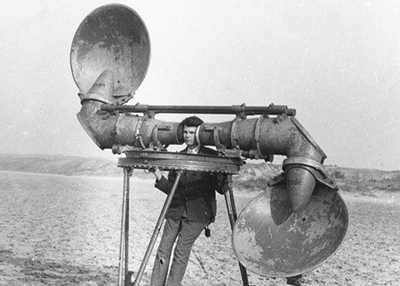
“I’ll think of something.”
On top of that, there are our feelings – those wordless thoughts that we feel in our bodies (literally, our veins pulse, stomachs churn, cheeks blush, throats throb, fists clench, eyes leak, etc.). If you’re on auto-pilot day-dream mode, your emotions can be pretty effectively overridden and puppeteered by whatever the great frothing, stress-catering chaos of existence is going to throw at you next. Your mood could be great, then the universe drops a tree on your legs. Ow. You could be feeling awful about your ruined knees, then a lemur jumps into your pocket. What a world. You can wake up on “the right” or “the wrong side of the bed,” or have a sudden, total mood switch instantly triggered by an abstract thought or memory that pop up from nowhere. Feelings happen to us. They often seem to roll in and out of our conscious landscape, colouring the experiences we have like weather. This is a nice and healthy way to imagine them, I think, especially should you need to find some sunny solace in the darkest peaks of winter. Sometimes, feelings simply come and go – patches of cloud and ‘shine – and we need only wait for them to pass.
In other words, then, we don’t seem to be a conductor, directing an orchestra of sensible information and logical instructions to ourselves. We are more like infants, left alone for the day in front of a YouTube playlist for the search term ‘Japan.’
What’s more, this is happening all day.
Indeed, we’re thinking so much, about so much, that we’re basically day-dreaming every moment that we are awake. We are accidentally, unconsciously ignoring the sum worth of The Freakiness, fretting instead on its hundred thousand annoying little mundane components (bills, work, gossip, etc.)
And what are we thinking, exactly? Or, if really want to get into it, why are we thinking at all? Is it really so normal? That sounds kind of weird, but definitely no weirder than it is. When I think, “I want cheese”, who is the intended audience of this information? Well —me— right? But, surely I already know I want cheese, otherwise I wouldn’t think it… right? Or am I the intended audience of this thought? Am I somehow the one being told; the one learning “I want cheese”; the radio receiving the cheesy signal? If so, then, who or what or which process is authoring this thought?
There seems to be an ongoing conversation in our heads, if that’s where we are, yet there’s surely no one in our heads but ourselves to have that conversation with.
III. THOUGHTS
There’s a good, or at least convincing, theory on why we’re talking to ourselves all day, inside our own heads, engaged in a behaviour that would seem outwardly insane if it could be broadcast on loud speakers from our ears to a cafe full of people impressively drinking espressos.
But first, it’s helpful to note that we probably wouldn’t be monologuing to no-one like the mad old Shakespeare of our own minds, if we had not been born in our current, talky-talky modern human context, but instead in the middle of a jungle, estranged from civilisation, raised by a tribe of friendly, mischievous baboons. It should be obvious that in our alternative naughty baboon lives, we would be free of all language-based thought, and our inner worlds would not – could not – be governed by ceaseless linguistic self-chattering, but, perhaps, more by nature’s noise, the leafy sounds of the jungle around us, primal, mystic fears of faceless, shapeless unknowns, and other general baboonery.
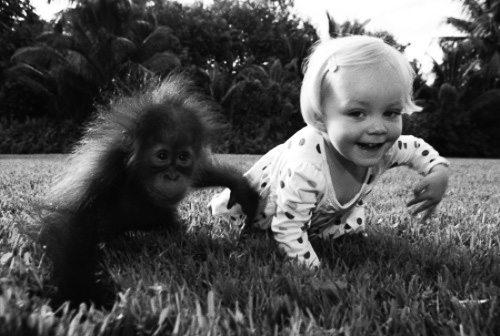
Thoughts?
The human civilisation context, however, is uniquely different.
When we are babies, we possess – presumably – some level of consciousness. By which I mean, there is presumably something it is like to be a baby. But conscious is probably just about all we are, so far – indeed, it might just be the purest form of consciousness in some ways, since it is yet untouched, unhurried and undivided by anything so troublesome as an idea, concept, symbol, or bias. No words exist, so no definitions exist to separate anything from anything else. But this state of primordial, pooing-ourselves awareness doesn’t last long, because all the live-long day our parents our blabbering at us; grandparents, too, are making funny, lip-slappy face-noises in our direction; friends, family, strangers, postmen, televisions, radios, all waffling nonsensically in our direction, like mysterious mouth-instruments. We’re encased in an aura of near constant human noise.
Then, after a while, we start to notice patterns in the noise. That meaningless sound –mum– keeps coming up, whenever the creature with boobies that we like so much arrives. Then the meaningless noise –dad– pops up with enough frequency for us to notice that it seems to signal the other one, Mr Useless Bloody No Boobs over there. Before long at all, we’re the fertile soil for a growing vocabulary and grammar, echoing these new sounds back to the world, trying to participate in some mad, desperate attempt to help it understand that we’ve pooed ourselves, or want boobies, or need sleep, or would immediately like for the Red Fire Truck Toy to be in our mouths, please. We want things. We need things. We pick up language, as we would pick up a tool.
All this experimentation, trial and error and copying soon leads us into the world of The Talking; and it’s not long before we’re practising this particularly human brand of communication all day long and everywhere. We become the toddlers, then the young children, wandering around the playground, muttering out loud, monologuing to the world each and every thought that pops in to our heads. Every thought is a word, said out loud, for all to hear. We sound like midget maniacs, but everyone think it’s cute, so we carry on.
big doggy blicenah uhm-na me cup mama go bye-bye he shwahwoooo where doggy where doggy gone? croosh mama doggy bye-bye to the everyday self of Dasein, which is the public they-self.
– Martin Heidegger, age two and a half
Then this out-loud monologuing becomes, well, not so cute. We get older, and older still, and suddenly become increasingly aware that not everyone is just saying everything that they think of immediately, like we are. Adults don’t. Bigger kids don’t either. Our older siblings have stopped. Then our friends – our peer group – stop, one by one, going out like dying stars in a night-sky when something creepy is happening in outer space. The exterior world – and our increasing awareness that we are not free, lone agents, but woven deep into a social fabric that can painfully ostracise us, judge us, tease us, and be mean to us – doesn’t stop our fun, new form of expression entirely, but cautiously pushes our monologuing inwards, to the only place left where it is socially safe from the dangers of the tribe: our consciousness.
The voices of mum and dad, which became our broadcast-out-loud playground voices, become the voices in our heads… where they will stay forevermore, bickering and dictating the moment-by-moment account of our lives, memories and imagination on our own private radio station, Head FM.
And what’s more – we forget this process happened. The day-dream begins.
We can no longer see the voice in our head as a detached and different entity, as it once was, falling from the mouths of others. No, now we identify with it. Suddenly, the voices in our heads stop being just those –voices–in–our–heads – coming in and out, automatically. Instead, they become us. It becomes me. The innocent thought rolls in, “I want cheese,” and suddenly that baby – that free, agenda-less baby absorbing its environment as a pure, unified field of conscious experience – is a cheese-chasing self, deciding itself for the first time as separate to everything else. The baby’s identification with the voice has, clumsily, inadvertently, spawned an ego. Oh dear.
Those that fail in this process – who don’t internalise the voices – become the unsettling people of our world; the muttering, monologuing madfolk we see “talking to themselves” – just as we are – except they’re not following the Unwritten Rules of the Civilisation. They’re Talking to Themselves wrong. We’re doing it right, though, aren’t we? “Yes,” say our egos, those strange and delicate creatures in charge of all of us and everything. “We’re doing it inside our heads, just like we’re supposed to,” we whisper to ourselves.
IV. THE THEATRE
So there is consciousness – the theatre – and thoughts and feelings – the actors and the orchestra – which play out upon its stage. And there is the full, immersive experience of reality, which you can most easily notice when you try to locate your head, and fail.
And this nothing where your head should be is, well, as the man on the night-bus would say, everything. It’s where the magic happens.
When we close our eyes and put our fingers in our ears, and shut up, it is easy to notice that, behind the input of our sight, behind the input of our hearing, behind the inputs of all our other senses, there is something left. Or, to put it another way: even if you applied a blind-fold, two ear-plugs, local anaesthetic to your whole body, and then floated in an isolation tank until you were not aware of the weight, position or even the sense of having a body, there would not be nothing. Obviously. ‘You’ won’t be gone. Nullify all of your senses, and you won’t nullify the presence of which they are the probing tentacles, groping the external world around you, like the many hands of a reality pervert. Feel free to take a few minutes if you want to confirm this for yourself.
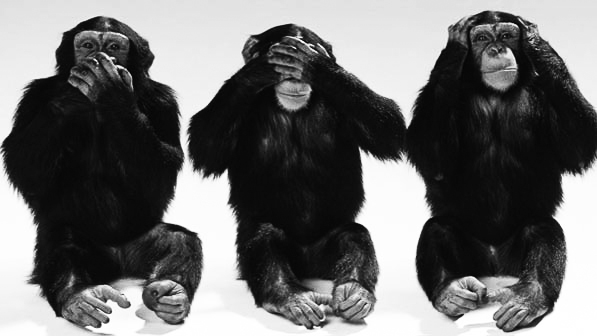
Doo be doo be doo.
Did you? Of course not, you naughty reader.
What this something is, though, remains fundamentally mysterious, and it’s weird that something so fundamental is so mysterious, because, at the same time, this something has the equally weird quality of feeling – subjectively, and with typical human arrogance – like it is the centre of everything – the point at which all things in existence seem to simultaneously begin and end: you.
When we close our eyes, it is easier to be aware that this something, is, kind of, sort of, a bit, well, like a space, and we can further notice too that it doesn’t seem to have any limits, or boundaries, or corners, or edges, or anything that something inside a head – if that’s where it is – should have. And this too is capital letter Weird. Isn’t our head 20cm by 18cm by 13cm, with a 56cm circumference? Wikipedia says so. Isn’t it bone, and gristle, and skin, and brain, and blood, and hair, and a cute, boyish face? My creepy doctor says so.
So, what right does this meat bloody football on my meat bloody neck have containing an infinite bloody space?
![[10] Guy](http://www.hencewise.com/wordpress/wp-content/uploads/10guy_2.png)
(Not to scale.)
Generally, Russell Brand sounds most like a person you shouldn’t listen to when he’s talking about “god,” but if you ever probe into what he means by “god,” and I did, you don’t actually get a presumptuous and all too familiar account of an exterior rumoured (male) sky personality – the character ‘God’ whose name people shout before they blow themselves up in crowds – but simply this:
What [religions] are trying to do is make sense of our perspective as awake, conscious, sentient beings within the infinite. For me, as a person who believes in god, my understanding of god is this: My consciousness emanates from a perspective, and it passes through endless filters – the subjective filters of the senses – and of my own biography (“this is good, this is bad, this is wrong, I want this, I don’t want that”) – but behind all of that is an awake-ness; an awareness that sees it all […] None of us can know if there is a god, but we can know there is an us.
In other words, he’s not – as it might first seem – endorsing a judging, watching, needy and suspiciously human-like deity that certain things must be done to appease, but what instead amounts to a different, more Eastern, notion of consciousness (god is not ‘out there‘, but ‘in here‘.) At best, Brand’s philosophy is a nice, innocent means of connecting with the profoundness of existence, and, at worst, little more than a fluffy logic circle, that could instead read: “None of us can know there is a god. We can know there is an us. My consciousness emanates from a perspective. I’ve just decided to call this consciousness “god,” to confuse everyone.”
In other words, Rene Descartes’ (who is not a woman at all, it turns out) famous, 400-year-old one-liner, ‘I think, therefore I am.’
We can see, anyway, that some people are using the words consciousness and god, almost interchangeably. Indeed, in light of admitting what we don’t know, all of the tricky words at the beginning of this article start to seem like nothing more than synonyms for consciousness: It’s where reality is happening; It is the something made of nothing; It is the subjective, in which the objective occurs; the no-thing in which all things appear; Having it is existence; Not having it is non-existence (or, as the cool kids sometimes call it, death); If the Big Bang was a tree falling in the woods of infinity, we beings of higher consciousness are the witnesses in the dark cold silent emptiness that know it made a sound.
As Carl Sagan – astronomer, cosmologist, astrophysicist, astrobiologist, and stoner – once said, presumably in an alarming whisper to a fellow passenger at 3am:
We are a way for the cosmos to know itself.
V. THE HARD PROBLEM
It’s easy to see – when confronted with the full Weirdness of what’s going on – that almost everyone on earth, especially every particularly religious maniac, is grappling with, and arguing over, a different flavour of the same original controversy; and almost all viewpoints, and even ideologies, are stemming from the same source presupposition that we don’t at all understand, however much some philosophers, theologians, gurus, priests, spiritualists, and 4am drug-addled loonies in a drum circle might claim to. Or, to put it a simpler way:
If you think you know what the hell is going on, you’re probably full of shit.— Robert Anton Wilson
What’s more, science (those guys) is uncharacteristically quiet on the subject, because the Scientific Method can only probe the ‘objective’ reality that we all (seem to) share, but has no means or measurements which apply to the ‘subjective’ realm of qualia and experience. We can see blood activity in brain scans and we can ask for the subjective feedback of a human adult subject, but we can not make an experiment which sheds light on what it is like to see colours, think like your partner, or be Mel Gibson (luckily).
In other words, while science, maths, and language seem to point towards the common-sense, Occam’s razor conclusion that we are all sharing an objective world, we are all experiencing all of this objectivity, subjectively. We all live on the same planet, I hope, but we see it through 7 billion+ separate, subjective lens. This is the final veil that we can not peek behind. It is the inbuilt limit to the kind of understanding we would like to have of the world, because we can not find a better position to observe the back of our own heads, no matter how hard we pull on our ponytails.
We call this absolutely massive nightmare, rather cutely, The Hard Problem of Consciousness.
Understanding the depth of the riddle that consciousness poses is to understand much about the world, because it is the space in which religions, cults, spiritual mumbo-jumbo, looney ideologies, and other faith-based systems can operate. It is the blind spot of science, and the weakest link in all of our collective ideas about the world – because science is only a methodology for testing truth claims, which is what makes it so remarkably effective at dissecting, labelling and predicting the mechanistic, materialistic, and physical laws of our universe, yet why it can shed little of worth on the rather inconvenient fact that at the base of every experiment, theory and conclusion about our ‘objective’ reality, there is an inevitably subjective second layer, with simply no conceivable way to penetrate it from a place outside of ourselves.
This should be the source of our sympathy with non-harmful, faith-based beliefs: that all of the religious people born in Salt Lake City, Utah, or Belfast, Northern Ireland, or Dabbiq, Syria, are born with an infinite fucking hole in their sirloin steak heads, where Nothing and Everything seem less like the opposites they’re supposed to, but more like equal sides of the same ancient mystery. As the absurdist writer Alfred Jarry joked out loud, just before the passenger next to him suddenly decided to walk home three stops early:
God is the shortest distance between zero and infinity.
Now, I personally don’t consider myself spiritual or religious, but I’m certainly obsessed and confused on a day-to-day basis with the fact that I am a Consciousness – and I live my life, as much as I can or remember to, marvelling at and cherishing the mind-bendingly weird, wondrous and impermanent nature of this experience I call ‘me’. Indeed, ‘consciousness’ is just about the one thing – as a science-nerd and woo-woo-skeptic – I’m willing to happily apply the word ‘magic’ to. It’s magic to be conscious. There, Richard Dawkins, I’ve said it. Life is – or can be – a merry-go-round playground in fucking Narnia. We are not just alive, like grass – we are magic unicorn creatures, frolicking around in a literal Garden of Eden gravity-dent in space-time, witness to some amazing tangible dream of a reality where nothing and everything seem so suspiciously interrelated we have to invent words like GOD just to fill the gaps where no other words will go.
Woah.
VI. THE LENS
“Is”, “is.” “is”—the idiocy of the word haunts me. If it were abolished, human thought might begin to make sense. I don’t know what anything “is”; I only know how it seems to me at this moment.– Robert Anton Wilson
The way I like to think about consciousness is this: there is seems to be an objective world – the one we all share, and poke under microscopes – and a subjective world – the private one we tend to believe is between our ears, neck and hat. More importantly for our purposes, though, there seems to be something inbetween these two realms of thing: our selves – i.e. our thoughts, feelings, and personalities – or, in totality, our subjective perception of the objective world. It feels like we are in the middle; the overlap in a Venn diagram of reality. What we perceive, feel, think, remember, understand, believe, have faith in, even what we don’t know, is the lens through which one passes into the other; the funnel through which the universe pours into us. Here is a diagram, which contains a cheeky bit of science:
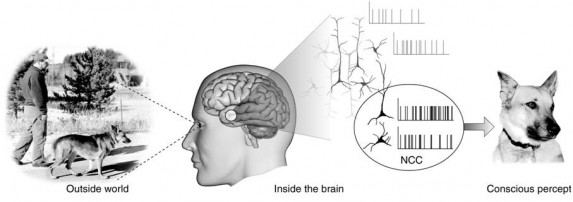
Look, in the middle… science!
And our ‘perception’ – luckily – is something that is seems to be a great deal inside our control, in the easy to comprehend ‘glass half-empty, glass half-full’ sense, (whether we have Free Will or not). This is probably the greatest blessing of the human mind: it has (or can have) power over itself. We can learn new ways to think about things; we can improve the ways we think about things; we can think better, smarter, healthier, happier, wiser, and there’s absolutely no good reason why we wouldn’t be able to. The play in the theatre might be the same, but we can watch it from a ten thousand different seats.
In other words, our experience of the universe is programmable, because – subjectively – we are all riding around in our own customisable personal universes of one. We possess then the only tool we need to hack reality, as reality appears to us. The world is a gym that our minds can get fit in. (Yuck!)
VII. HACK REALITY
The voices in our heads can be healthy, or at least healthier, and it’s plainly obvious that some people’s minds are stuck in horrible old habitual patterns, completely unexamined, broken since childhood, badly configured to process the raw data of living, blocked off to any possibilities of self-improvement, operating instead like finely-tuned instruments that have been calibrated only to annoy themselves.
If these sorts of people could be persuaded to point their attention ‘inwards’ occasionally (yuck), they could perhaps learn to recognise this, or disassociate themselves from the automaticity of their more unhelpful thoughts, and thereby create a space for themselves to have new, different, healthier reactions. This harmless little idea was the great revolution in psychiatry that birthed Cognitive Behavioural Therapy (CBT), the basic premise of which is to train practitioners to notice when a habitual thought pops up like ‘I need a drink’ or ‘I’m such a shithead,’ and then think, ‘oh, look, there’s that unhelpful thought again, right on time. Ha, silly-mind-voice that I’m not in control of.’ CBT – available on all good health services now – actually has a lot in common with mindfulness, which is probably the closest English word to the Buddhist idea of Vipassana (‘Insight’) meditation, which is probably the closest Tibetan idea to occasionally listening to the incessant jabbering going on inside your mad fucking head.
Oh, hi. At this point, having just prescribed meditation to you and everybody, I should probably confess something: I still don’t actually meditate. Sorry. However, the important thing to know here is that I used to not meditate in the same way that I used to not do homeopathy, aromatherapy, and crystal healing. Now, though, I don’t meditate in the same way that I don’t eat more vegetables, jog, or get up early, which is better.
I’m very wise.
Luckily, though, I think it’s even possible for hopeless slobs like me to steal some of the low-hanging fruits of meditation, just by understanding what it is, what’s it for, and why one might choose to do it at all. If you were at all like me, imagining meditation as little more than a relaxation technique for boring people, you might have missed roughly the whole point of it being a readily available mode of attention. You don’t have to be cross-legged, closed-eyed, humming ‘om’ in a forest, and not vaccinating your children. You are instead quite free to ‘meditate’ – i.e. notice the incessant jabbering – whilst you do all kinds of normal, unenlightened person things, like walking down the street, cooking an egg, or gawping at a smart phone as you wander into traffic.
I plan to start, the way I plan to start lots of things (please note: no guarantee I’ll start.) The method will be, I think, to start with an amount of time so low that it is impossible to fail, then adding tiny, tiny amounts of time each day, until I eventually reach a point that – without even really trying – I am no longer a hypocrite.
VIII. YOU
There is only one corner of the universe you can be certain of improving, and that’s your own self.– Aldous Huxley
If we realise that our experience of reality is all we have/are, this realisation – and more importantly, the intentional practice of noticing/utilising it – bestows us with great power over our lives. We can be responsible – to a large degree – for our own happiness, and for overcoming our own problems. Of course, some harder to mediate chemical and physical processes will always be running parallel in our hardware (endorphins, serotonin, dopamine, oxytocin, adrenaline, cortisone, etc.), but we can nevertheless do a lot for ourselves by consciously choosing to upgrade the Operating System of our ideas, thoughts and world-view with a myriad of software. Common tools for self-improvement include philosophy, drugs, meditation, therapy, nutrition, exercise, art, travel, self-help, Stoicism, cold showers, and ignoring Donald Trump until he goes away.
If our ‘happiness’ and our ‘sadness’ are taking part ‘in our heads’, if they are products of our thought processes, if they are directly interrelated with our beliefs, then it seems entirely logical and sensible to say that changing the way we perceive the world – and here comes another classic half profound/half inane soundbyte for your collection — can often be as good as changing the world.
If your brain is operating on the irrational Belief System of racism, for example, you can upgrade it, and instantly find that the same world you’ve always been in is suddenly a lot more full of friends. If your brain is operating on the irrational Belief System of unconsciously, unthinkingly plodding through life on un-choosing inertia, you can upgrade it, and instantly find that the same world you’ve always been in is suddenly a very elastic realm of near-infinite capacity for change, quite ready to accommodate and absorb any new and different life you might prefer to live in it.
You can choose not to be the victim of your own biography.
You can choose whole new characters to play in this drama.
The “rest of your life” – the only bit worth worrying about – begins, always, now.
This is the hippy dream and the New Age mantra – that the world is what we make it. Yet due to our discovery and increasing understanding of neuroplasticity (the brain’s structure is not static, but remains flexible long past childhood), and neuroscientists’ increasingly clever use of fMRI machines as a scientific tool, there’s promising evidence – although it’s early days – to support claims that healthy habits and beliefs might actually be having corresponding good physical effects on the brain itself (1 / 2 / 3). It certainly doesn’t seem naïve or controversial to believe this, or the implications of it, especially in the subjective light of inspecting our own consciousness and identifying its character as the pivot upon which our whole lives balance.

Every new fMRI machine now comes with a monk
If our thoughts and feelings have the tendency to come and go, automatically, apparently beyond our conscious control, abstractly overlaid on the cinema experience of our own personal realities, then this endless show of private words, images, emotions and concepts in our inner lives has the potential to drag us along on all kinds of bizarre and convincing agendas (ISIS), unless we’re occasionally checking up on them like a nosey parent at a locked teenager’s door. What’s more, it’s actually this unconscious mechanism of thinking–whilst–not–noticing–that–we–are–thinking that is the main barrier to ‘connecting with’ (noticing) the profound reality of the endless, flowing ‘present moment’ we find ourselves wrapped in.
It is always now. This might sound trite, but it is the truth. It’s not quite true as a matter of neurology, because our minds are built upon layers of inputs whose timing we know must be different. But it is true as a matter of conscious experience. The reality of your life is always now. And to realize this, we will see, is liberating. In fact, I think there is nothing more important to understand if you want to be happy in this world. But we spend most of our lives forgetting this truth—overlooking it, fleeing it, repudiating it. And the horror is that we succeed. We manage to avoid being happy while struggling to become happy, fulfilling one desire after the next, banishing our fears, grasping at pleasure, recoiling from pain—and thinking, interminably, about how best to keep the whole works up and running.― Sam Harris
How can we become happy – the great goal of the thinking Earthling – if we are entirely at the mercy of our thoughts and feelings, distracted at all times from perhaps the one and only great “spiritual truth” there is to be known or found in our universe: that is, the plain, old, normal, everyday, ordinary fact of finding oneself awake in a universe at all.
Well, the wiser people of our world argue mostly that we can’t. We can grasp madly at pleasure (drugs, shopping, cake), and flee madly from displeasure (feelings, exercise, death), but we cannot make progress towards any more sustainable goal, if we’re just going to be hedonistic pussies about it. If some brand of happiness, contentment or elevated self-worth is really our project in this world, and its hard to think of a better one, we cannot remain cut adrift in our lives, with our emotions dictated by the chaotic whims of a vastly unknowable exterior environment, and our thoughts frothing up from some infinite, unknowable well of internal insanity. No thanks, life.
We could instead peek into this inner realm, in which our lives are happening. We might just find the general amazingness of our lives is only lightly hidden, just past the regularly distracting normalness of them.
Further Reading:
What, you want more words? You lunatic! OK, then, but you won’t get anything done today…
The Headless Way – a website of quick, 5-second ‘experiments’ that even idiots can use to notice profound things about themselves.
Mindfulness in Plain English – a well-written, simple and refreshingly bullshit-free “how to” style book about meditation, if the idea of trying it tickles your pickle.
Waking Up: A Guide to Spirituality Without Religion by Sam Harris – a great book on the topic of consciousness/meditation by a neuroscientist, philosopher, and famously nonsense-phobic atheist.
How to be a Modern, Media-Savvy Politician
Being a politician probably used to be a bit of fun. You had money, power, responsibility, and respect.
Now though, it seems more likely that the newspapers hate you for being rich, half of your job is just apologising on TV for everything being broken before you arrived, and any teenager doing Media Studies can cancel out your entire reputation and legacy in the public imagination overnight with a cruelly observed blog that lists every photo of you where you look a bit like a butternut squash.

It’s not difficult work
However, if you still think it could still be the career for you, here’s some tips to help you navigate the well-laid minefield of the modern media.
1. Be confident!
This is not The King’s Sp-Sp-Sp-Speech any more. You can’t really go around stuttering like a dictaphone dropped in a toilet, otherwise some entrepreneurial internet anonymoid will paste you all over YouTube as a dubstep remix.
The Electorate can smell weakness from a mile away, so if you want their Votes, Taxes and Livelihoods in your hands, you must act at all times like you’ve just kicked an angry wolf’s face off before you enter every room, and are quite ready to do it again.
2. No more bloody silliness
The internet is now the permanent historical record of your entire public existence. Unfortunately for you, though, it is not your past work as a Cluster Manager for Regional Fitness in Swindon or your wonderful new policy ideas that will ‘go viral.’ You’re not going to rank highly in our Search Engine Optimised world for your sub-committee consultation’s suggestion to redraft the bill proposal amendment to the 1884 Everybody Falling Asleep Immediately What Are You Even Talking About Act.
No.
If, however, you stumble over a blind dog and knock an old lady into a novelty over-sized pie, guess who is going to the make the Internet o’clock news? That’s right. You, you big clumsy.
Every time you misspeak, or trip up a step, or push a door that says pull, or fall out of a car on to a roadside kebab, basically every single person in the country is going to YouTube their Twitters all over each other’s Facebooks, and those zeros-and-ones of gaff-data are going to be permanently stored on servers all over the Earth, and probably also in space, forever.
Indeed, you can only make about two or three embarrassing blunders before you are completely unelectable. That is until you reach 400 of them, of course, at which point you become eligible to run for the Mayor of London.

Gaff Merchant
3. Strike a Vague
If you go around telling everyone and their electorally-registered mothers that you’re going to build ten schools, that’s generally what they are going to expect, isn’t it? Silly rookie. What you need is a bit of wiggle-room. Instead of offering to build ten schools or something else unhelpfully specific, it’s smarter these days to offer ‘improved education,’ without specifying a single definition, parameter, number, direction, concept, axis, flavour, or list of stages that could be measured relative to anything in the observable universe relative to a budget or space-time.
When people ask for results, then, nobody can really complain when you wheel out some boy called Bob with bits of chicken on his face who can now spell his name with less mistakes than last week.
4. Confidently Handle an Egging
Today, democracy is no longer a hundred men who meet once a week to discuss poor people while they chase a fox on inherited land.
Instead, its a big country-wide party where anyone is allowed in as long as they’re tall enough and haven’t yet murdered someone. Unfortunately for you, this means a lot more people are now involved in governance, who are less experienced with debate/consensus, and a lot more experienced with noise/throwing.
Luckily, dealing with projectiles is a skill now taught at all good Politician Schools, at a range of expertise levels:
-
The Beginner, a.k.a. Silvio Berlusconi ‘Model Church’ Method:
-
The Intermediate, a.k.a. John Prescott ‘Egg’ Method:
-
The Advanced, a.k.a. George Bush ‘Shoe’ Method:
4. Get the joke
You’ve been invited on to some light-hearted morning chat show to be interviewed by a dead-eyed rent-a-couple, who want to talk to you about your kids, your holiday, your breakfast ritual, and your CD collection. What a great opportunity to score some voters! It’ll be like playing a game of tennis with a child in a wheelchair. “So, Mr Prime Minister, we have to know,” says the woman one, “do you think that Kate was right to wear that dress at that event?” Hm. What do most people think? Say that now. SMASH! ANOTHER ACE!
But… wait… what’s this now?!
In a sudden, unexpected twist of skewer-point journalism, the white-haired man one puts on that YouTube video of you stuttering, which some 12-year-old internet japester with autism has turned into a dubstep remix.
… It’s a trap!
They play the video on a television in front of you while a little thumbnail of your reaction is broadcast to the nation. The show’s producer is loving it. It’s light-hearted. It’s whimsical. It’s a complete fucking nightmare.
You have to laugh, though. HAHAHA.
WHOOMP WHOOMP BWOOOOAR, goes the dubstep. STUT-STUT-STUTTER, goes your dumb mouth, all over the internet, forever.
You have to laugh, though. HAHA HA HA. THAT’S VERY FUNNY, ISN’T IT.
HA HA. Ha. ha.
ha
YES, AREN’T WE ALL HAVING A NICE TIME.
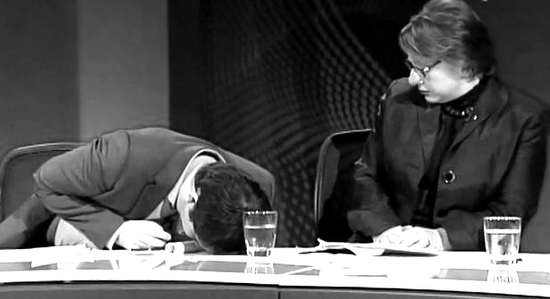
Fun
5. Like [THING] also
Once upon a time, it may have been acceptable to be so utterly boring and bookish that people trusted you to deal with laws, trade and taxes exactly because you seemed duller than them. It was even regarded as vaguely in the nation’s interests to avoid electing the ‘common man,’ you know, in favour of the kind of uncommon man who wouldn’t get immediately distracted by a novelty sandwich fight, unlike the rest of us.

The “rest of us” think you’re a bellend basically
Now, though, people want to know their politicians much more intimately, and judge them not on boring, arbitrary abilities like, ‘how well do you understand the economic concept of the Division of Labour?’ or ‘can you do the job?’ No, now electability is based on your answers to more sympathetic or relatable questions like, ‘who do you want to win series 49 of Big Brother?’ and, ‘what do you prefer? Sausages or The Arctic Monkeys?’
In other words, are you one of us?
You’re not, of course, which is why 90% of your life’s trajectory has been to rule the chumps. To prevent them figuring this out, though, don’t forget to mention that you like burgers, West Ham Aston Villa, the environment, and Insomnia by Faithless.
6. Get Advice
Also known as Spin Doctors, or Communications Directors, or Media Strategy Managers, or Opinion Fact Rearrangement Consultants, it doesn’t really matter what you call them, as long as you have someone who is so deeply networked with producers, editors and journalists that they can trade access to you for not ruining you. If a camera or microphone is ever within a meter range of your opinions, this media-savvy individual should be fifty centimetres closer, ready to whisper the sweet populist nothings in your ear, hand-hold you through the no-man’s-land of the media war, and be prepared to spring to your defence should some unflappable, underpaid nurse suddenly desire your attention, like a bodyguard leaping in front of a bullet made of proletarian rage.
Behind the scenes, this individual should spew so much rubbish from their mouths, at all times, in all journalistic directions, that every time they formulate a sentence they break the Kyoto Protocol.
7. Don’t Piss Off Beautiful Actors
Obviously, politics is about compromise. There are direct winners, direct losers, and the majority of people who don’t know who’s playing because the election doesn’t take place directly between their face and the television.
The formula for getting continually re-elected, then, is simple: the group of ‘winners’ must be numerically greater than the group of ‘losers.’ Simple. Generally, the winners are going to vote for you, the losers are not, and everybody else will choose by asking George Clooney.
Very popular people are your friends, and you agree with all of them.

Women want to see his election
8. You’re outraged, just outraged
You might avoid your taxes, you might use those tax savings to kill horses for fun, and you might insist that your favourite one-liner comedian Jimmy Carr comes around to your house to enjoy some frugal tasty horse meat burgers. We all have hobbies. However, if you then find out The Sun newspaper is suddenly, completely outraged that Jimmy Carr ate tax-free horse-meat, you better be damn well suddenly, completely, publicly outraged too.
HOW COULD HE?! THE MONSTER!
9. Go Handsome or Go Home
The days of looking like some haunted old coodge loitering around the buffet of a binman’s funeral are long over. It’s the age of the colour television, and the eyes of the masses demand more.
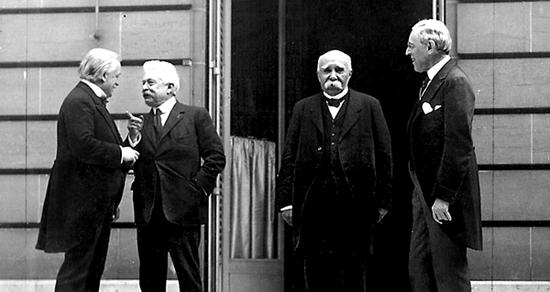
Less of this
Indeed, it’s democratically safest to be a half normal, half bland cocktail of ‘the everyman.’ Almost young, almost trim, and almost, almost relatable to ‘the everyman,’ except that everything you know about the working class seems suspiciously like it was assimilated through hiring them to clean your windows. In terms of facial personality, you should look exactly like the kind of person who would be impossible to pick out of a police line-up, unless all of the other suspects had the kind of faces you could make documentaries about.
With boring, podge-head in place, you must then master ‘Blair hands.’
This is where you spend your entire speech looking like a forgettable market stall owner who is presently indecisive about where exactly to display his favourite invisible melon.

Bland-head, melon-faffing
10. Be squeaky-clean
While it’s not like some minor drug hypocrisies will stop you getting a post like the President of the United States, political life will always be a little smoother if you can pretend you are a good, honest person.
Get your spouse to behave in public, hide your most smashed and impulsive relatives somewhere safe with a sneaky pay-check, avoid pool parties, low-priced prostitutes, poor people, and, if at all possible, try to mechanically scare big, wide smiles on to your children’s little faces whenever there is a camera within a mile of your house.
“Oh, yes, Little Timmy loves The Arctic Monkeys,” you’ll say.
“Not as much as Sausages, though, eh Timmy? HAHAHA. Eh? Eh?
HA HA Ha
ha
… haaaa that’s our Timmy, alright. He’s not damaged.”

Image sources: [Boris] [Faint] [Clooney] [Coodges] [Church face] [Egg jab] [Shoe duck]
YAY?Blomp and Whizzo the Wonder Kid
There are two versions of you.
One of them is you, now, the one who’ll go to bed tonight and set an early alarm for tomorrow in a sleepy blur of good intentions. Let’s call this version of you Blomp.
The other version of one is the potential you, later, the one who will wake up in all the magic possibilities of tomorrow, next week, or somewhere down your timeline in a golden future not yet written. He is the absolute best version of you; the one who can be spotted on job applications, first dates, and at high school reunions. He exists almost entirely as glimmering and untapped potential in some deluded hangover of today. Let’s call this version of you Whizzo the Wonder Kid.
You know these two characters well.
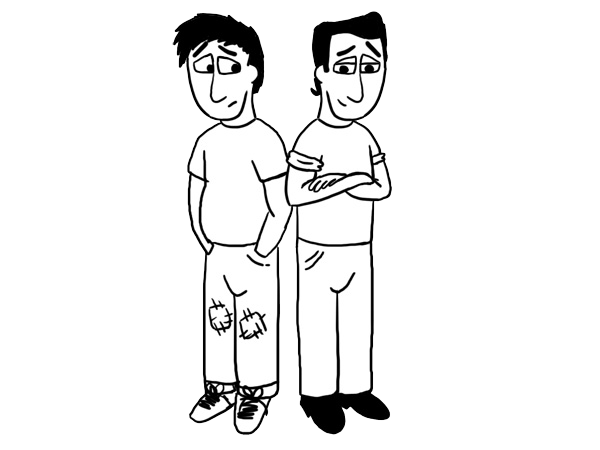
Whizzo the Wonder Kid is the guitar-playing vegetarian who goes running three times a week; Blomp, meanwhile, has bidded on a guitar on eBay, and learnt the A-chord. Well, he’s going to learn it. Soon. Just after a pre-jog nap, or a bath, or a bath-nap, or a sit down, or a pre-bath sit down nap. Actually, maybe he’ll go jogging tomorrow. Yes, tomorrow. Jogging and vegetables. Today is more like the kind of day where one should really stay in, and eat a whole cooked chicken on a stick. Fine.
While Whizzo the Wonder Kid speaks fluent Spanish, Blomp has only so far bought the language tapes, listened to half of Basic Foundation Bits To Annoy Trilingual Waiters Part One, and fallen asleep with the earphones down his pants.
Whizzo the Wonder Kid calls his mother more, replies to e-mails immediately, and asks out pretty girls on the Metro whenever, because, well, why not? Blomp, however, presses ‘Mark Unread’ on any message he can, literally, and any girl he can, metaphorically, and will continue to do so until he’s had one more coffee, or one more beer — Whizzo the Wonder Kid will sort it out anyway when the caffeine or the courage kicks in.
But here’s an idea worth considering: Whizzo the Wonder Kid is sometimes just a story in our heads, and that story, however exciting it becomes when we splash it with colour to impress people, does not have any real effect on the rest of the universe because of a simple but relatively ignored little truth:
We are only what we do.
We are, and might only ever be, Blomp, whatever shape that is today.
Blomp, Blomp, Blomp. That’s us. And maybe that’s ok.
Every time you turn off your alarm and sleep another hour, you are a person who turns of their alarm and sleeps another hour. It isn’t a bad thing, or a problem, or a habit that needs to be fixed, but it is as simple as that. Excuses are fine, but they will always be irrelevant to the results recorded in everyone’s shared reality.
“But it’s only because it was raining.”
“But it’s just because I went to bed late last night.”
“But it’s only because I plan to get up earlier tomorrow.”
OK. Great. Fine. You slept in; no biggie, but that is the only fact objective fact of the situation – now you gotta work with it. You are not the person who lives in your head, you are the things that you do. Did you turn off the alarm? OK. Did you spend two hours browsing nonsense cat websites rather than practising Spanish? OK. Did you have a kebab rather than a salad? Hey. That’s cool. I’m not your Aunt Sally, judging you because you didn’t shave before the funeral. But what are you telling yourself?
That you can get up earlier, practice Spanish more, and cut down on kebabs?
In your head, are you slightly more like Whizzo the Wonder Kid?
Where this attitude can become dangerous, I think, is when we start telling people about all the things we are going to do, when we’re not actually doing them. It is much quicker and easier, after all, to enjoy the ‘I could do that’ narrative, than the sometimes more real, objective one: ‘I have talked about doing that for a very, very long time, and told people I could do that, while never, ever doing that.’
Whizzo the Wonder Kid sometimes picks the juicy, quick rewards of congratulation for the things Blomp hasn’t done yet. He is a lazy short-cut to a quick fix of ego-boosting, and that makes him addictive. Blomp is a balloon, bloated from unearned prestige, and Whizzo the Wonder Kid is the air that escapes his rubber-slappy lips every time he creates the expectations that make it tougher for Blomp to ever do those things in the first place.
When we tell people about the impressive things we are going to do, it’s a form of self-marketing. And when it comes to ourselves, just like with any other product, our advertising can be true, or it can be false – and that might not affect people making their first purchase of our product with a quick, flashy trick, but it will affect every ‘sale’ after.
To quote ex-President George W(isdom) Bush:
Fool me once, shame on you. Fool me two times… err… um… we’re not going to get fooled again.
Indeed. For many years, I believed I could do all kinds of wonderful, incredible things IF I WANTED TO. In the silliest version of my future, I’ve written novels, plays, movies, whole albums of music on instruments I can’t even play, ran marathons, climbed mountains, swam channels, invented things, lived on boats, on islands, on cattle ranches, in large cities, small villages, up mountains, beside lakes, with a hundred different girls, and with none at all.
I used to tell myself this kind of deluded mantra: with just the right time, or money, or motivation, or incentive, or blood caffeine level, or whatever flavour of excuse tasted best that day, I could do ALL OF THE THINGS… just… not… right… now. Tomorrow looks good, though. Yes. Tomorrow will definitely be different than today was.
Except tomorrow never comes.
People do not pay, hire, befriend, or date our potential. If they did, we’d all be hot property. My Whizzo the Wonder Kid, indeed, has done more things than it is possible to do in one human lifetime, and that was starting to become a problem.
I may be ambitious, but I’m also –more realistically– a lazy sort of a sausage.
I found it incredibly helpful to realise something quite obvious: that I can’t do all of the incredibly ambitious things really. Even if my potential was somehow infinite, my time and resources are definitely not. My grandest ambitions may be somewhat honest (I really do want to have done them, after all), but I will never do most of them, because the time they take will always be in competition with a hundred other unpredictable demands and desires for my time and my internet-ruined ADHD levels of attention.
All of the most difficult, hardwork-chisselled things I’ve done in the most outrageous Whizzo the Wonder Kid version of ‘my future’, for example, are made spectacularly unlikely by my excessive and greedy fondness for lazy mornings, impractical friendships, unearned holidays, outrageous baths, accidental naps, vigorous booze sampling, and near-constant levels of incredible faffing.
In other words, the smug novel-writing, vegetarian, exercising, ultimate bilingual rock star thing-doer is a version of me that gets up earlier, works harder, writes more, gets distracted less, procrastinates less, concentrates on just one thing rather than a dappy fan of too many things, and reaps all of the rewards of that focussed streamlined future lifestyle.
In summary, then, he is the opposite of me. An entirely nonsense dream personality that doesn’t take into account every year of evidence previously provided that I am not that person. It’s a version of me I can believe is coming tomorrow, but only if I can keep religiously ignoring the fact that he was supposed to arrive yesterday.
It can be the ultimate procrastination in terms of improving yourself, because the map isn’t useful until you know where you are starting the journey.
I’m lazy sometimes, I get distracted, I makes excuses, I nap, I procrastinate, I fail. I’m not very good at quite a lot of things, but I do practice, I do try a little, and I do try to try more – and that’s how I get better. That is who I am, and I’m much happier knowing there is no imaginary gearbox is my head that I can one day magically shift up a gear.
Blomp is who I am, and he’s fine as he is. How about you?
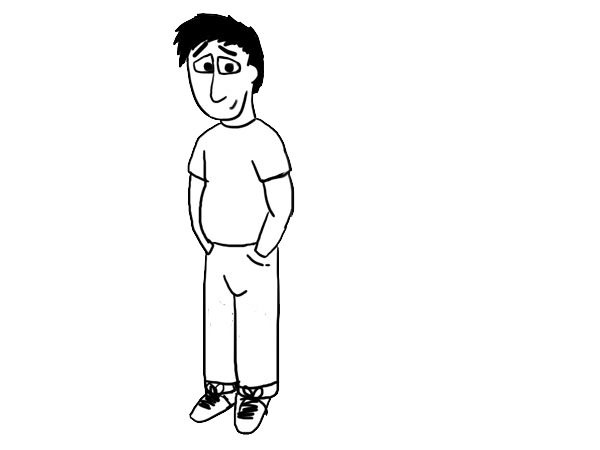 YAY?
YAY?
The Optimist’s Guide to… Embarrassment
Like a lot of people who browse the internet too much, I sometimes fall prey to a weird belief that I’m not stupid. This delusion is then further reinforced by hanging around with other people who think that they’re not stupid either. The more I browse the internet too much, and the more I hang out with other people who browse the internet too much, the greater the delusion becomes that I am not a complete moron.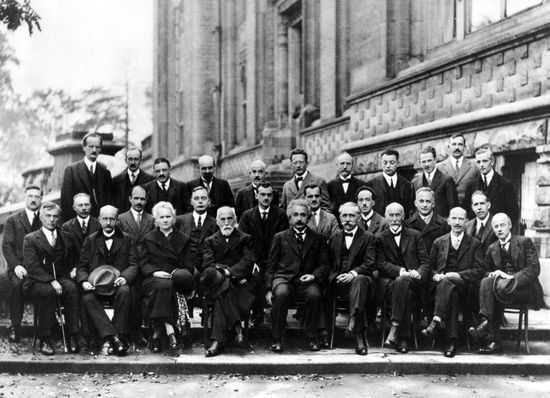
Me and my friends (from Reddit.com)
The Incident
Back when I was studying Media Nonsense at the University of Bad Decisions, I had to complete two weeks of work experience for my degree. Not wanting to really experience any work, however, I asked my cousin if I could visit him at the Post Production Studio where he did real things for TV people in exchange for currency. In the mornings, I would be a glorified runner, making tea and coffee for other TV people who did real things in exchange for currency, and the afternoons I would spend time with a different department each day.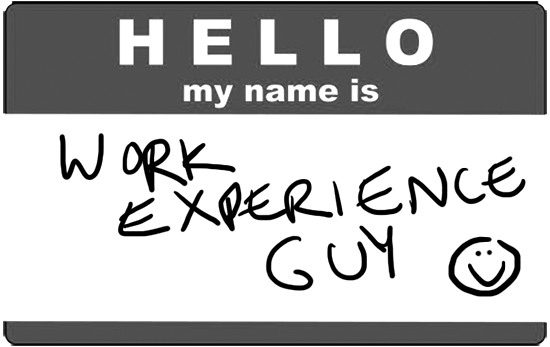 One day, I was in the Sound Room, then the Editing Suite, then the Room with Lots of Buttons that I completely understood. It was a lot of fun, and whilst I bounced between the different departments, I followed the progress of a TV show called The Complainers as various people applied their skills to it. I asked the sound people if it was any good. They told me it was shit. Then I met the editing people, and they also told me it was shit. Then I met the button-pushing people, and they told me it was shit too.
It was with my conclusion about The Complainers pre-decided with religious conviction, then, that I walked into a room the next day to bring two guys some coffee. One was busy editing, and the other stopped to chat to me.
He was an incredibly nice man. Perhaps the nicest man I’d met all week, even. He was friendly. Grounded. Sincere. He was giving off that ‘hey man, I get it, we’ve all been a runner, I respect you as a person and an artist, you’ll get there, we’re all in this together, comrade, nothing’s going to stop us now, viva la resistance’ kind of vibe, which was refreshing in a building where 95% of its inhabitants ordered coffee with a button. Hell, he even asked me about my writing ambitions, ignoring that my job was mainly the relocation of warm liquids.
In short, he was Jesus and we were going to be best friends forever.
Then it happened. Not so much a brain fart, but a rectum-shattering tornado of bowl-collapsing mind wind. I looked at the monitor behind him and saw that the editor was working on The Complainers too. If common sense hadn’t been on a coffee break too, this was probably the point it would have kicked in.
“Oh, you’re working on The Complainers?’ I said conversationally, keen to bask in the camaraderie of a shared grievance. “I’ve heard it’s really, really shit.”
His face switched instantly from a warm smile to a blank stare. The editor spun slowly and silently around on his wheely-chair, then stopped.
“I hope not,” the nice man said in an empty voice, “it’s… my show.”
There was a long, awkward silence – it lasted about a day, and was comparable in its silence to the endless nothingness of death.
One day, I was in the Sound Room, then the Editing Suite, then the Room with Lots of Buttons that I completely understood. It was a lot of fun, and whilst I bounced between the different departments, I followed the progress of a TV show called The Complainers as various people applied their skills to it. I asked the sound people if it was any good. They told me it was shit. Then I met the editing people, and they also told me it was shit. Then I met the button-pushing people, and they told me it was shit too.
It was with my conclusion about The Complainers pre-decided with religious conviction, then, that I walked into a room the next day to bring two guys some coffee. One was busy editing, and the other stopped to chat to me.
He was an incredibly nice man. Perhaps the nicest man I’d met all week, even. He was friendly. Grounded. Sincere. He was giving off that ‘hey man, I get it, we’ve all been a runner, I respect you as a person and an artist, you’ll get there, we’re all in this together, comrade, nothing’s going to stop us now, viva la resistance’ kind of vibe, which was refreshing in a building where 95% of its inhabitants ordered coffee with a button. Hell, he even asked me about my writing ambitions, ignoring that my job was mainly the relocation of warm liquids.
In short, he was Jesus and we were going to be best friends forever.
Then it happened. Not so much a brain fart, but a rectum-shattering tornado of bowl-collapsing mind wind. I looked at the monitor behind him and saw that the editor was working on The Complainers too. If common sense hadn’t been on a coffee break too, this was probably the point it would have kicked in.
“Oh, you’re working on The Complainers?’ I said conversationally, keen to bask in the camaraderie of a shared grievance. “I’ve heard it’s really, really shit.”
His face switched instantly from a warm smile to a blank stare. The editor spun slowly and silently around on his wheely-chair, then stopped.
“I hope not,” the nice man said in an empty voice, “it’s… my show.”
There was a long, awkward silence – it lasted about a day, and was comparable in its silence to the endless nothingness of death.
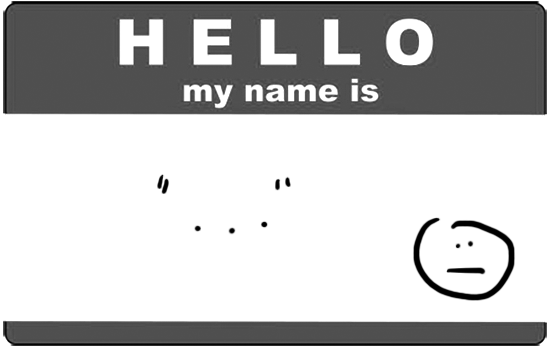
“………………………”
The Aftermath
To recap, then: I was bizarrely and suddenly rude to an incredibly polite man, by accident, by trying to suddenly and bizarrely impress him, on purpose, with an opinion that wasn’t even mine.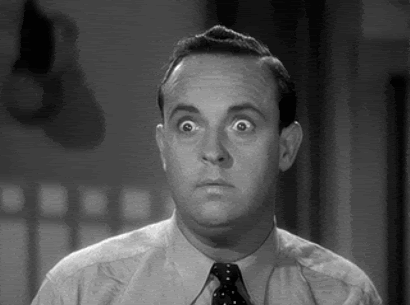
“What did I just say?”

“LOOK MUMMY ART”
Countries: A problem the Earth doesn’t need?
I was in the pub the other day when an alien called Zinfluu came in. (That wasn’t his real name, obviously, but they have different alphabets and I don’t want to overly-complicate things too early.) He seemed a bit over-enthusiastic and jelly-like at first, but he was friendly enough, so I started telling him about Earth. Suddenly he pulled out a map of Earth, and asks me what all the lines mean. He couldn’t see them on the surface of the planet, he said, when he arrived from the actual bloody sky in his actual bloody spaceship.
“Zinfluu,” I said, “those are countries.”
“Snargle-bargle funktong,” he replied, drunk.
“Countries, idiot, countries.”
He remained confused, which was probably the language barrier and the bungling new effects of Earthbooze.
“Right, Zinfluu, it’s very, very simple. Get off my arm. People are born somewhere, and the world is divided up into chunks, and that makes them a certain kind of person, like ‘English,’ or ‘Chinese’ probably, and so they have to do and think certain things growing up because they have social contracts with these abstract entities called ‘states’ based on the genetic and geographic accidents of their births, and they get given a tax number, and some ownership documents —get off my arm— then the states pay individuals called the police to enforce rules chosen by different groups of individuals called governments, and take money from everyone inside the drawn-on borders to fund it, then pay other individuals called soldiers to protect those individuals inside the drawn-on borders from other individuals outside the drawn-on borders that pay taxes to different groups of individuals in different geographic locations. Also, each one has a song. Now get off my arm, you tourist jelly shape.”
“Funkop nog blom,” he said, and I was shocked. He was right, of course. From his smashed and objective alien viewpoint, ‘countries’ were a baffling and dangerous, incoherent and inefficient idea. More importantly, though, they just weren’t real, even though quite a lot of people seemed to be constantly pretending they were.
And if anybody knew what wasn’t real, it was Zinfluu, because he was a redundant narrative device. He touched my bum in a silly way, then disappeared.
Morality
Despite photographs from space seeming to prove that Earth has just one big, basically connected, dry, green bit, the majority of people on that one big, basically connected, dry, green bit still seem to prefer the conclusion that it is actually made up of around 200-300 entirely different and separate parts called ‘countries,’ ‘territories’ and ‘colonies,’ the number of which is decided internationally and unanimously by the last person to edit Wikipedia.
This mode of thinking — statism — if we want to slap a name sticker on its old, wrinkled face, has some immediately obvious and bizarre effects.
Firstly, it means that human beings have switched, only in the tiny, last percentile of their total hairless existence, from a free and nomadic species of upright monkeys that generally roamed around and put stuff from trees directly into their gobs, into a curious and unprecedented animal where almost every new member that is born is immediately, slightly owned.
Despite not choosing the longitude and latitude of our mothers at the instant we emerge from their vaginas into all this bloody nonsense, we can not leave whatever involuntary territory we land on without the sanction of the government that says it’s theirs. We can not own land or property without the sanction of a government, or trade legally without the sanction of a government, and will always have a portion of our economic value taxed by a government, and will always have to abide by rules under the threat of violence or imprisonment by a government, and might even risk being killed for resisting any such violence or imprisonment by a government. In a weird way, it often feels a bit like we are farmed and controlled for our economic productivity by an institution we do not and could not choose. When we are not economically productive, we can be given welfare, and when we are not playing by the rules, we can be imprisoned. Both options are funded by taxation, anyway, so it doesn’t much matter for the governments, which are pretty unique amongst big, worldly institutions in that they do not produce value (which even religions do by babbling about a magic cake, then passing round a sparkly hat). They can only take value, then redistribute it. This is accomplished through regrettably violence-backed taxation, the manipulation of currency, and odd ideas like deficit financing, whereby national debt is created to make potential people who aren’t even alive yet pay for stuff now. The money is borrowed by today’s politicians (or today’s people, if you’re democratically inclined), in the knowledge that it wont have to be paid back until they are well out of office, we are all out of work, and an entirely new set of humans face our tax bill.

So it is that we are still born into a kind of modern, comfortable slavery, kept in place by an increasing number of abstract restrictions, growing upwards towards the hidden guns that keep us working; only just alive and already owing money (a problem made worse if you’re born in the Christian side of the soup, and have a second, spiritual debt to a friendly hapless Jew who died way back when a road, a sewer, a workplace and a kitchen were all the same thing…)
The second problem with statism is how inconsistent it is with any rational attempt at morality. While ethical issues are of course difficult to define, what should be obvious to anyone smart enough to make a sandwich without getting trapped in the washing machine is that there are no such things as ‘good’ and ‘evil,’ and the absence of these convenient but fictional absolutes means we have to give our brains, not Father Christmas or other supernatural creatures, responsibility in figuring them out. However, consistent moral principles do not apply very easily to the world of states because there is such a noticeable moral hypocrisy at its core — in that its basic mechanisms for functioning are not unlike theft, threat, debt, and violence, which we are almost universally told are wrong when other children do them in the playground — and an inconsistent web of contradictory laws on its surface — where the exact same action can be deemed moral/legal or immoral/illegal, depending only on your geographic location, and not on its intention, justification or consequences.
Our ethical priorities might always be warped when we trust the paradox that a murderer is always bad, but a soldier is always good, despite the difference only sometimes being a uniform and a paycheck; or that theft is bad, but when you call it taxation, it switches suddenly to only goodness, as if stealing stuff is not actually the problem, just as long as you share it afterwards with your favourite friends. Similarly absurd nonsense will also exist as long as different states continue to enforce ‘morality’ on their citizens, and national boundaries mean you can do incredibly silly things like start a bottle of wine as a law-abiding citizen, then walk across an imaginary line and finish it as a merry criminal, or have consensual homosexual sex too near the wrong border, and be one small act of bum fun clumsiness away from an illegal orgasm being the last one of your little gay life.
While you might argue that states, in general, exist exactly to protect you from such nastiness, it is important to remember that ‘your state’ fully controls the police, the military, the law, and the legal system, has exactly the bottomless funding that you don’t, and naturally (like any organism or organisation) wants to protect, sustain and advance itself, so will always – at a push – use those resources in whatever way it deems necessary and essential for its own survival. It wont vote for its own non-existence, even if 51% of its citizens demanded it. This is, of course, regardless of what is in your interests, or anyone else’s interests, or ‘the Planet’s’ pesky interests, and regardless of what is ‘right’ or ‘wrong.’ The late comedian George Carlin said it best: “Your ‘rights’ aren’t rights if someone can take ’em away. They’re privileges.”
Still, I guess all that is irrelevant when you live in a good country.
Patriotism
Now I know I’m waffling on about the subject of taxes a lot, and that’s about as sexy as eating pickles from your hand on a speed-date, but it is basically one of the most important riddles to unwind if you want to penetrate why this world isn’t as nice as the one John Lennon tried to achieve by heroically spending a whole day in bed with Yoko Ono.
Because when we talk about what a ‘country’ actually is, we are not talking about a group of people (a culture) or an area of land (a region), we are talking actually about the limits to which one institution can tax a group of people in an area of land before before another one takes over. Apart from making patriotism seem a less glamorous thing to celebrate (“We were born in a place where we are taxed by the same organisation! Amazing! God save the Queen!“), it also exposes a core goal that countries might just share with businesses, advertisers, cults, and the ‘business’ religions: to get your money, and keep your loyalty, by convincing you of their own virtue, particularly compared to the virtue of their competitors.

“NAZI WANT TOUCH CHOCOLATE MAN”
The difference between businesses, advertisers and (to a lesser extent) religions, however, is that they do in some way have to earn our money – to tickle it out of us – by providing something of value (religions sell us ‘salvation,’ the alleviation of guilt, etc.), whereas our governments inherently do not — they can just poke us with a gun for our money, and not let us poke back — and that is why they can afford the luxury of getting their greasy sausage-fingers all over welfare programs like public education. Then, time and time again, what ‘we’ learn in state-funded schools gravitates towards a narrative that firstly defines ‘us’ as a group with shared values and heritage (which muddies our idea of what a country really is), and then secondly, writes that fictional group’s role into a fairytale remix of history as the good guys, even if that version of real events is so untrue it could somehow ruin a horse up a tree from a mile away.
Thus in England, they train lots of new English people, and in France they train lots of new French people; they all get taller, hairier and more boring at roughly the same speed either side of a bit of water they could swim across, and suddenly find themselves adults who magically believe they’re different, and are proud of that difference.
Ignoring the obvious Darwinian spanner that all of them are some level of immigrant anyway — because humans don’t come from magic forest space eggs, silly — their patriotism represents nothing but an unearned smugness in the recent achievements of other dead souls who were born on the same lump of taxed land as they were; and worse, a silly celebration of the skewed historical baggage of ‘their people,’ which isn’t really the history of ‘their people’ at all, but the history of the rulers of ‘their people.’ Peasants never huddled around either side of the sea experimenting with elastic so they could fling themselves at each other for a nice war. No, they had to be rounded up, convinced, paid and ordered to fight by someone with a more impressive hat. That’s why patriotism is always valuable to the owners.

Before you know it, you could be this thumb with ears
I was born British, it seems, because the little book I need to leave my drunk, wet island says so, and I remember learning in school how ‘we’ beat evil, imperialist Nazi Germany in World War: Part II, but not how the same unpleasant, imperialist ‘we’ brutally occupied Ireland or India, or, well, The World before that. I only remember learning Winston Churchill’s ‘heroic’ role in defeating the axis powers on the battlefields of Europe, but not about his queasier role in the simultaneous starving of millions of people in India (“I hate [them]. They are a beastly people with a beastly religion.”) I remember learning how ‘democracy’ was supposedly wrestled in this country from the aristocracy and landed elite, but not about the bloody and brutal origins of its entirely unelected monarchy.
‘God Save the Queen’? Umm… why, exactly?
Like most children, I was only given half of the story of ‘my country,’ and, rather conveniently you might say, the half I was missing was the half I needed to evaluate it even-mindedly. Of course, you could fart yourself into the sky, and enjoy the same rose-tinted shit any where you land. In the most American parts of America, for example, their patriots trumpet democracy, liberty, freedom, The Constitution, the Founding Fathers, defeating fascism, and that American Dreamy Thing, with considerably less painted belly-wobbling over the inconvenience of native Americans existing, the wealth built upon slavery, McCarthyism, the internment of Japanese-Americans during and after the War, its napalm, its nukes, Guantanamo Bay, or just about anything the bloated bully caricature of a country does across the world now with its corporate and military might, too often in direct and almost hilarious hypocrisy with its stated ‘ideals.’
The problem is if we are teaching children stuff that’s wrong, and indeed that seems to be one of humanity’s specialist subjects, then schooling is more like a conveyor belt system for patriot-rearing than genuine, agenda-less education. We all laugh and scorn when we see the heavily indoctrinated children of fanatical groups like the Westboro Baptist Church (the ‘God Hates Fags’ lot), yet we only mock them because the things they are rigidly taught as children are so different to the things that we are rigidly taught as children. Swap the cosmic accidents of our births, and, without independent thinking, we would be on the pavement telling God who He doesn’t like, and they would be us, reading this blog, perhaps, and feeling slightly annoyed at the comparison to such dappy sign-crayoning twonks. (And if you are reading this, Jael Phelps, you’re probably the hottest girl who has ever despised everything I stand for.)
If you want to understand why there’s so much conflict between the slightly varied shades and shapes of humanity, it’s because American children learn how ‘they’ defeated the British, British children learn how ‘they’ defeated the Germans, German children learn ‘they’ defeated the French, and the French children presumably have an extra hour of maths or cigarettes.
The teams are invented; the histories are faked; the virtuous feel-all-nice feeling is fabricated.
After that, there is also Nationalism, which you can grow by locking Patriotism in the basement for a year, feeding it a diet of sugar and batteries, and repeatedly kicking it in the head with a flag-painted sex toy glued to a shoe. Nationalists, like the dildo-battered, cross-eyed dungeon gimps they are, not only insist on the virtues of their country, but also tend to believe that their country is better than all others.
George Orwell, who is generally more right about most things than most people, called Nationalism, “the worst enemy of Peace.”
War
As we probably didn’t learn earlier from Long Rant Part I, it is important to (try to) apply logic to have consistent moral beliefs. For example, if we believe that soldiers are good and brave and sexy because they ‘fight for their country,’ then logically we must extend that viewpoint to all soldiers from all countries, as all soldiers must believe the same. Yet then, something funny happens. Suddenly, war stops being the simple Mel Gibson-friendly good versus evil story of history.
No, suddenly war is a lot of young people who are all told they’re Right, misguidedly trying to put metal in each other for the interests of mostly old people that they absolutely don’t know. This is why Patriotism, and every now-and-then Nationalism, are so important to those in power, and why the most blatant and active endorsements of it will always come from the generally lie-happy lips of politicians, a large percentage of whom have been proven by recent advancements in physiological biochemistry to be bastards, just bastards.
That’s why your average British chump, for example, will take pride in the patriotic nonsense-or-nostalgia of ‘us’ being the good guys in fighting against National Socialist imperialism, but will reply when asked about the brutal reign of ‘our’ empire the century before with something more whimsical about teaching darkies how to play cricket or use a Dessert Fork. Indeed, it is surprising how much bullshit we’ll believe to maintain the illusion that ‘we’ are the good guys — or it isn’t when you consider the institutions that are in charge of our upbringing and education for all of our formative years — and, while everyone’s still swimming in the brainwashing bath of their patriotism, governments and militaries can continue to trample across the good earth behind whatever false banner of progress ‘their’ people will believe, whether it be the walking ‘n’ stabbing conquests ‘n’ crusades of Jesus ‘n’ Mohammed-fanciers in the Middle Ages, or the almost entirely racist ‘civilising’ mission of the British Empire a bit later, or the more recent internationalist sharing-is-caring agenda of the former Soviet Union, or the ongoing buzzword-happy driver behind the USA’s impressive, unwieldy and somewhat secret empire: ‘spreading democracy.’
Like with all mammalian animals, once a human being’s loyalty and empathy have been limited to its own ‘tribe,’ it only takes some alpha male-like figure(s) to scream danger! before they can direct the resulting bio-survival anxiety into a charge against another ‘tribe.’
Muslims! Savages! Pirates! Communists! Terrorists!
That’ll do, pig. That’ll do.
We are fundamentally and deliberately confounded about what war is always, always about on every ‘side’ because what it is often about rarely makes ‘us’ sound very warm and cuddly for pursuing it or not working harder to avoid it: reasons like outsourcing political ideology, pursuing economic control, trade advantage, political power, natural resource acquisition, the expansion or readjustment of taxable territory, and then the lucrative, contracted rebuilding of everything ‘we’ accidentally broke in the process. Naughty us. Bad.
War exists because we have countries, and could not exist without them. War exists because we have border-divided taxation, and could not exist without it. War is the single greatest scourge of humanity’s history, the dumbest, darkest thing we regularly inflict upon ourselves, and, statistically-speaking, its international, colour-blind and multicultural death toll only rises as we allegedly mature as a species. In the 20th century alone, it claimed hundreds of millions of souls in similarly mindless but increasingly efficient ways. One of the main reasons it’s been curbed at all now (some argue that we’re in history’s most peaceful period) is that there’s no longer any realistic way to kill lots and lots of people without killing all people, yourself included. Nuclear weapons mean we’ve reached a kind of reluctant, in-built technological stalemate. Carl Sagan summarised the Cold War best:
Imagine a room, awash in gasoline, and there are two implacable enemies in that room. One of them has 9000 matches; the other has 7000 matches. Each of them is concerned about who is ahead.
This is, I guess, the silver lining to a very dark cloud, because war is bleak and stupid and expensive and terrifying from almost every angle you look at it.
Weirdly, it all starts, somehow, with people making money by trading their time for the production of goods and services, then the government taking some of that value to effectively socialise the costs of weaponry and the salaries of its soldiers, and then it ends, often too far away to watch with binoculars, with a blood-splattered bar tab of death, destruction and financial decimation, and few tangible achievements, except perhaps for the small percentage of people who initiated and profited from the process. In between those nutty fucking bookends, people’s taxes (which are not normally subjected to the usual risks and checks of a free-ish market) are squandered erratically, debt is created alongside it for fun, precious resources are perpetually drawn into a tax-backed black hole without reward, there are horrific numbers of deaths, appalling numbers of injuries, and there grows a fertile climate for rape and torture. Sometimes more innocent people are killed than soldiers, sometimes more soldiers commit suicide than kill each other. There’s the ongoing wasted labor value of broken young minds and mutilated young bodies spread across continents, civilian and military families are torn apart, neighbourhoods and communities are lastingly devastated, civilians are often further radicalised against their aggressors, racism and xenophobia are basically encouraged, secrecy, misinformation and propaganda are rife, infrastructure and arable land are destroyed, natural environments are poisoned, economic growth (foreign and domestic) is stifled, priceless artefacts of architectural, cultural and historical significance are lost, potential societal or financial progress is suspended in the cause of recovery and restoration, returning soldiers are haphazardly and disastrously ‘reintegrated’ into society, a lot of them are irreparably fucked up, useless and dangerous, many end up on the welfare bill for life, there’s a continuation of the ongoing and unquantifiable moral corruption of the world’s children who grow up in the times and debris of self-proclaimed civilised adults ‘solving’ their problems with incredible violence, and not a single fucking lesson ever seems to be learned in the process.
It’s a devastating bill, morally, socially, economically, and every -ally in between. No wonder we are often told that war is necessary by the rulers of countries, because without those rulers and those countries, war would not exist at all.
It could not exist, even.
James Maddison, in his 1795 book, Political Observations said this:
Of all the enemies to public liberty war is, perhaps, the most to be dreaded because it comprises and develops the germ of every other. War is the parent of armies; from these proceed debts and taxes … known instruments for bringing the many under the domination of the few.
Furthermore, whilst these bullshit clubs of ‘us’ and ‘them’ still exist, future war is boringly inevitable.
Indeed, it never really went away; overt invasions were simply re-branded for a media-saturated generation as ‘regime changes,’ etc., and the World War retreated a little further into the shadows to be fought by proxy. All the players still exist, all the conditions still exist, all the motives still exist, and all the same mobilising movements crawl beneath the radar of people’s understanding, now as ever. It is terrifying to learn how close, and how often, this clumsy planet of ours nearly stumbled into nuclear war in the 20th Century, and that was with a lot less nuclear players than there are today, and with whichever bonkers fingers we’ve now ‘elected’ or which have installed themselves to hover over the End of the World buttons.
The stakes have never been so high, and perhaps could not be any higher considering the apocalyptic nature of today’s greatest blowy-uppy things, yet the global society has in no way effectively addressed the root causes that exist as thoroughly today as they have since the beginnings of tax-backed national conflicts thousands of years ago, in a time where paid and patriotic peasants hacked other paid and patriotic peasants to death with angled metal shapes.
Einstein summarised our progress best with a stark and chilling statement: “I know not with what weapons World War III will be fought, but World War IV will be fought with sticks and stones.”
We’re still divided, and friction simmers at our borders.
Economics
Once upon a time, my friend’s girlfriend broke up with him on a dark and storming night, and he was particularly miserable as he slunk home in the rain. Choosing to become a walking cliché, apparently, he picked up a bottle of scotch, a pack of cigarettes, and, presumably to ensure his level of despair was fully registered by the cashier, a porno magazine. He folded it into his jacket, purchased an Indian takeaway, then continued his journey home through the dull and lonely night in the direction of what would soon become a sad, spiced and smelly pit of bachelor shame. Eventually, he passed a shop with three young, attractive girls hiding under a canopy from the rain. Ever the tragic romantic, he chose this moment to raise both hands to shield and light his damp cigarette. However, in that small action, the weather-weakened paper bag holding his takeaway split from under him, and its curried contents splattered loudly on his shoes. With the girls’ full attention, he crouched down in some ill-planned attempt to improve the mess. As he did so, the porno mag slipped from his inside pocket and landed labia-side-up on the slop. With a look of lost, mild doom, and a bent, soggy, cigarette lolling unlit between his lips, he turned to the girls, and said the only thing you could.
‘Ta-dah.’
None of that is relevant, obviously, but it’s certainly a light-hearted way to segway between two heavy topics titled ‘War’ and ‘Economics,’ I think you’d agree.
Good.
Because it turns out that countries might not only be bad luck for all the sad souls who end up in the direct crossfire of their competition, but also for just about everyone else in between as well. If ending war wasn’t a good enough reason to convince you that the World needs to urgently rethink its current brand of statism before it blows itself up like a grass-covered cake, perhaps massive economic incentives are. Most people like money because money buys cheese, and there’s considerable wealth to be be won, even separate to the 1.8 trillion dollars the globe impoverishes itself every year, protecting itself from, well, itself (1).
To understand exactly what I’m pie-flapping on about now, though, we have to quickly crash through the accordion-like history of states and empires as they expand, collapse, and inevitably begin that endless cycle again like a perpetually battered housewife screaming he’s changed! while her face is in gravy.
The libertarian, ‘long-view’ reading of history is this, and I certainly see something worth thinking about in it: a state begins small, and as such allows its ‘citizens’ a lot of social and economic freedom. Think the USA, in 1776. This social and economic freedom leads to increased wealth, as people and markets trade and associate relatively freely. This increased wealth then leads to increased taxation, inevitably; importantly, it also generally means less resistance to higher taxes, because everybody is too busy washing their money in raspberry cider, laughing at tramps, and stapling jewellery to their novelty robot hamsters. This increased tax revenue then leads to a growing state, obviously, which can start to feed upon the wealth of its people like an increasingly prick-filled parasite. As a state increases in size, it inevitably drains the overall wealth of its populus more, spends more of that wealth unsustainably, and increasingly hinders freer forms of trade through all kinds of monopolised, essentially ‘unfair’ (although not necessarily ‘bad’) interference (regulations, levies, tariffs, licenses, subsidies, blockades, Minimum Wage laws, etc.) This tends to breed corruption in business (because companies, by their definition, have to make profit), knock-on corruption in government (because now an incentive exists for bribery, anti-democratic lobbying, and occassional profiteroles with sun-tanned fuckfaces like Rupert Murdoch), and the government’s solution is quite often more government which, sometimes, is a bit like stuffing fistfuls of sausage into all the head-holes of a person suffering a violent pork overdose. Finally, the state grows so large that it risks strangling the economic and social freedoms of ‘its people,’ therefore decreasing their wealth (and their collateral value with which they can be borrowed against), its commitments are stretched to increasingly wider borders (imagine how much it cost protecting Ancient Rome when it was just a little warm slither of Europe, then how much when it’s borders grew exponentially wider and further apart), and finally becomes its most repressive and shit before its inevitable collapse… just in time for whatever inflating rascal of a country is ready to take the next shot at the Big Time. (China.)
Certain freedoms, it seems, lead to productivity and wealth.
Productivity and wealth invite increasing predations by the more parasitic of classes.
Increasing taxation (and more self-interested parties with your money) slowly invites collapse.
It is as true of the Roman Empire, which ballooned with the resulting wealth of its trade roads and technological advancements, then collapsed later under the burden of its expensive imperialism and tax-fleeing city populus, as it is of the United States today, which was founded upon the noble-sounding principles of liberty (and small, limited government), then rapidly expanded in just two short centuries to become the biggest, most expansive, and most powerful state the world has ever known. Its Empire now looks increasingly like it is in the last stage of its cycle; with high taxes, huge debts, huge government, huge expenditure, decreasing domestic freedoms, and the emergence of demonic cardboard creatures called Kardashians, which are the opposite of books. Meanwhile, some of the most productive parts of its original economy have migrated or been outsourced to ‘freer’ parts of the global economy, where there are less government rules or regulations, and corporations can even get easy-to-batter children to make trainers for a kumquat a week, dump scary neon gunge directly into the hats of nearby fishermen, and hire private armies to murder the locals happy.
Who would care, after all? Who would know?
Meanwhile, the 20th Century insisted on popping out endlessly amazing technology babies like a slutty invention tortoise, and the resulting information, transport and communications revolution pulled us together into an increasingly co-dependent global economy.
However, that didn’t stop the ancient, dumb existence of countries from interfering with the generally free, beneficial and voluntary trade that was making most of the world wealthier, to the detriment of everyone involved except the most rich and the most violent who were able to dictate the angle of the playing field. National boundaries still interfere in a not very enlightened way with the efficient distribution and movement of labour, cause unnecessary overpopulation in areas of economic significance, rampant abuse of natural resources which aren’t deemed common heritage, the outsourcing of environmental destruction to anywhere it’s less immediately obvious, and a shitstorm of unfun for any ancient peoples stupid enough to draw their country outline thousands of years ago on a chunk of the planet that the God of America later found out had oil under it.
The Future
So, countries are stupid. OK. Right. Good. Well, now what?
Well, it seems to my dumb head that there could be only two main kinds of solution to the problems mentioned in this article. The first is anarchism, the vague idea that there should be no states and borders at all. The second solution is actually not so dissimilar, yet is also a goal so far in the other direction it is sure to get the conspiracy-minded froffing at the mouth: the idea that, eventually, there should be only One State: a kind of One World Government, or final layer of Global Governance (a big Unted States of the E.U. of everyone), or, if you want to make friends on the most confused and upset corners of the internet, a ‘New World Order.’ Dun dun daaaa.
Now, anarchism as a ‘political’ philosophy (it’s actually a spectrum of philosophies, with its own wings of ‘right’ and ‘left,’ anarcho-capitalism and anarcho-syndicalism) is obviously little known and little respected, like an old person’s advice on e-mail or party drugs. Indeed, the word is unhelpfully used in common tongue as a synonym for chaos, disorder, risk, danger, and frightened visions of an idiot apocalypse future where children are sick uneducated scum, the poor die in smelly ways on unmaintained roads, and you can’t even walk to your grandmother’s cabbage patch without being pistol-whipped in the boobs by a gang of lawless biker chavs who steal your post while they laugh at your sandals. Normally, without even thinking about it, most people are impulse-fast to dismiss any brand of anarchism as a scary, radical and unrealistic proposal. ‘Have you met humans?’ they ask, astonished.
Again, considering the top-down institutions in charge of our education, ideals, and even the meaning of the language we use, it is not surprising that we know little about the ideas of anarchism, distrust the notion of anarchism, and instinctively attack, discredit or dismiss it whenever someone like me brings it up. It is the opposite of statism, the declared enemy of statism, and we were all brought up without choice in-and-by a state, in a world of preceding generations who were the same. The emotional and cultural scars of such multi-generational helplessness are deep, wide and well ingrained. Given this inherited state of affairs, what possible incentive would a state have to put anarchism anywhere near a curriculum?
What is surprising, however, is how little we recognise the benefits of anarchy (in Latin, simply: ‘no rulers’) in our normal, happy, dull everyday lives. We choose our partners freely, all of our friends are voluntary; we choose our religion (in theory), our shoes, our jobs, our pets, our cars, our houses, our curtains, and the expressions on our faces without third-party coercion. We choose how to spend our free time, whether to have children, hate children, or nibble on our kneecaps for fun. When we go to the supermarket, we do not need leaders, governments, or state direction. We vote with our cash. When ninety people buy melons, and only six buy coconuts, the subtle, invisible mechanisms beneath the marketplace respond by producing more melons and less coconuts, or adjusting the price of them accordingly. Think about it. Melons.
Criticism of anarchism, weirdly then, almost always fall into the same apocalyptic categories: that people in general are too selfish and too rubbish to do the right things without being forced to (which, if true, makes ‘democracy’ a long, elaborate and boring joke); that there are no incentives to do things like maintain roads for the common good (the old ‘Problem of the Commons’ idea says that we would all just stare at them, baffled and tutting, as we rot inside our caravans); and that there would be no way to fund protection from fires, poverty, assault, pollution, drugs, disease, invasion, aliens, spontaneous hat explosions, dragons, aggressive yoghurt, or anything. In reality, these fears are often no more sensible than placing a hamburger and a whistle in an ice skate, and expecting to hear the Happy Birthday song as you toss it from a cliff towards a biscuit. Indeed, most arguments against anarchism don’t sound like logic or sense at all, but more like an emotional backlash of helpless self-justification. In the absence of freedom, and with no choice of freedom, we look past the bars of our cage, and find it emotionally comfortable to see the Wilderness outside as a terrifying expanse that we need protecting from.
We choose to love the cage when we can not leave it.
In reality, of course, the effectiveness of a truly freed market (we don’t have anything even like a “free” market now, because of states’ interference with the movement of labour and capital) might just be its ability to solve considerable amounts of our country-caused problems. If you’re worried about something, there is immediately an incentive for an individual or business to alleviate that worry. On top of this, many people are offended by how ineffectually the state is protecting us from them now (see the War on Drugs, the War on Poverty, the War on Terrorism, or the War on any other Abstract Noun for neat examples of the state’s ‘progress’ with anything it says its doing with everyone’s money.)
Indeed, the charm of anarchist theory today, more than ever, is that it’s starting to be tested rather in the non-hierarchical, leaderless, borderless, and egalitarian realm of the Internet, and has mostly flourished to an astonishing degree in almost every conceivable way. Set fire to the gates, and its the gate-keepers who get burned first. Perhaps no better example of how some form of anarchism might just work exists than eBay, where millions of anonymous people from all over the planet trade their property, dreams and children safely, conveniently, competitively and voluntarily, in different currencies, without policing or coercion, through just a clever system of ratings, integrity, insurance, and swearing at each other. The lovely bloody internet, indeed, is a perfect microcosm of all mankind’s best ideas competing and collaborating fairly in the same space for the first time in history: the capitalist drive for progress and profit, the socialist equality of access, the democratic ideal of participation, all of which are nestled happily in the playground of innovation generated by an anarchistic, relatively leader-less system. Countries, borders and legal jurisdictions basically do not exist on the internet (or are near-impossible to enforce), which is why it has evolved entirely within my lifetime from a slow, confusing, blinky-bleepy thing that boring people used to contact other boring people about maths, into the single most satisfying and efficient distraction that humanity has ever devised to waste my life.
If there is an alternative to be found to our current model of childish, squabbling nation states, then, the internet will be the soil in which it grows. It’s certainly not hard to imagine ways in which we could solve previously ‘unsolvable’ problems with previously unthinkable combinations of clever new things like Block-chain technology, crypto-currencies, smart contracts, Big Data, and A.I.
Incidentally, the hypothetical total freedom of the internet is not unrelated to the reasons that it is increasingly under attack by government, politicians and politically-entrenched corporations. It is a threat to the ruling classes like they have never known, and you only have to glimpse the spite-filled and frightening vendetta of propaganda, economic boycotting, and legal action against entities like WikiLeaks to witness the start of the shakedown. The Internet is being attacked now through ominous lettery legislation like CISPA, SOPA, and ACTA, and will continue to be attacked in the future until somebody wrestles the tin of alphabetti spaghetti from people like Sarah Palin’s lumbering hooves, or our best technical minds pry it away, finally, from the last of its roots which could be chopped down by any one; because it is not good, old-fashioned violence, or strikes, or protests, or ‘revolution’ that are a threat to statism (‘they’ have got prisons, schools, money, guns, and an effective monopoly on control), it is honest education, building systems which entrench collaboration and solidarity, peaceful methods of bypassing control and corruption, and never, ever using the word ‘comrade’ again, please.
The web has the potential to be the first hub of a tolerant, global, educated, interconnected, and war-weary generation who finally understand that the illusion of separation has always been exploited by our leaders to keep us competing for their benefit, rather than co-operating for ours.
That’s about all I have to say about that.
Aaaaaaand breathe.
You develop an instant global consciousness, a people orientation, an intense dissatisfaction with the state of the world, and a compulsion to do something about it. From out there on the moon, international politics look so petty. You want to grab a politician by the scruff of the neck and drag him a quarter of a million miles out and say, ‘Look at that, you son of a bitch.’ — Apollo 14 astronaut Edgar Mitchell, 1974
Image Sources: [Earth] [Passport] [Jessie] [Jael] [Bombs] [Walrus] [Paris] [Flag] [Border] [Moon]
YAY?“What colour is that?” and other stupid questions you can ask the colour-blind
If you’ve never heard the sentence, “really? What colour is that then?” then there is a very good chance that you aren’t colour-blind.
Congratulations, you happy-eyed champion of life. Meanwhile, if you have heard that question at least seven times since breakfast, then the chances are you’re another hue-confused human like me.
That question, as bonkers as it usually is, follows me everywhere I go. I still haven’t worked it out.
It’s part allegation, part inquiry, part test, part trap.
I can either get the answer wrong, which does not explain anything, or I can get it right, which does not explain anything, except in a more annoying way. Sometimes the latter even leads to the accusation, “you’re not colour-blind!” as if I had lied for the sole purpose of engineering such a rivetting exchange.
I have even been asked what colour I think the sky is. Sometimes I’ll laugh, and explain that after over two decades of interacting with things like songs, poems, and humans, I’m confident enough to have a cheeky guess in public. If I’m not feeling that whimsical, I’ll just say, ‘buuuurr green,’ and hit myself in the face with something I call ‘the pocket brick of despair.’

“Do I look stupid?”
Whichever answer I give, though, everybody involved learns as much about colour-blindness as if they’d decided to investigate the condition by rubbing their ears on the outside wall of a zoo.
Partly it is because colour-blindness is a misleading name for the condition. Apart from monochromatic colour-blindness, which is a very rare condition that causes people to only see badgers, penguins, pianos, and chess, and actual blindness, which is what gives Stevie Wonder his heightened sense of singing, most people who are colour-blind can, in fact, see colour. They just get a bit confused between what they perceive as ‘similar’ ones.
Mine – like the vast majority of colour-blind people – are predominantly green and red. Basically, the human eye has three kinds of cone, and each one picks up lightwaves on different parts of the colour spectrum. One of my types, however, betrays me when I buy bananas. They are swines amongst cones.
Swine cones.
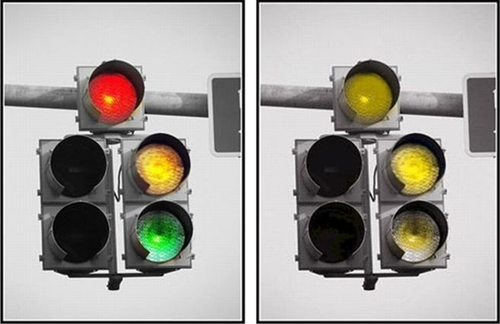
I see the same thing in both pictures, which scares people
This may not have always been the case, however. Colour-blindness is estimated to be present in as many as 5-10% of males (women just carry the gene for us mostly.) This is prevalent enough, apparently, for biologists to believe that colour-blindness might have had some evolutionary advantageous by-product which allowed the trait, and therefore us, to survive hundreds of thousands of years of Darwinian natural selection and Twister tournament humiliation.
Scientists’ best bet, so far, is that colour-blind people are better at seeing through camouflage, especially in low-light conditions, so it might have been useful to have a couple of us in your tribe if dinner was something you aspired to eat rather than be.

Camouflage benefits: “Lucky I was here to spot that hippo!”
Personally, though, I think we might have just survived because it’s a bit of fun for everyone else to have a few of us around, like ginger people or creationists.
My friends used to cackle like freaks, for example, when I did something colour-wacky like hit the wrong ball in a game of snooker, or get on the wrong underground line in a foreign city, or try and dress myself without girlfriend intervention. I once went to a red versus green Laser Quest game, and had to be on my own team like some muddled gump on a day out, shooting at and getting shot at by everyone. Another time, I had a ten minute conversation at a metro station with a man in ripped clothing that told me he was on his way home from a costume party. “What did you go as?” I asked him. “The Hulk,” he replied, confused. He was entirely green (apparently), and staring at me a bit like I’d lost my carer.
Colour in the past
However, us silly colour-blind folk weren’t always just an adorable bunch of goofs that you wouldn’t trust to cook a sausage. No, we used to be quite a menacing bunch of chancers — that is until frightened people with working eyes came along and stopped us. Just ask Anderson or Larson, the engineers who crashed their train into another one in 1875’s Sweden because they couldn’t figure out between them what the colour signals were to prevent them from doing exactly that.
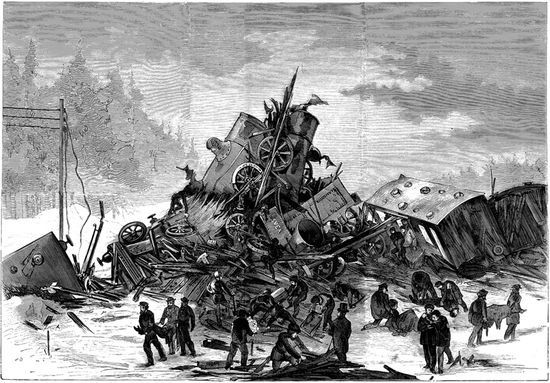
That’s my boys!
Immediately after they colour-blinded themselves to death, Professor Holmgren got involved, like he always bloody did, and developed the first ever tests to stop people exactly like us crashing more particularly big metal things into other particularly big metal things with our fundamentally broken faces. His basic tests persisted until 1917 when a sneaky opthamologist called Shinobu Ishihara came along and started hiding numbers inside lots of dots. You know the ones…
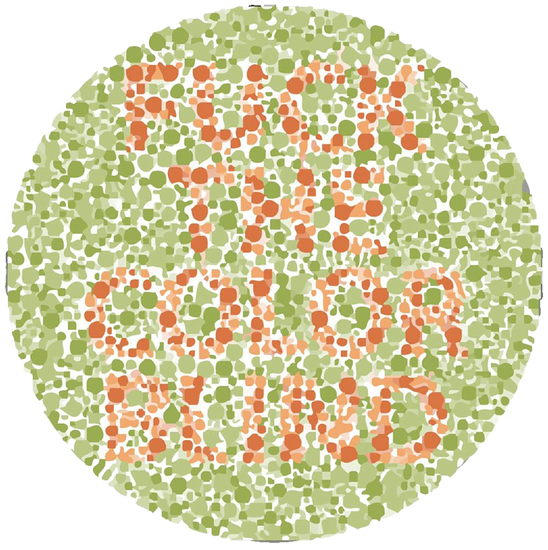
“Is it a 7?”
The list of jobs that Ishihara suddenly stopped colour-blind people going anywhere near is now commonly extended to piloting, pharmacology, fire-fighting, police work, paint-mixing, and, oddly enough, driving in Bulgaria, Romania, and Turkey. If that makes you wonder how colour-blind people drive in countries that aren’t Bulgaria, Romania, and Turkey, then you’ve probably just stumbled upon the second most common question us apple-baffled get:
“How can you drive, then?”
Well, that’s easy. If there is somebody in front of me at a traffic light, I follow them. If there’s nobody there, I guess what colour the light is. It might sound dangerous at first, but let me assure you that colour-blind traffic-guessing still causes less accidents than drink driving, texting, and spontaneous attacks of made-up things like Sudden Handface Disease.
Ho ho ho, enough lies.
The real reason, again, is that the pigment perfect population have bubble-wrapped the roads for us. The red, amber and green in traffic lights, which would normally be our crash-spastic downfall, contain special tinges of blue and orange just for us, and the lights themselves normally live inside a reflective rectangular ‘sighting board,’ so we can differentiate between them even at a distance by their position: top, middle, and bottom. Also, we still guess a bit, but only because we have grown erratic and unhinged from our puzzled nonsense lives.
After explaining that I don’t drive based on shapes and luck, that I don’t see the world like a time travel WWII documentary, and that I know the sky is blue because not everybody in the whole of human history managed to keep it a secret from me, the last question I normally get is the good one.
“What do you see, then?”
It’s interesting because I can’t answer it. Luckily, neither can anybody else. Not even dead gravity genius Isaac Newton, even though he was the first to figure out that white light contains the whole spectrum of colours. He also poked a big needle into his eye socket and wiggled it around, incidentally, presumably to answer some other question that nobody asked about eyes, colour, or sanity.
By the way, I don’t just mean ‘nobody can answer it’ in some acid-tripping hypothetical way, like, “whoah, dude, what if your blue is, like, my red, man?” — or in a ratio reversal way — as in, I’m only “colour-blind” because there’s less of me, and more of you, and if the percentages were simply reversed, “normal”-sighted people would be the weird ones getting laughed out of vegetable aisles, the freaks.
The real reason is more profound, even. It turns out that colour lives a lot more in our brains than we might expect, and is a lot more related to the language we use than the hardware in our looking balls. Indeed, recent experiments have shown that the number of colour-sensitive cones in the human eye can differ by as much as forty times between people, yet most of them can still play Trivial Pursuit together without looking like some sad human in need of extra, boring attention.
But what does it all mean? Well, rather than colour being an actual objective thing, like a hedgehog with small lumps of cheese on it being pushed around a party on a roller-skate, what seems more likely is that we all perceive colour based on the language we’ve collectively internalised to coordinate with each other, a little bit like how women in close proximity synchronize their periods, except not.
If you took a trip to Namibia, for example, you might start having fun, difficult, silly conversations with the Himba people, who have about half the words for colour-identifying as you do. While us T-shirt wearers have eleven words for colour, the Himba tribe have four or five. While we’re getting all fancy with our decadent Western imperialist dark blues, dark greens, dark browns, dark purples, dark reds and blacks, for example, the Himba tribe have already said zuzu and milked a lovely goat. They also have vapa, which is white and some shades of yellow, buru, some shades of green and blue; and dambu for other greens, reds and browns.

They also have one word for ‘your trainers’ and ‘our trainers’
When the Himba were shown eleven green squares and a blue one by some science guys, for example, it was very difficult for them to find the odd one out because they didn’t have separate words for them like we do. However, when shown twelve more greens, including one slightly different one, they could identify it easily, and much, much faster than Westerners could (if they could at all.)
Incidentally, I saw it immediately, too, because I’m not ‘camouflage-blind’ — a new phrase I would like you to start adopting to refer to yourself in the likely event that you aren’t colour-blind, or ‘cone-ally challenged’ as my proud people prefer to be labelled.
If you’re still not quite ready to slap that debilitating brand on your fully functioning head, though, then you might like to be pointed to the tiny minority of women who, through a trick of their genetics (they are the only gender with two X chromosomes, which carry the necessary data), have a fourth type of cone. While the usual three culprits pick up about a hundred hues each, and can therefore be combined to recognise about a million colours for us, the tetrachromats’ fourth one pushes their potential range up to one hundred million variants.
If that’s not astounding enough to base the end of an already bitter-sounding article on, there’s also a species of crustacean called the mantis shrimp, which has sixteen types of cone, and can therefore perceive eleven or twelve primary colours compared to humanity’s dreadful spectrum of three: red, blue, and yellow.
And what exactly would the world look like for these magic women and special prawns?
I don’t know obviously. Why don’t you go and ask them ten thousand times?

“My favourite colour is blorange.”

Image sources: [Fuck the Colourblind]
YAY?Life: the ultimate near-death experience
According to numbers and science and stuff, 100% of us are going to die. That’s a lot.
Yet despite this important, common event being one that we will all share regardless of race, sex and bank balance, the fact of our mortality is the one that we collectively seem the most poorly adjusted to. It’s the topic that we try to think and talk about the least to avoid unpleasantness, and yet the one that has caused the most problems for our species since we became the only animals clever and arrogant and silly enough to start worrying about it. Indeed, Professor Numbers from the University of Guessing says that 90% of the people on the planet are still so afraid of dying that they spend their entire lives pretending that they won’t, and choose instead to believe that they’re going to come back immediately as a butterfly or live forever in a big cake in the sky.
The reason that these childish fantasies have persisted through thousands of years of science, philosophy and logic, is, of course, that we still don’t know what happens when we die. More specifically – because we do know what happens when other people die (they become suddenly, infinitely boring, then later smell funny and melt) – we do not know how to reconcile our weird, subjective experience of reality (our consciousness, or ‘soul’ if you want) with the idea of an objective universe without us in it to experience it. Sentences like that aside, we literally can’t imagine not existing. We’re very used to it, and we’ve never experienced the opposite. It’s impossible for us to think about what it’s like to not think.
Yet we know that one day we are going to die, we know that every living second brings it closer, and we know there is absolutely no conceivable way to cheat it.
It is no wonder, then, that the lack of any right answer to a question that fully changes everything terrifies us more than the thought of being locked in a room with Mel Gibson and some gin. And it is no further wonder that the impossibility of disproving any claim about death is what protects religions’ attempts to have a cheeky guess, and why so many people so desperately want to believe those guesses, regardless of how little they seem to map coherently onto reality or explain anything satisfactorily.
However, just because we cannot be Right does not mean that we cannot be Less Wrong, and luckily we don’t even have to die to realise that some of humanity’s biggest, or at least latest, theories aren’t entirely convincing. Take the Judeo-Christian idea of Heaven, for example, which looks absolutely lovely in the brochures, but makes about as much rational sense in the real world as trying to give a surprise reflexology massage to a sleeping alligator.
Indeed, we can forget entirely that Hell sounds exactly like the kind of place humans would invent to scare their kids into eating their peas. Or that separating people in to ‘good’ and ‘bad’ is a moral system about as complex as Kanye West’s level of self-awareness. Or that concepts like pleasure are entirely impossible without equal and opposite kicks-in-the-balls to compare them to. Finally, we can notice that the whole idea on offer to us – when dissected – is a bizarre tangle of contradictions, impossibilities and paradoxes.
The idea of the Christian afterlife (and no other major religion is much different) is that a Being who exists separate to everything in our universe in an unknowable dimension outside of space and time, who has existed forever, don’t ask, apparently not evolving, created you, specifically, and your appendix, in a different dimension inside of space and time that he controls, with a master plan, and free will to choose for yourself, obviously, don’t ask, because he loves you, ignore those fossils, but judges you, because he knows everything, Jesus, and can change everything, praying, then judges the sum worth of your obedience, forgiving you, sort of, on a simplistic binary scale of human behaviour from the separate and unknowable dimension, angels, to choose whether you should once again rejoin, somehow, that separate dimension outside of space and time, without sin, to exist as yourself, again, but forever, not evolving, don’t ask, or go to a third dimension, separate to all other dimensions outside of space and time, but hotter, which is for naughty children and quite often gays.

White, handsome Jesus explains his appendix to some tramps
It’s all about as lovely-sounding and unlikely as the sky raining books on an open-air Justin Beiber concert. Still, I hear you ask, why would you want to strip this comforting illusion from someone, you smug, awful swine?
There is a common opinion, I think, that because atheism or science or mushrooms or yoga do not provide any consoling alternatives to the Afterlife that this freedom-from-facts is supposed to make good and rational people tolerate religious beliefs, no matter how bonkers they seem when you bullet-point them on a badger, as long as they do something, anything, to help people cope with the potentially agonising dilemma of impending Death. And it’s very hard to argue against the idea of giving a little comfort to someone who is frightened or grieving without looking like the kind of prick who would kick down a sandcastle, for almost the exact same reasons that it is easier to continue certain other simple lies rather than confront a difficult truth. But there is, I think, an extremely urgent, important and humane reason to challenge these beliefs.
Children believe in Santa Claus because a lot of us adults tell them that he is real. In one way, it’s an abuse of our supposed moral and intellectual authority. Children ask us questions about how the world works because they’re truth-seeking, pooey little curiosity-machines, and then we tell them about flying, bullied reindeer, magic slave elves who prefer rich kids, and obese jolly men who disobey property rights and work for Coca-Cola. Of course, this is generally regarded as an OK lie to tell, because it’s a pretty weak tangle of fibs that falls apart on the first tug of the tinsel. Children should work it out fairly young as long as you don’t drop them too much, and adults should admit to their collective deceit quickly unless they want to seem daft and confusing to a nine year old.
The child cries for an afternoon, Mum apologises through the door, Dad has a brandy, Granddad falls down a manhole, and everyone carries on as normal with just some minor trust issues that therapy can always iron out later.
However, imagine for one christmassy minute that a child starts to wonder if Santa Claus is real, and asks their parents, who insist that he is real, but who eventually get angry, upset, or end the conversation if it persists. Imagine if the same child kept asking other figures of moral authority – teachers, priests, politicians – and they all maintained that Santa Claus is real, got upset or angry or offended when the child kept asking, then also refused to continue talking about it. The two options for the child are obvious; he would either continue to believe in Santa Claus because it is too weird and painful to imagine that all of the sources of moral authority in his life would repeatedly lie to his face about their lack of knowledge, or he would be ostracised from the collective fiction by the Truth’s inevitable ability to expose liars, frauds, dicks, and sneaky, pretend present-givers.
This is, of course, atheism’s relationship with religion in far too much of the world.
Some people find it extremely difficult to hear because religious beliefs are almost universally protected, pandered to and pussy-footed around, but there is a reason that we’re afraid of death, and afraid to talk about it.
It is because religion cannot prevent our fear of death; it can only create, prolong and protect it.

Pope throws ‘Dove of Peace’ from window. ‘Dove of Peace’ ignored by Crow of Nature
It gives us the flimsy promise of an afterlife in exchange for our blind, unquestioning trust. It dangles the incentive of eternity in front of us, a reward for our earthly loyalty, and then tells us to close our eyes and wait for it. It performs a crafty but unconvincing magic trick, on children mostly, that simply defines mortality out of existence. Disregarding how much people really trust their faith, and I suspect the truth of that is masked often by the real, psychological harm inflicted on young minds by lying and emotional blackmail, religious beliefs are so profoundly damaging because they arrogantly divert us from perhaps the most important question of all:
What if we’re temporary?
There is absolutely no reason to believe there is an afterlife, at all, and the people most likely to find that hard, sad or scary are the people who have always had their fingers in their ears, deluded themselves into passivity, and naively extended their existential expectations to the borders of infinite.
These people aren’t stupid. They’re not fools. Their irrational beliefs aren’t the product of an intellectual shortcoming of any kind. The reality is far sadder. They are the victims of a subtle but lasting dogma. They were told what to think by all those who claimed to care most about them in the world, people whose good intentions were only perhaps matched by their inadvertently disastrous results. To question certain beliefs, unfortunately, is to question the authority and moral good of the people who believe them, and there are strong emotional and social stigmas in place that make that difficult. Religious people are often the first to ‘take offence’ if someone asks them why they believe a ghost talks to them or how fish can become wine or whatever, and this is normally because its embarrassing to hold beliefs that can’t be explained beyond the word ‘faith’. By telling you that you can’t talk about an idea without a person being simultaneously insulted, they’re saying that you are choosing to break the social contract of basic politeness by bringing it up at all. This makes you the dick (even if you’re doing something not dick-ish, like defending gay marriage or women’s rights). It’s all very clever.
You can see the dogma in action, I think, in the way some people live their lives – especially when it looks like they’re not living them at all, but just trying to get through them as quickly as possible and without dropping too many jars in the supermarket. The worst offenders follow The Rules, whatever they’re told they are by anyone with a haircut, place their happiness inexplicably in collecting things, carbon-copy the lives of their parents, look increasingly like someone with a bag of charity shop clothes and a cruel sense of humour has mismanaged a walrus, and grow old and fat and slow in a house never more than 80 footsteps in any direction from the bit of land some vagina or other plonked them on to.
Death is a really important thing to adjust to, and not to hide from as we are so actively encouraged, because it should be the biggest driving factor of how we choose to live our lives, decide what we want, and manage our health and happiness. You are going to die, so is everyone you know, that inevitably is governed by no rules or regulations about how, why, where or when, and as you get older with those around you, it will become an increasingly regular part of your life, and, as looming, indifferent and ever-nearer a certainty as the next Fifty Shades of Twilight mass-paper-tragedy.
Think about how quickly it felt that you got to where you are now, and then imagine, if you can, how quickly the second chunk ahead of you will go. There is no time to waste, really, and you will never be younger than you are now. There is no afterlife for you in any form that is like you are now — this is it, right here, right now, and it shouldn’t take the clichéd near-death experience to trigger some productive, excited urgency deep in your bones. Life is the near-death experience.
If the thought of death still scares you, part of the problem might be that a society in the grasp of collective fictions and cultural narratives has failed to adequately carve out the space for you to adjust to it healthily. If it feels like a kick in the head now, at least you know it’s a kick in the head when you’re napping on the train track. It might be painful, but it’s the radiotherapy that will cure the cancers of fear and doubt.
We should think about death, a lot maybe, and we should talk about it, and we should carry it’s presence around as a proud and constant millstone on our necks – not because it is depressing or frightening, but because it is what reminds us that we are alive now, and that we won’t be for long, or forever. It should inspire us, motivate us, help us forgive, forget, and remind us not to worry about what we can’t change, or scream at us to repair our priorities from the bizarre and crazed arrangement that society now encourages.
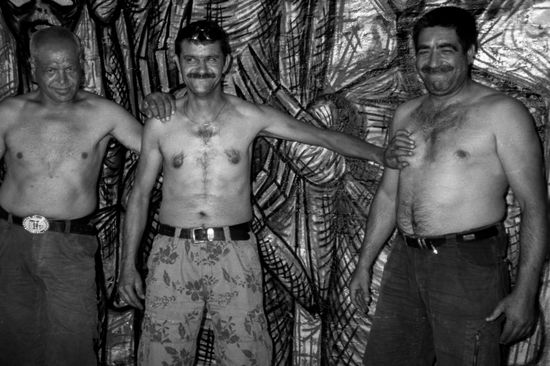
Have a bit more fun, basically
And once you’ve killed the delusions of religion and refused the corrupt pledges of an afterlife, there are a lot less reasons to be afraid of death. Maybe even none. There will be no final judgement on your character, no hierarchy in which you will be assigned a place forever, no eternity to anguish over your mortal mistakes, and, healthiest of all, no lasting reasons to despair over the deaths of others.
Amy Winehouse, as we all found out by text message, recently and accidentally boozed herself dead, with the final coroner’s report concluding that she died of ‘misadventure,’ arguably the most fun-sounding of all the possible causes. The whole episode was pasted in the news as a tragedy, and it was of course, but for us, I think, not her. She was watching telly and listening to music, steadily glugging her way through several bottles of vodka, slipping numbly and unknowingly into her Last Sleep – and, perhaps for someone who seemed to fit so uneasily in this world, release. She started with nothing and ended with nothing. It is us who suffer, grieve, weep and wonder in her wake, or wait for a sombre, slapped-together collection of B-sides at Christmas, while she, simply, does not exist any more. Her deathday was shared by hundreds of thousands of others on our planet, as ours will be, yet the fact that we cry most for those we know best should be the biggest clue to the personal fear at the heart of our grieving.
We have lost something, the Dead have not. Funerals are not for them.
Because when we die, we are not there.
When your time comes, it is not you who will die — it is the universe that will end. Your lens upon the universe will close, and it won’t be there any more.
There is nothing to be frightened of, because you wont be there to be frightened of it.
That’s beautiful.

Death is not a call to Futility and Depression. It can be nothing, I’m sure, but one loud and desperate, pleading Call to Arms. To adventure, experiment and investigate, to dare and dance and drink, to race and run and fight and fall over, and get back up, crash around, and do it all again every day your body lets you; to trade pleasure with pain however you can, and to grow and change and fix yourself; to laugh at Fear and Doubt when they whisper their more pathetic noises in your ear, to cram as much love and laughter in to your life, and as many good others as you can find, as you can, while you can — to live as one big shiny, screaming Fuck You to whatever indifferent forces dropped us here without a map or purpose, and an even bigger one to whatever now keeps us from living how we want.
Death shouldn’t be the handbrake that leaves us rusting in some garage of our own invention, but a red and seductive pedal clamped to the end of our legs, that wont release us until the cliff edge is behind us, the canyon’s fall in front, and all we can think as that Last Wind rushes through our hair is what a great, mad ride it was when we really, really wanted it to be.
Image Sources : [Jesus] [Nature]
YAY?Culture: Weird versus Different
People are a fascinating bunch of animals because the more of them you meet, the more you become convinced they’re all basically the same, give or take the odd genital or language, but the more you also become aware of how much they believe they’re not. There seems to be no end to the clever systems they use to divide themselves, or limits to the creative ways that they can split their oven-rising humanity pie into smaller and slimmer slices. It’s easy to waggle disappointed fingers at religions, nationalities, cultures, and political beliefs, of course, but they’re just the crust of the overly pie-based metaphor, and not the real filling of how people pretend to be different to each other. The common consensus, essentially, is that there are two kinds of people. I don’t mean men and women, obviously, who would all be the same anyway if you actually managed to keep them away from each other for long enough, and I definitely don’t mean children and adults, who are only different in height, hairiness and how much they’re pretending to like each other. No, the two kinds of human are normal people, who are easily identifiable as the people most like you, and weird people, who are, obviously, all completely silly. It’s a simple system, and the nicest part about it is you can start dividing people up straight away without having to obtain any of that pesky information stuff. A normal person in America, anyway, does not need to learn where Montenegro is to decide that they’re never going there, which direction a Muslim is praying if he’s not blocking the drive, or what an anarchist’s political beliefs are as long as they are far enough away from the living room that they can’t stamp on the cat or steal all the nice bowls. Weird people are easy to find because they believe, look like, and get up to all kinds of bonkers. Some of them dance around on one too many axis, some live in bizarre places that are definitely far too something to live in, others do peculiar and unnecessary sex stuff involving the bum, and some have strange hobbies that make as much sense as stapling your shopping list to the middle of your back and going to a disco with lots of tinned soup in your hat. Weird people’s eccentricities can be as vast and varied as they are obviously outlandish, but the point is they’re not normal.
Freaks

I’m afraid it’s the pepper-spray for you chaps

That’s rich coming from black-and-white people
There is a very simple upgrade available, though, and that’s incredibly lucky because clearly the human race can’t do anything more complicated than carry an egg without murdering the Jews.
Firstly, to ease the transition, we can stick with the ‘normal’ category if we want – that part of the plan was working out alright anyway until we all piled on it like Dan Brown at a shit sentence buffet – but we have to change the second word from weird to different. That’s all. Weird to different. The problem before was that everyone was certain they were normal, because they were surrounded by other people who were like them, and because nobody ever introduced ‘different’ as a comfortable alternative, that meant they thought everyone who wasn’t like them was weird, even though they were normal too, just in a different way. It forced people, especially their awful fucking leaders, to invent all these incredible groups that only ever existed in their minds, arranged on concepts as diverse as music tastes, wealth, colour, piercings, philosophy, politics, hairstyle, diet, outfits, traditions, magic beliefs, accents, absorbency, puddingness, pigeonability, whatever. We forgot quickly that we were one thing, except in a few different shapes and colours. And it meant a lot of problems because there was no room for anything that wasn’t normal, but that was equally true for both sides, so conflicts were as inevitable as the intestinal collapse you’d suffer if you had to drink a pint of liquid éclair every time Alan Sugar was unnecessarily pleased with himself. Every day, everywhere, everyone gets up in the morning with roughly all of the same objectives- food, safety, shelter, love, health, happiness, avoiding wasps and Mormons – yet somehow manage to get in each other’s way at almost every available opportunity like too many pricks in too small a pickle jar. Humans cause each other almost constant unnecessary trouble and suffering for the simple reason that they don’t understand each other, and they don’t try to.
Hand, wall, stranger, BANG, world peace
Image Sources: [Crossing]
YAY?Page 32 (War, Coffee, and Nationalist Ham)
Back in January, on the morning of the 17th to be precise, I was hung-over and on my way home from some stupid night in London where I had almost certainly treated my primary bodily organs with all the care of someone who didn’t plan to continue using them. With the morning’s rush-hour commuters heading decidedly in the opposite direction of fun, I slumped down on the train and picked up a discarded copy of the Metro, a free city newspaper primarily published so people have something to point their bleak work-haunted faces at instead of each other.
I browsed lazily to find out what the Daily Mail media conglomerate believed me and every other literate Londoner needed to know about the planet’s adventures since the morning before.

Two people you’re definitely not encouraged to judge immediately as freaks
‘We have 28 rats – and we love ’em,’ reads the first headline over the page, underneath a photo of an unsmiling couple with a dozen pet rodents crawling on them, an oddity you’d probably notice quickly if it wasn’t for the massive and quite frankly hypnotic bogie suspended so proudly in her nostril.

After I eventually managed to pull my eyes away from the lady’s baffling inattention to things inside her face that she probably didn’t want published, I meandered through a few more pages.
Headline highlights included:
‘Pickles admits ‘gentle’ battle,’ a small story about a Tory politician called Eric Pickles who did something or other that nobody cares about because he is called Eric Pickles and look exactly like this:

No one made him choose a career that required a tight collar, remember
‘Kelly sex op shock,’ page 7, where ‘it has emerged,’ apparently, that Kelly Osborne’s former fiancé cheated on her with a transsexual, although it might as well have been an exhaust pipe or a rolled-up receipt or a damp cabbage going by his obviously crippled sense of judgement;
‘A whiff of Neverland puts the eau in Jacko,’ a title so baffling it makes the attached article on page 25 about an illegal immigrant selling perfume made from a deceased man’s flowers look absolutely fucking sensible; and, finally,
‘British Bruce Lee makes it in China,’ where Ross McGuinness, who is clearly a genius for convincing at least one person in the world he’s a journalist, begins his piece on page 29 with, ‘IF THE British had made a version of Enter the Dragon, it might have turned out a little like this,’ before going on to explain how the actual events that he’s waffling about –a man from Brighton judging martial arts students aged seven to seventy performing solo routines—are so far unlike that film that he might as well have begun his article with ‘IF BRUCE Lee’s spirit possessed a cracker…’ then waffled on about some blissful, alternative reality where people called Ross McGuiness aren’t allowed within 10 metres of a keyboard.
Finally, I reached Page 32, the first half of a double-page spread that affected me enough at the time to save the entire newspaper, place it in a drawer in my desk, and ignore it until some elusive, future time when I would locate it again and write what I might have written then if I didn’t have so much flat booze sloshing around my guts.

Tired of standing in line? Join the Army!
Where page 32 was different from the rest of the newspaper, it seemed to me, was that it contained a small piece of text in the bottom-left corner, squashed beneath a massive advert for a credit card and two articles glorifying British soldiers for their past ‘bravery,’ that was actual news, here in fun-ending full:
21 civilians die in string of attacks A TOTAL of 21 civilians were killed in two roadside bombings and an airstrike in Afghanistan at the weekend. Nine of the dead, including a child, were hit by a bomb yesterday as they drove to a wedding in Pul-e-Khumri in northern Baghlan province. Another six – half of them children – died the previous day in a Nato-led airstrike on two houses in mountainous eastern Kunar; local officials said. The raid killed ‘numerous’ insurgents identified as an imminent threat to ground forces, claimed the Nato’s International Security Assistance Force. Six civilians were killed by a roadside bomb in Helmand Province.
It was amongst the smallest pieces in the paper, yet it seemed to me to contain the most tragic of events. Why was it not a big story? Why was it not the biggest story? They were on their way to a wedding. Are we so desensitised to war and violence that this just wasn’t deemed interesting enough? Are we so far away from the consequences of our militaries that we just don’t care? Are we just so beaten down by the relentless stream of similar stories that we are too numb and passive to react? I don’t know.
What is perhaps more enlightening than the apparent insignificance of the death of 21 civilians — including the three children killed by the entirely unaccountable Nato military force – though, is the context of the article within the Paper.
The top article, ‘Mechanic’s war heroics told on film 70 years on,’ tells the story of Wally Harris, a veteran of the Second World War, who shot and killed up to 15 German soldiers in an action the Paper and the filmmakers describe as ‘heroic,’ but which he himself describes as “terrifying” and “daft.”
Further down the page, but no difference in its baseline patriotic tone, is a second article, ‘Ex-soldier puts his MC on eBay,’ a story about the former infantryman Alan Owens who was awarded the Military Cross medal for his “bravery and selfless commitment” in Afghanistan, then auctioned his small piece of literally useless metal on eBay with a cheeky starting price of £25,000.
The connection between these two men, though their actions were separated by 70 blooming baby-booming years, is that they are both British and, therefore, the good guys.
As we digest the information that 21 civilians – real people, like us – were blown to pieces by the same eternal good guys in a region thousands of miles away from the governments that sanctioned their deaths, we are equally expected to regard other soldiers who blindly followed orders as the inherently bravest and most heroic of our citizens.
It’s bullshit.
We don’t need to learn much new to realise it, either, just un-learn some of the silly whizz that we might have never scrutinised. And, if you’ll bear with me for a minute, I promise after to explain how this entire massive rant was the product of me drinking too much coffee, then getting annoyed at a packet of ham.
Humanity is a species whose work you’re probably familiar with. Lightbulbs, picnics, hinges, et cetera. There’s close to 7,000,000,000 of them at the moment, all alike except for culture and how they do their hair, and they’ve been divided crudely but apparently convincingly into about 250 major clubs that I refer to, perhaps far too aware of my own ironic tone, as ‘countries.’ Anthems, wars, netball teams – you’ve seen them.
However, these ‘countries,’ through the unattended practice of having political leaders, hierarchical institutions and governments, could also be described as sharing a creepy amount of overlap with the phrase tax farms. They require things like walls, fences, borders, militaries, passports and ID cards to envelope an effectively non-consensual group of similar-ish people — ‘citizens’ we’ll call them — within their borders from whom they can forcibly extract a product: in this case, money. Borders aren’t so much gatehouses to keep ‘them’ out, whoever those pesky problem people are, but more like the pen that keeps ‘us’ in.
Each club, or ‘country,’ has its own leader, or small groups of leaders, who, after attacking, tricking or convincing their ‘citizens,’ are protected in this role by the very guns and bombs and armies that they sometimes use to wrestle resources from each other, which they have done throughout history, and still try to do as today, which is completely obvious to any one who is not otherwise living inside a discarded, road-side fridge. Meanwhile, these violent, greedy and silly acts of war are committed at the direct expense of soldiers, and funded by the very tax-payers that they claim to represent the interests of. Tax-payers, incidentally, that if asked, would presumably insist on preferring better roads, teachers, nurses and water cannons for spraying fires and young people, than a trail of dead, brown people somewhere bloody foreign.
The ‘them and us’ has never been ‘our’ people and people from different countries, no matter how much we have always been actively encouraged in to that mode of thinking (The French! The Nazis! The Communists! The Immigrants! The Terrorists!)
The idea that there is an ‘us’ at all is perhaps the biggest and most constant lie told in all of politics.
Farms and Farmers
It is also not hard to see what a farmer could want to take from another farmer, and inherent in that shit, nursery-level sentence is the basic truth behind most wars since the beginning of these formalised cults we call countries. It’s probably more accurate to say that the ‘them and us’ has more commonly been the people of the world and those who rule them; those owned, brainwashed and forced to kill each other, or fund it with stolen chunks of their pay-checks, and the people who are in control of that system. You cannot have violence abroad without first having violence at home. You cannot point guns at foreign citizens without first pointing them at yours.
If all this is making me sound like a hippy-lefty-liberal-something-conspiracy-sensationalist-bloggy-twat-sort-of-a-man, here’s a deservedly famous and grimly illuminating quote from one of modern history’s particularly bastardiest bastards Hermann Göring, the Nazi general who had one of the safer jobs in the long and unpleasant series of events we call World War II.
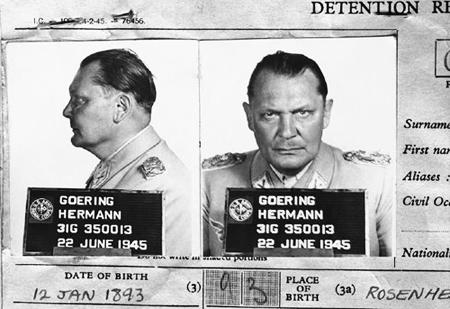
… which is weird, because he looks so nice
Just before he picked up prizes in both the War Crimes and Crimes Against Humanity categories of the Nuremburg Awards Ceremony, and before he killed himself with smuggled cyanide the night before his death sentence (obviously), Göring immortalised his hopefully untrumpable bastardishness in a prison-cell interview:
Why, of course, the people don’t want war […] Why would some poor slob on a farm want to risk his life in a war when the best that he can get out of it is to come back to his farm in one piece? Naturally the common people don’t want war; neither in Russia, nor in England, nor in America, nor in Germany. That is understood. But after all, it is the leaders of the country who determine policy, and it is always a simple matter to drag the people along, whether it is a democracy, or a fascist dictatorship, or a parliament, or a communist dictatorship. Voice or no voice, the people can always be brought to the bidding of the leaders. That is easy. All you have to do is to tell them they are being attacked, and denounce the pacifists for lack of patriotism and exposing the country to danger. It works the same in any country.
Little has changed in this fundamental dynamic. There is something important to untangle here in the idea of British soldiers fighting Iraqi or Taliban soldiers, for example. Thousands upon thousands of men weren’t sitting around either side of a continent, twiddling their trigger-finger-thumbs, and getting increasingly hateful towards another group of people that they’d never met or thought about before.
No. It is the British (Replace As Appropriate) government fighting its ‘enemies,’ and ‘our troops’ are merely the currency of exchange used to achieve whatever desirable political ends are being sought. This could be any of the usual candidates, depending on where you lie on the continuum of idealism/cynicism: Regime change, oil, contracts, strategic military footholds, revenge, whatever. It doesn’t really matter when we – the common people, the poor slobs on our farms – will buy any old twonk about terrorists hating our freedom, non-interventionists being ‘terrorist-sympathisers,’ or Weapons of Mass Destruction (remember them?) being pointed directly at our local pub.
We might be a bit naive to believe that governments ultimately care the most about soldiers’ individual lives. Soldiers are not individual people to these warmongering arseholes — they’re pawns in a real-life game of chess. They’re dispensable. Statistics – a regiment (1000?), a division (5000?), a brigade (10,000?). And the saddest thing to me is that soldiers will keep being used as tools and meat weapons because we keep pushing them into harm’s way with our dreadful, hysterical fucking nonsense.
Help for Heroes! Support our boys! Respect the troops!
Hell, if you’ve stayed with me through all that heavily-caffeinated ranting, you deserve to know that the reason I remembered to write this thing at all today was that I went to the fridge to make a sandwich, and saw written on a packet of ham, ‘SUPPORT OUR UK FORCES PURCHASE THIS HAM.’ Incidentally, this pork product that was purchased for its primary function of being ham, rather than its minor contribution to a pervasive culture in our society of glorifying those who might be the most heinously misused by it.
Slices of deceased pig, quite simply, should not be encouraging you to support soldiers, whatever ‘team’ they are on. In fact, I’d prefer my ham to have very few political opinions at all.
So next time you see an article in a newspaper and it pulls out one particular dead soldier’s name (and, inevitably, neglects to mention the many, non-allied civilians who died that same day), praises him or her as a hero, no questions asked, and then tells you they were brave for dying to protect you and your freedom — remember also the sadder flip-side of this event.
They did not die to “protect you.” They died because they were paid to, as they were ordered into that known danger. Their glory, their fame, their front-page obituary, is completely tragic, temporary and fleeting; yet no more-or-less than tomorrow’s fish-and-chip paper in some Greater Plan. It’s a nudge in your ribs to keep you believing what you should.
To keep supporting soldiers.
To keep supporting war.
To keep supporting ham.
That soldier’s extinguished life, the lives they probably took as well, and the grieving relatives either side of the gun they were paid and ordered to carry –all that loss and suffering– will be hard, perhaps impossible, to measure in gains to your freedom or safety, but easier to measure in the career trajectories and bank accounts of the military-industrial complex, oil companies, politicians, lobbyists, contractors, mercenaries, capitalists, industrialists and pork peddlers – nobody who can legitimately claim to care about them or you, unless it aligns with their own motives first.
When you religiously glorify soldiers, praise them, worship them, or martyr them, you become a small, unwilling part of the social machine that sends them to war — one hand amongst many that pushes them towards danger and death.
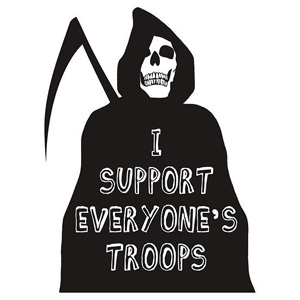
Oh, Death, you wacky liberal
The whole myth falls apart when we attempt the difficult task of trying to value every human life equally. When you realise that EVERY SOLDIER on EVERY SIDE does WHAT THEY ARE TOLD and BELIEVES THEY ARE RIGHT, suddenly it doesn’t seem so fun to keep sorting them in to lines, pointing them at each other, and whispering into their ears what the other lot said about their mothers and a courgette.
When a war is ‘won’, and you won’t see much of that any time soon, what has really won is the idea that war can solve problems. That complex, intricate matters like drug trafficking or border disputes or religious fanaticism can be solved by splitting into teams and slinging a stubborn amount of violence, expensive weaponry, cash and ignorant rage at each other.
Yes, kids, adults solve problems by trying to explode them; adults solve problems by shredding up each other’s internal organs with terrifying metal projectiles.
The cause of war
In fact, the preliminary, prerequisite cause of most wars is statism – the existence of states and nations – and the division of people into these old, ever-shifting, imaginary-bordered clubs by their owners. If you defend the state as a noble solution to social issues like education and road-building and healthcare, it’s unfortunate that you must also carry around the baggage of state on state conflict. You find yourself wearing the millstone of the millions of deaths caused directly by their very existence; 40 million people in the First World War, over 60 million in Part Two, millions and millions more before, in-between and after due to the clashing ideologies and intentions of all those in power with the means to mobilise the world’s poor against each other with violence and financial incentives. Add to this history’s conquests, genocides, revolutions, civil wars, terrorism, government-caused ghettos and famines, and it suddenly becomes very difficult to make the case that states and their agents are definitely the best possible conceivable way humans can come up with to protect you.
Historically, the encouraged mentality of blind patiotism –and that’s a lot of what a state really is — a firmly-rooted and heavily-propagandised idea in our collective consciousness — has almost always been the biggest threat to your life and your livelihood that exists. Indeed, as you are forced to pay your taxes (with the threat of punishments), governments can auction your future earnings in the form of debt, you’re threatened with imprisonment if you break a myriad of rules you have almost no control over, as the state has a practical monopoly on the use of violence, can theoretically draft you into the military whenever it wants, uses propaganda to achieve its political ends, and will always, always protect its existence over yours, it’s difficult to argue that ‘your country’ is anything but the absolute enemy of your freedom. While it might protect you from other countries, it might not protect you from itself.
That’s why blind patriotism is so consistently encouraged by those in power.
A very lucrative myth would crumble without it. There’s no conspiracy here either – it’s just a clumsily set-up world that we live in. It’s a flimsy, patched-up bodge job which we’ve all inherited from bloodthirsty monarchs, dogma-ridden institutions, warmongering factions, superstitious know-nothings, and ignorant, echoing relics of the Dark Ages.
We’re actively taught and encouraged to worship ‘our’ soldiers, to believe that simply by being a soldier, regardless of any individual characteristics (like, oh I don’t know, your personality) makes one good and brave and heroic. We are further encouraged to maintain the long-established nonsense of past murdered men having “died for our freedom,” like they had any choice in the matter (by which I mean, a better choice than “Go to War or go to Prison: which would you prefer today, sir?”), rather than the enforced protection or expansion of borders and tax-bases, in opposition to the other entities protecting or expanding theirs.
To criticise this herd mentality, to remark on this zealous, foolish ‘national’ limit to our empathy, or to even open a discussion to the idea that soldiers aren’t automatically amazing and brilliant and admirable – some of them are definitely just massive dicks – is to be accused of being unpatriotic, treacherous, unappreciative or ridiculous. It is the most powerful and perverse of social stigmas that those who care the most can so easily be accused of caring the least.
That is, perhaps, how four murdered children end up as a small note in a little grey box on page 32.

Countries – A Problem Earth Doesn’t Need (Hencewise.com)
U.S. Soldier Ethan McCord talks about his time in Iraq. A hard-to-watch but important video. Informative and tragic.
Image Sources: [Pickles] [Death]
YAY?The Evolution of an Atheist
I was an atheist from a fairly early age.
Like perhaps the majority of the Western World’s greatest sperm, I was born. As such, my geographic location just north of London meant my dance with the divine began in an old, cold building with a white man in a dress putting his wet finger on my confused baby head.
He splashed me a bit, read something from the best-selling book of all time, and a lot of older people I would later become aware of smiled cooperatively while pretending not to care that they could have been three or four Bloody Marys happier somewhere else.
At that moment, even though my cognitive function was not yet developed enough to avoid shitting myself all day, I apparently earned the rite of passage into one of the world’s more diluted forms of the Christian Church. If you think it was exploitative that I had no apparent free will when entering such an important spiritual contract, don’t worry. I can honestly tell you, at the time, I didn’t give two milky tits about it.
In fact, Christianity worked out great for years.
This God character, despite being all-knowing and all-powerful, generally seemed to keep His nose out as I thundered around nursery school, falling over and bonking girls on the head with a big rubber hammer. He didn’t stop me making faces at the teachers, or peeing on the toilet seat, or putting my dinner in my hair. I liked Him, and it seemed pretty obvious that He liked me too. He let me get away with loads of naughty stuff; sort of like a cool, hip dad that let’s you drink some beer if you promise not to tell your mother.
Indeed, there was one time when all of the adults went out and I was misguidedly trusted to look after a dog. On that occassion, God even let me take a decorative Shaolin sword off the wall and try and slice an apple in half with it, just like in all those movies I wasn’t supposed to be watching and getting ideas from. To my naive surprise, the apple didn’t splice in two, cleanly separate, and slide apart like I had expected. It fucking exploded. I spent hours frantically cleaning up an incredible amount of apple matter from the walls, floor, ceiling, furniture, sword, and dog.
There was almost definitely a commandment about not doing that kind of thing, I was sure of it, but it still didn’t seem to matter — I got away with it again.
Me and God, we were mates.
Not far from this time, then, did it seem entirely silly to the increasingly thinky thing inside my head that the World might just revolve around me. Boring adults were always telling me it didn’t, of course, especially whenever I did something obviously clever like eat all the jelly… but how could they prove it? I certainly couldn’t. For all I knew, adults left the room and suddenly disappeared. On the other hand, I knew that I existed because I could smell myself. Plus, when I went to bed, the whole world went away just because I wasn’t awake to look at it. Then it magically came back again exactly as I finished sleeping. Coincidence? I don’t think so.
Then I got thinking about that definitely real, true story that I was told about Jesus. The world revolved around me, so I must have been told that story for a reason. I was told he was due back any minute now, apparently, but nobody knew exactly when.
Well, I was the only person that I knew definitely existed, and I also seemed to me like a pretty nice kid, especially when you ignored all those times when other people thought I wasn’t…. well, you know, couldn’t I be Jesus?
With all those songs they made us sing about being God’s children in primary school, no wonder the idea occasionally fluttered on the nose-picking periphery of my subconscious for a while.
I was a good lad. When I was punished, I remember, it was always unfair. Whenever I did something wrong, it was never my fault. Whenever I was bad, it was only an accident. There was certainly no way in Heaven that I deserved to go to Hell. Burning, flaming, awful, unbearable torment and torture for all eternity just because I found swearing hilarious in school, pushed a wardrobe down some stairs, crashed a golf cart, threw fruit at cars, lied about kicking a mirror while practising karate, and occasionally stole a chocolate bar? Yeah, right, I thought as I planned out my dream mansion in the clouds, complete with Sega Megadrive game library, Pop Tarts at every meal, and my beloved Right Said Fred tape on endless repeat.
It was around this time, though, that God stopped doing Himself any favours.
On one hand, He kept making me taller. This I liked, especially for the immediate benefit of being able to reach more stuff that I shouldn’t. On the other hand, however, he was giving me a bigger head. There was literally more brain in there, and it was using all the extra space it had annexed from the outside world to do more thinking. By the age I was falling out of trees with frightening regularity, I started to understand that not everyone in the world believed the exact same things about God, life and death as I did.
On other parts of the planet, apparently, people didn’t think that Jesus was the virgin-born son of God who could save your eternal soul if you loved him telepathically, or that all animals exist because two of each species got on a boat with a 600-year-old farmer and survived a genocidal flood sent to cleanse the blood of humanity, or that evil exists in the soul of all people because a woman made of dust and rib talked to a snake then ate a forbidden fruit from a magic tree. No, these other people believed in all kinds of nonsense.
By my fingers-and-toes counting estimations, there were at least thousands of people on the planet, and the majority of them, it turned out, followed entirely different religions to the one I did.
There were ones that sat down a lot, some who wore bed-sheets or hats, others who didn’t like women very much, some that pointed in a specific direction every day, ones that wouldn’t eat burgers, and another lot that knocked on your door to smile at you.
At first I thought I was pretty lucky to get the right God, but then my increasingly pesky head started to think that it actually seemed a bit strange that most of the world’s population were going straight to Hell just because they weren’t born in the right country, continent, or hemisphere.
How could so many people believe such different things and still believe they were definitely right?
It started to seem to me that there were more gods than Pokemon, and they couldn’t all be in the sky, surely, otherwise there would be no room for the birds and the aeroplanes and Superman and Santa? I was young, but I was starting to figure out something that some of these taller humans seemingly hadn’t.
Either nobody was right, or my friend God, the ultra laid-back babysitter dude who once let my young cousins and I entertain ourselves by throwing live crabs into traffic, was not really giving everybody a fair chance. To create a world and universe just for People, then send the majority of them to Hell just because they weren’t born in the right place to read His autobiography seemed a bit devious to me, especially when it was Him who chose to create them in the first place. It was sort of like hiring a teacher, stealing all their clothes, and spraying them with lighter fluid, then hysterically blaming them for being a dangerous, flammable pervert that ruined the school carpet.
So, like any kind of smartarse kid (who only just figured out He wasn’t Jesus) would do, I started getting a little brave with the Almighty. Testing him. I called him an idiot at first. Then a sky idiot. Then a pretend, useless flipping cloud-twat.
I opened my eyes. No lightning… no boils…
So I swore at him, ‘God, you dicky dick… you tossy dicky tosspot.’ No floods… no plagues...
… No consequences.
It was then, somewhere between the age of seven and whenever I figured out how to swear properly, that I realised the World was the same colourful, silly, chaotic, fun, strange, dumb and indifferent place whether He was there watching it or not, and, quite obviously it seemed, He wasn’t.
Before I even knew the word, I’d become a simple kind of atheist.
Despite this, there were still times as a child that I would get scared, and my faith in my lack of faith would suddenly seem less certain; perhaps on stormy nights, with coloured, cartoon covers bundled to my chest, or when the looming anxiety of getting caught for something particularly bad would creep under all defenses and grip me like a vice; when I felt entirely powerless to prevent the unfolding of some frothing, plotting future, I would still pray.
“Please, God, help me… please… I promise if you help me not get caught I will believe in you again… please… I promise, God, just help me.”
I knew it wouldn’t change anything, I think, but if I did get what I wanted there was still one last thought I couldn’t help but direct towards that expansive sky with no one in it.
“Haha, tricked you again.”
YAY?Aliens: I’m so sorry, Brian Cox
The gigantic smiling head that orbits our planet belongs to a man called Brian Cox. He’s a particle physicist, university professor, mother arousal specialist, and television presenter who makes decent science programs about space for the BBC.
He seems like a nice, cheerful sort of a chap — certainly the kind of person that you would rather hire a boat with for an hour than purposefully misdirect towards a sniper battle in a landfill.
So, in a pub last week, if I had been the Supreme Leader of Planet Earth instead of just mildly alcohol poisoned, he was the person I would have chosen as my ideal ambassador for humanity in the eventuality of aliens ever landing here.
I think I owe Brian Cox an apology.
One in a sillion bananillion gorillian
‘Aliens’ almost certainly exist. If you don’t think they do, it might be that you have just momentarily forgotten how big the Universe really is. Have a little click around this for a cheeky refresher – and remember that this is just the tiny, tiny bit of our galaxy that we can see and take photos of – or just look at this 75mb gif I’ve made your computer download…

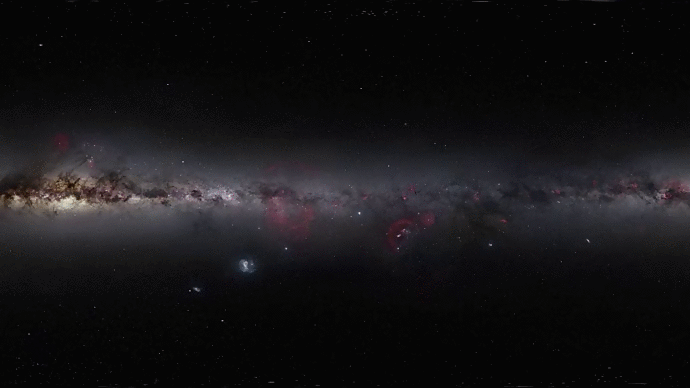
Space is a silly, silly place.

Each one of those dots is a star like ours, and a source of energy to the planets caught in its gravity, just like ours. Each is a hub in space for all of the same elements we’re made of, and each is governed by the same physical laws that arranged those elements into something like us.
There is estimated to be between 200 and 400 billion stars in the Milky Way, our galaxy, and at least hundreds of billions of galaxies in just our bit of the Universe. Not that these numbers mean anything beyond stonkingly flipping massive by this point, especially considering that this pesky Universe of ours hasn’t proved itself to be anything but infinite just yet. Basically, we might as well say there is a sillion bananillion gorillion stars and planets for the amount it helps our tiny monkey minds to comprehend the situation.
The point is: it’s incredibly improbable that we are special.
Space
However, the reasons that aliens almost certainly exist are also the exact same reasons why we will probably never meet them.
Furthermore, they are also the exact same reasons why we never want to.
Our nearest star, Proxima Centauri, is about 4 light-years away, or 24,000,000,000,000 miles from us. To barely put that in some form of perspective, the interstellar probe Voyager was launched 33 years ago, and has only just begun to breach the edge of our solar system 10 billion miles away. It will be another forty-thousand years before it reaches even the very nearest planetary system to us.
Me, you, Earth, the solar system, and even Brian Cox’s massive floating head are all effectively lost in this cosmic quarantine. Considering that our Milky galaxy alone is 100,000 light-years from end to end, even the 100 light-years that our radio broadcasts have travelled so far seems as about as significant as a widowed ant’s anniversary plans.
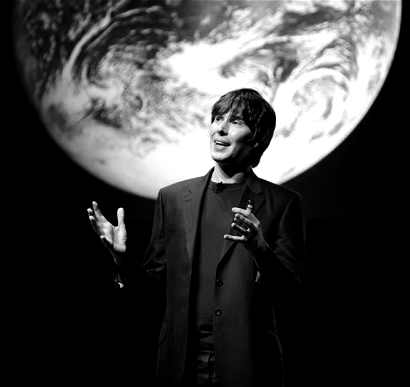
Huge Cox
The space that we’re hiding in is just so empty and massive that the statistical improbability of advanced alien civilisations finding us is so great that you could assume the word astronomical was invented for occasions just like this sentence.
Astronomically Unlikely
Of course, this is all based on the slightly smug assumption they would want to find us at all.
There are more stars just like ours than there are grains of sand in all of the deserts in the world. So, if life exists here and in at least one other place (where the aliens come from), then it’s logical to assume it exists everywhere.
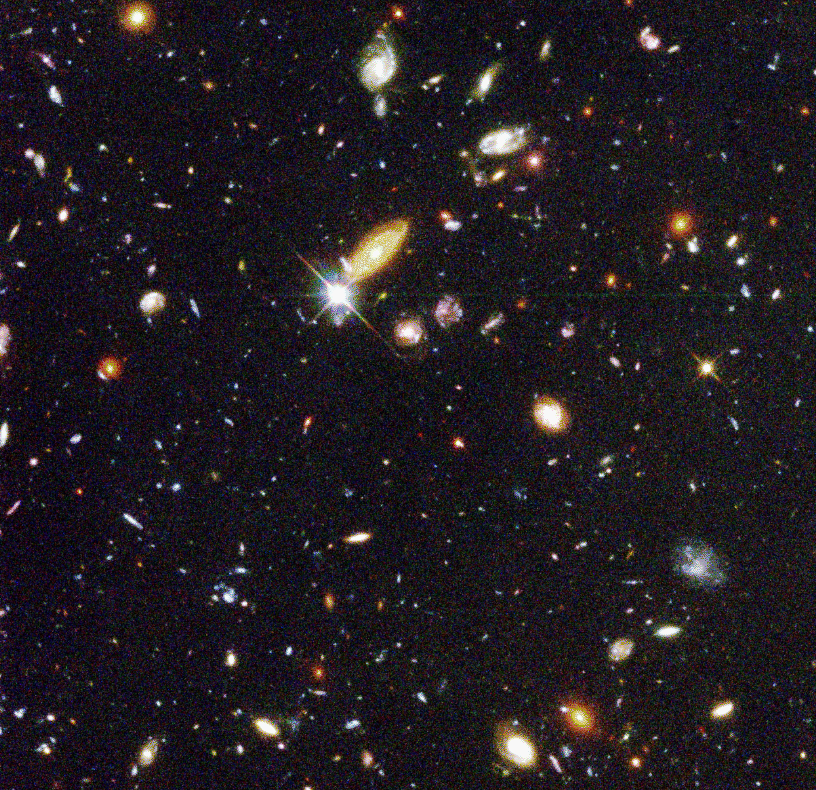
Unhelpful amounts of galaxies
Suddenly, we’re not the special, magical wonderstuff that invented trousers and bread; we are insignificant, common, generic.
Like every commodity in existence, life is worth less when it is in abundance. We treat pandas kindly because they are rare, but we’ll happily plough a minivan through a parade if we think there’s the slightest chance we might kill an extra wasp. Aliens, if they do somehow find us — and that’s generally the kind of thing they like to do — would probably have found so many other planets and life-forms that they would regard us with roughly the same level of enthusiasm we’d devote to Paris Hilton’s opinions on anything more complicated than a sausage.
The chances are that they won’t fawn over how impressive we are, or invite us to join some intergalactic ride-sharing space union, or begin imparting their advanced scientific knowledge to us.
No, they’ll probably stop for a photo, giggle at an aeroplane, and move on.
Like us?
The other common thread running through many science fiction stories and UFO conspiracies is that we, humanity, want to meet aliens because they’ll probably be somehow like us, humanity.
Even NASA, which you’d assume must contain at least a few people you could trust to hold a hot coffee without dipping their ears in it, seems to subscribe to this idea. When they launched Voyager, they placed on-board an especially commissioned golden long-play record complete with a map of our solar system and an audio track of uncharacteristically peaceful messages from our planet — a planet, I remind you, that has been at war almost non-stop since it was clever enough to invent nations, gods, sharp stuff and things that go bang.

(Although we’re also pretty cute sometimes…)
And right there could be our problem.
It’s exactly because they might be like us that we don’t want to meet them. To reach Earth, extraterrestrial life would need technology whereby they could travel trillions of miles in their life-spans. The human race, meanwhile, are still executing each other with lumps of metal to get the best price on a finite, black liquid we have to burn to get to the shops.
I mean, seriously, have you met us?
Think about how well humans historically have treated life-forms they see as inferior to themselves.
Ask the Native Americans how being friendly to visitors turned out for them.
Ask an African a few centuries ago how excited he was to see a boat.
Ask the dolphins and penguins in the zoo how they came to the peculiar decision to move to a fish-tank in North London.
Humans don’t discover anything and think ‘oh, look at this thing doing absolutely fine without us.’
No, we bomb it, dig it, skin it, mine it, catch it, poke it, spill it, lose it, break it, burn it, and sell it. We plant a flag for the press conference, move in the bulldozers, and then set up a gift shop selling postcards of what it used to look like.
So while “Hello. Let there be peace everywhere,” might sound like a confident message to sling deep into the cosmic dark with a trail of breadcrumbs home, perhaps we’re more like the lamb that’s rolled itself in buttered herbs and is lolloping happily towards a man holding a pita bread, a shotgun and a barbeque.

We even put a galactic map on it
These bloody aliens apparently possess wizardry that allows them to bound across time and space just for a laugh, and I was going to send Brian Cox to go and shake their hands/claws/tentacles like we’re equals? No, no, no, I’ve changed my mind. I’m so sorry, Brian.
At the very first sign of a spaceship landing, please take my lovely, smiley Brian Cox, put him in a helicopter with a pencil, and get him up a mountain somewhere to think up new ideas for super guns.
If I could choose again, I would vote for someone with at least one finger up their nose, a face that could divert traffic, and a name like Wally Fumblebricks.
Better still, send a pig in a cardigan and hope they don’t figure out we’ve got 20,000 nukes.

Image sources: [Cox] [Bigger Cox] [Believe] [Cute]
YAY?You – a guide to your weird, incredible cosmic existence
Hello!
Right now, you’re strapped to a bit of dust called Earth by an unexplained force called gravity in an incomprehensibly large absence of matter called space, orbiting at extraordinary speeds around a massive ball of plasma called the Sun in a period of relative cosmological calm, and at a convenient distance and temperature that support a weird little magic mindfuck called life.

… and everyone and everywhere and everything that’s ever happened, of course
Yet this cheeky little phenomenon, while often lovely and interesting, has been confusing our tiny little brains ever since it invented them for us. There are concepts so baffling to us that when we try to imagine them, our minds almost literally recoil in defence like there’s an inbuilt shut-off valve to protect us from the full horror or wonder of understanding them.
Like everything. You know, all this, hydrogen, magnets, cushions, where exactly did it all come from? How does anything, let alone everything, come from nothing? If before something there wasn’t something, then, you know… what?
And infinity. How can space and time not have boundaries? How can anything go on forever? If infinity does not have a start or an end, and it doesn’t, apparently, then, you know… what?
Then there’s life itself. Is it just here or absolutely everywhere? How did it start and what happens when it ends? If we are ‘alive’ but we are just made up of loads of stuff that is not ‘alive,’ then, you know… WHAT?
You get my point.
Take you, for example, the sitting, reading trophy of four billion years of evolution. You’re interesting. At one point you were the youngest person on Earth, remember? You’re amongst the most complex creatures to have ever lived on this planet, maybe anywhere in the cosmos, and you exist now at the end of an unbroken chain of successful reproduction, adaptation and genetic transfer that stretches all the way back through time to the very first interactions of boring, inanimate molecules that sparked the beginnings of life. Or to put it a cooler way, none of your ancestors were barren or sterile or failed at getting laid, even before they had genitals, and even before they had to have sex with themselves to get things done. If you don’t have any children, you’ll finally be ending a continuous pattern of humping and DNA transfer that’s been going on since your ancestors were about five-thousandths of a millimetre in length. If you think that puts pressure on you to try and get some sperm or other into a warm place with good career prospects, then consider the alternative: if you don’t reproduce, you’re at the end of that chain; the zenith; the apex; the pinnacle of a single billions-of-years old evolutionary strand. Every single event and atomic encounter since the beginning of time led exactly to you. Here. Now.
This very instant, my special little sausage, you are floating somehow, somewhere in a part of the liquid phenomenon of Time we call the Present, both the oldest you have ever been, and the youngest you will ever be again.
Despite this, everything you see and hear and experience happened in the past, even though you, now, again, comma, have never been in it. The sunlight that warms your mayonnaise at a picnic is seven minutes old, a bullet could already be in your pelvis by the time you’ve heard a gunshot, and this sentence will take entire nanoseconds to reach the middle of your brainbox, even longer if you’re reading it underwater or reflected off the highly polished skin of a dolphin. The ‘present,’ ultimately, is a figment of your imagination, a deceptive trick of the senses, a concept that we claim to live in but are more realistically ever chasing after like a fat kid, bumbling and wheezing half way up a staircase, trying to figure out what just happened, what’s going on, and, oh for bum’s sake, now fucking what?
Meanwhile, the whole time we’re ignorantly faffing around in socks and jobs, we’ve also got no idea if we’re even in control of ourselves, our thoughts or our actions — not that it matters who wrote the movie, as long as you’re enjoying it– and we’re inconveniently hurtling without brakes towards a cliff edge of uncertainty.
It’s not like you could be expected to figure out these brain-bungling conundrums, though, being as ill-equipped for philosophical computing as you are. After all, you’re just a sort of colourful, thinking soup in a human-shaped bag; a pulpy, watery mass made of blobby, smelly things and meat that is constantly renewing, refreshing and replacing itself. The thing you eat today will be part of the brain tomorrow that recognises what that thing is, so no wonder it’s asking a lot to figure out if it has Free Will or not. That quite unintelligent looking sandwich in your flabby lap, for instance, could tomorrow be doing complicated maths, or solving an intricate moral dilemma involving a duck, or even remembering your first kiss. And when it does remember that first kiss, incidentally, it will trick you again into believing that you were there.
Except you weren’t.
Not a single atom in your body now was there then. Every bit of you has since been replaced many times over. Whatever ‘you’ are, therefore, is not what you’re made of, but is somehow, and not-simply, contained in the gooey, temporary arrangement of what you’ve eaten. To put it more delicately, you have a hole that runs through your body, practically uninterrupted from your mouth to your arse, and its job is to disrupt the flow of matter from one place to another in the Universe and momentarily assemble it in to a recipe called You. You’re a glorified food tube; a squishy-squashy tunnel that supports your head; an egg-type structure that contains your brain; a grey, shaved hedgehog thing that worries and gets addicted to cigarettes. You, or your idea of whatever you are, is just electrical signals bouncing around somewhere inside a spongy slab of meat with a structure that is constantly changing, adapting, and making new connections between its neurones… it will be literally, physically different after you read this sentence. And this one as well, strangely enough, even though this one doesn’t have a sensible potato spaceship.
In fact, your body, the only thing you can ever really claim to own (though it’s more like a loan from some elusive magic bank that can snatch it back at the slightest tickle of a pickle), came from something you or your mother once consumed, its signature now deep in your bones. More than that, everything you are came from the Earth and will one day go back to it.
And more than that, everything you are is currently at the furthest point it has ever journeyed from the very beginnings of the Universe and its origins in the nuclear furnaces of emerging stars. The atoms that make up your left eyelashes come from different stars than the ones in your right, and their brother and sister particles are scattered all across the cosmos up to god knows what outside the blinking bonanza of your face. You’re made of the same basic building blocks of matter –matter which is almost entirely space, incidentally– as everyone and everything that there is. While I’m sure you can do something bafflingly impressive like hop to music, you are just hydrogen that was left alone with nothing to do for long enough that it got smug and started thinking about itself. Before you knew it, that same hydrogen was you, reading slightly jarring one-line paragraphs on the Internet.
We are all one thing.
While that might sound like the kind of pretentious, wanky nonsense you’d avoid all day from any fucker in a tie-dye wigwam that grows their own lentils, it is still literally, weirdly, and unarguably true. We’re all related in every single conceivable way possible, and the level of separation between us exists only in our minds. Stretching out from your family, you are related to every other human, every other animal, every other life-form on this planet, and subsequently the very Universe itself as everything ‘living’ is made up of stuff that is called ‘nonliving.’ A tree is natural. A wave is natural. And you too are an expression of natural laws.
Boring, simple life happened, somehow, in the new hot soup of Earth, then life beget life, beget life, beget life, like a continuous Olympic torch of biology, burning inevitably through the ages towards you because it was never quite put out by the comets or diseases or volcanoes or wars that tried.
(While this might sound initially miraculous, of course it isn’t. It’s just that we sometimes think about time from the past-forwards, and not now-backwards: in other words, if it hadn’t happened exactly the way that it did happen, we wouldn’t be here to look back at it and think that it sounds miraculous. It’s the Goldilocks Principle in action: the universe is not “just right,” so the Tree of Life could be here; The Tree of Life is here, so the universe must be “just right”…)
Biologically, chemically, and physically you are, like every other lump of life that is mucking about here, part of the same single eternal organism – a complex, self-regulating, planet-clinging life system (sometimes referred to as ‘Gaia‘). Just as the innumerable bacteria in your stomach and microbes on your skin are part of the wider ecosystem of your body, so your body is part of the wider ecosystem around it. While you could certainly get the impression that you’re some kind of unique, special individual, especially when someone compliments you on that wacky cutlery you bought from Ikea, more realistically you are a tiny, dispensable constituent of something entirely bigger: a walking, wobbling nutrient and gas conversion bit in a massive, alive and complex engine called Earth.
Indeed, with enough scale, the entire sprawling presence of humanity and life on the surface of our planet wouldn’t look unlike mould on a floating, blue Orange – or Bluorange, if you will – in space. As our species multiplies at exponential speeds in every available direction, spreads into every liveable nook and planetary cranny, and rapidly converts everything green and available into more smoke, dust and grey matter than you’d find in Margaret Thatcher’s horrible bones, it’s probably far safer to assume we’re more likely a fleeting, arrogant space virus than some amazing fallen race cast in the image of a divine creator.
If you don’t like the idea that the average, hilariously self-important human is no more individual than a single spore of something growing on an unattended armpit, or if you’re not quite ready to be the boring guest in the garden explaining how “we are all, like, interconnected, man,” then you might still enjoy the more digestible, placebo fact that the average human is a 28-year old Chinese man. Isn’t that fun? If this average fact doesn’t get a polite, interested nod from the dullard opposite you who actually thought it was fine to bring hummus to a barbeque, then you could try the more cryptic, esoteric observation that the average human, perhaps, is a dead one. A hundred billion of our human ancestors, it is speculated, have been and gone, along with 99.99% of all the species to have ever existed on Earth that slept quietly into extinction. (Which, on a side note, is why it’s so irritating when someone tries a bit too hard to save a panda.)
And you too, of course, will die.
While your birth may have been an almost unfathomably unlikely statistical improbability, your impending death is an absolute certainty. Indeed, one day this year is the looming pre-anniversary of your death. The same day every year, of course, until your timeline is intersected by a particularly sharp object or a heart attack. You probably won’t enjoy it, either, but hey, it will be quick and you won’t remember it. You literally won’t know you’ve stopped living, incidentally, so unless you’re the kind of person who soils their bedclothes every night before you go to sleep, it is nothing to be afraid of. Really. It’s not you that will ‘die,’ after all, it’s the world that will end. ‘Reality,’ the dream-like story that your brain assembles for you from a million strange electrical signals and sensory ingredients, will fade to end credits and be over.
The Story of You will be finished.
Then what, though, you might ask?
Well, while we don’t have the right answers to probably the wrong questions we’ve been asking for millennia, we do know exactly what happens when you die. Just like all the matter and energy that comprises you was something else before, so it will be something else again. Matter and energy can’t be destroyed, only transferred, so you’ll just begin the next phase of your fluctuant cloud-like existence. Maybe you’ll be buried or burnt, or wedged into a gap to support a table.
Maybe your body will gradually break down into its constituent parts and go straight back to work as a mushroom, or an ant, or a bit of stick. Maybe you’ll be eaten by something large and toothy in the morning, sunbathe as shit in the afternoon, then help some nice grass begin its happy little poo-born life in the evening.
You will die, and everything you are, and have ever been, will just become something else.
It’s the ciiiiiiiiircle of Lion King, etc.
However, while it might sound a little more bleak to you because you are not a talking fictional cartoon lion (probably) it could also be argued that you’re already dead, basically. You weren’t alive for billions and billions of years before you were born and you won’t be alive for billions and billions of years after you die, so life, really, is just a temporary phase – perhaps even an illusion or simulation, if some theoretical physicists are right – in between. You’re a passing, interesting arrangement of matter in a massive, shifting equation of energy; a confused, momentary mist of material and purpose in an infinite environment without one. Your human life is less than a blink in the cosmic time span, but you didn’t experience the beginning of it, and you wont experience the end of it, so subjectively it will be infinite.
You don’t need an afterlife. To your brain, the meatball architect of whatever you experience, you have always been here, and you always will be.
Regardless, assuming we don’t invent immortality milkshakes this week, in about one hundred and twenty years not a single person alive today will remain. The Earth will have an entirely new set of humans, which at the very least means none of them will be Donald Fucking Trump, and it’ll be like a big global party where you don’t know any one, nobody knows you, you’re not invited, no one’s invited, you’re dead, and there’s no booze.
Our generation’s names, only, will be peppered thinly in memoirs and memories; most of us forgotten, some of us footnotes, and a spare few celebrated by history if we’re on the lucky side that writes it. Most of us will not be remembered a generation after we die… all of us will not be remembered eventually. The legacy of world-changing Genghis Khan of Mongolia and company policy-changing Sally the Human Resources Manager of NatWest’s Swindon Branch will taper towards the same equilibrium as every other life form to exist now or ever, here or anywhere.
On top of that, nearly seven billion people walk the Earth today with the Internet and a buffet of past gods, religions and philosophies to nibble at, and we’ve still not got a whiff of a clue what-how-why-when-or-who did the shit, even though our noses are moving nearer and nearer to the fart every day.
Everyone that says they do know what happens when you die should be avoided like a shoe full of egg, obviously, and we should also be careful believing ourselves too often. Most of the things we think we know about anything, after all, were learned through billions of other people like us, processed and filtered through the collective mind of humanity and history, whittled down to an expressible language-limited essence, twisted to self-interest and delivered to us in a manageable chunk; something we plucked quickly from a conveyor-belt as it glided past us towards incorrectness or irrelevance.
In short, we know almost nothing about anything, and we’re probably the smartest stuff going on for at least 24 trillion miles in every direction. Furthermore, we’ll probably never understand the fundamental paradoxes of life, death, space, time, or reality… especially on our current, misguided oil-guns-and-money species trajectory. Our existence is meaningless in an objective sense, but only because what we conventionally understand about “meaning” is meaningless.
However, from this apparent crisis in significance and purpose and moral abandon, emerges a fun and therapeutic opportunity: You can do anything you want. You can create your own meaning. You don’t have to follow other people’s rules, or directions, or social structures. You don’t have to do what you’re told, or feel guilty about the opposite. You can make up your own rules, your own meaning, your own purpose. Best of all, you can’t go wrong unless you go wrong by yourself. Nothing matters unless it matters to you.
On a warm and starry night you can look up at the sky with no roof between your wonderful human head and the astonishing scope of the infinite beyond it, part of both the nothing and everything you perceive, and choose to do with the tiny, little life that you’ve been gifted whatever you think is right.
You should probably choose wisely.
The 5 Most Common Myths about Cannabis
Cannabis has almost certainly been illegal for your entire life and that’s quite a long time for a certain impression to form on you, I think you’d agree.
If you are brought up with certain rules, those rules still hold today, and you buy into this idea that you’re part of a society where the Law reflects the will of the people, you might be prone to accept that they’re probably the status quo for some amazingly complex and thoroughly superb reasons. Reasons you may not have had time to investigate, perhaps, on the assumption that there must be really clever and noble people out there, with big graphs and nice pens and special rooms for this kind of thing, and they’ve checked with everyone, and definitely made the right decisions for you and the interests of society. Weed is a drug, and drugs are bad.
But what if they’re wrong?
No. If they were wrong about that, what else could they be wrong about? If Santa wasn’t real, then what about God or ghosts or soul mates or unlimited broadband? I mean, have you actually ever seen a terrorist? How different could toothpastes really be? Where do countries end? Are you special? Are paragraphs really paragraphs when they’re just a list of questions? What was that noise?
See, now you’ve frightened yourself. It’s easy to see why we might go along with lies to ourselves and each other if there could be real reasons to be afraid of the truth. It is, after all, an easier life to follow the majority and not question what you’re told. However, here’s the conundrum: people are often wrong and, for some curious reason, seem to get collectively more wrong the more of them you put together. Throw politicians and bad journalists in to the mix and before you know it, everybody is so wrong about everything that when somebody comes along who’s actually right about something, people stare at them like they’re a bizarre poo fetishist who’s asked to borrow their grandmother.
So it is with cannabis, I believe, and what follows are perhaps the five most common myths likely to splatter loudly on the windshield of your face when you try to have a rational debate about it with the kind of dullard who will one day be wandering around your neighbourhood with a lot of carrier bags and a face like a slapped ham.
1. Cannabis is dangerous/bad for you.
Originally I was going to bang endlessly on – like every righteous, boring stoner you’ve ever met in the wrong corner of a bad party – about how cannabis doesn’t affect your memory, its many medicinal purposes, its legitimate uses in reducing anxiety, easing pain, increasing appetite, the false-proven claims that it damages your brain, the false-proven claims that it causes cancer, the original ‘evidence’ of its harms involving the suffocation of monkeys (we’ll get to that), the endless propaganda that was smeared all over our naive little minds, the inability to overdose, how it doesn’t affect your memory, the many harmless ways it can be taken without smoking, the entire absence of a single attributable death in its thousands-of-years-plus history, the rank hypocrisy in the staggering contrast of the millions-of-people-a-year megakillacide caused by tobacco and alcohol, and how it doesn’t affect your memory. Then I thought it’s so much simpler than all that.
What right does anyone, especially the tiny minority of people that make up a government, have to tell you what you can and can’t do with your own body?
We, quite simply, don’t accept this anywhere else.
You can cross roads at night, motorcycle, get tattoos, pierce any and all the flappiest bits of yourself, live near volcanoes, sky dive, fill yourself with steroids, be reckless with cutlery, bleach your hair, lose weight, gain weight, touch the genitals of any other adult that will let you, own dangerous animals, live on a boat, climb trees, base jump, cable-tie staplers to your thighs, be a builder, or just sit in a caravan until the end of your days, never exercising and eating endless biscuits until you burst in a spectacular explosion of gore and dry cake.
There’s no end of ‘bad for us’ activities that we are allowed to undertake without the bubble-wrap brigade of government sticking their noses in. Even if cannabis was incredibly bad for you, what would make it different from any other legal trade-off between risk and reward? We didn’t ask for legislation to protect ourselves from ourselves. We didn’t ask that rules be doled out with moral authority by the kind of corrupt, joyless egos who couldn’t figure out what ‘fun’ is without a diagram and an expenses scandal.
We all make choices between short-term benefits and long-term costs all the time, and, inevitably, sometimes we do make the wrong decisions.
But they should be our decisions to make.
2. Cannabis is addictive.
Cannabis is not, if at all, very chemically addictive. In fact, all of the recent studies that have measured the harms and addictiveness of various substances have put it at the bottom of the spectrum – well below tobacco, alcohol, caffeine, underwear, jogging, and compliments.
People don’t crave more after they try it, there are no physical withdrawal symptoms after even heavy use, and no permanent changes seem to occur in a healthy brain that could cause dependence.
Indeed, addiction seems to be a bit more complicated than a switch in people’s heads that can be suddenly triggered by a chemical, contrary to the message of almost every anti-drug campaign ever, from the murder-raping, one-puff psychopaths portrayed in 1936 film Reefer Madness to the 1980s all-singing, slogan-on-a-pencil-case, celebrity prick-a-thon Just Say No.

No.
The problem is a lot more deeply rooted in pre-existing mental disorders, personality traits, and predispositions of the brain’s limbic system than in ‘wrong’ choices, uncontrollable consequences, and naughty bloody children not bloody doing what they are bloody well told.
The simple truth is that, if you aren’t predisposed to compulsive behaviour, then there isn’t any reason why you shouldn’t be able to enjoy cannabis, or almost anything, in healthy moderation. And for people who are predisposed to addiction –some estimates place the figure at around 10 to 15% of the population– they have the capacity to get addicted to all kinds of vices, from gambling to coffee to violence. And if you gave me the choice of a day with someone who would risk their own kneecaps guessing that a ball might end up more times in one place than another, some jittery bore who’s talking too much, someone that’s sizing up my head for the point their fist will bounce off the easiest, and a cannabis ‘addict’, I know who I would choose.
But ignoring how much fun it would be to actually buy five addicts and pit them against each other for their fix in a twisted Big Brother-style experiment, it’s easy to see how mainstream society gets so quickly confused between people who are addicted and people who enjoy something regularly when the thing in question is something they personally don’t understand, use, or approve of.
Maybe you know countless people who have tried and enjoyed weed, then started smoking more of it. Well, isn’t that just the obvious thing that happens with things that you like? You wouldn’t call someone addicted to The X Factor if they watched a few episodes of it, liked it, and then ended up ‘abusing’ it every night from then until the Big Crunch. If you like something, it doesn’t negatively affect your life, and you want to do it again, are you addicted? Of course not, otherwise you’d have to say I was addicted to breakfast, washing, and weed. (Ha!) Indeed, whether you are addicted to something or not seems to be a diagnosis you can only apply to yourself. For most people, they would define themselves as having a problem at the point when they realise their habit is negatively affecting their life but cannot stop regardless, when they feel like the next ‘fix’ is no longer a choice they have the will to influence, or the point when they suddenly become aware that they’re standing on a church roof, naked and swearing, with binoculars and a mouthful of pastry, wearing two policemen for shoes and staring at neighbouring chimneys with manic, hallucinogenic lust.
And that happens half as much as you’d think.
3. Cannabis makes you stupid/lazy.
The stereotype that pot makes you lazy is as old, absurd and as soon to be full of holes as Colonel Gaddafi’s face. That’s not to say that lazy people aren’t going to smoke it and get worse, of course, but that using cannabis isn’t going to have any backwards motivational effects on who you are or your life goals. Perhaps the easiest way to illustrate this is to name-drop a few high profile and incredibly successful, out-of-the-closet cannabis smokers.
So if you think that smoking weed precludes you from success, you could talk to ‘Sir’ Richard Branson, balloon-commuting rich man and owner of anything you can slap the slightly giggly word Virgin on. He smokes weed with his kids, petitions for it to be legalised, and is standing ready with price stickers for when it inevitably is. Or Ted Turner, hat-wearing multi-billionaire, the biggest landowner in America, inventor of the unending worryfest that is the 24-hour news cycle, and Time’s 1991 Man of the Year. Or Michael Bloomberg, the Mayor of New York; Al Gore, the Nobel Prize-winning former Vice U.S. President; or Arnold Schwarzenegger, Governor of California and Terminator.
Or if you think that the problem with smoking weed is that it stops you from being motivated, you could also talk to swimming, walking pants-commercial Michael Phelps, the most successful Olympic athlete of all time; a young man with enough gold around his neck to buy a mid-sized Fijian island, who founded his own charity, but was still dropped by his munchies-funded sponsor Kelloggs after one photo of him surfaced with a bong. Now one Google Image Search of him with the word ‘pot’ brings up so many hundreds of pictures linked to shitty, sneery ‘journalism’ that you’d be forgiven for thinking his crime was close on the spectrum of evil to pissing on a blind child while strangling a rare owl.
You could even talk to the last three Presidents of the United States, all of whom openly –and rather hypocritically, you might think– admitted to smoking cannabis… although Clinton exclaimed with his famously muddled brand of honesty, “I didn’t like it, and I didn’t inhale.” Well, it would be easy to see roughly where you’d gone wrong there, Bill, if you were telling the truth. You wouldn’t enjoy your first game of football either if you sat outside the stadium thinking about your shoelaces. As for the next President, skipping any coke-taking, drink-driving intelligence gaps in between, Obama replied to the same question: “I inhaled frequently. That was the point.”

Please note: Obama was not one of the 650,000 Americans arrested in 2012 for using cannabis correctly
In short, it is only if you are lazy already that your lack of motivation could lead you to heavy cannabis use, the same way it could lead you to over-indulgence in video gaming, excessive masturbation, shopping binges, dependence on fast food, or other unproductive hobbies like painting your body green, gluing toy animals to yourself and pretending you’re a farm.
Weed can’t make you lazy, it can only capitalise on your pre-existing laziness.
As for it making you stupid, it would probably be a shorter task to list the creative people who haven’t used it. There are cannabis smokers who are, and always have been, at the very highest peaks of every major artistic craft in the world, from writing, art and film-making to acting, stand-up and, of course, music; People so renowned and respected you only need to list their surnames to generate an Argument from Authority: Shakespeare, Picasso, Wilde, Sagan, Speilberg, Lucas, Stone, Tarantino, Fonda, Clooney, Nicholson, Pitt, Kipling, Kerouac, Thompson, King, Dylan, Marley, Lennon, McCartney, Cash, Jagger, Jackson, Hendrix, Cobain, Dogg, Gaga. Indeed, Bill Hicks probably summarised it best: “If you don’t think drugs have done good things for us, then take all of your records, tapes and CDs– and fucking burn them.”
Basically, all that ‘dope’ stuff, that’s a bubbling pint of cow bile too.
But this… but that…
But what? Even if it was true that smoking weed did make someone stupid… so? One more moron for the pile. Let’s face it, people in general aren’t really behind the idea that our collective intelligence should be the most noble driving force in society – how else could you explain the existence of both nuclear warheads and Justin Beiber concerts? Or the fact that in America almost every politician is allowed to use the internet and yet Sarah Palin has absolutely no idea where places are? Humans still bite our tongues, sleep-dribble, and forget what we came in to the room for. English-speaking people still quote parts of the Bible as definitive instructions, blissfully unaware that it’s been translated over 30 times and is originally from a language that we’re still missing massive chunks of. Twilight is the fastest selling book of all time; Big Momma’s House 3 grossed over $30 million in its first week; and people happily insist on continuing to point cameras at Bear Grylls while he runs around the woods acting like a child who’s had too much marmalade and not enough attention.
I guess my point is that if we live in a world where ‘democracy’ and homeopathy can apparently co-exist without any level of irony, how worried can we seriously be about more ‘dopey’ people?
4. Cannabis must be illegal for a reason.
The history of cannabis prohibition is just less than one Elvis moon-lizard away from being a full-blown conspiracy. The roots of the plant’s current illegality are dug deep in racism, fear, greed, lies and stupidity. It’s a story that has a whole lot more to do with money than morality, a history skewed towards the false narratives of the industries and individuals who profited from its criminalization, and a saga littered with widespread deception, rampant sensationalism, the constant dismissal of scientific opinion, and more lunatic quotes than you’d find on the walls of an insane asylum if the warden lost a big box of crayons.
It all starts with hemp — the durable, versatile fibre that can be cultivated from the cannabis plant and used for paper, chemicals, textiles, biodegradable plastics, fuel, everything, and food. It boasts being amongst the fastest growing known biomasses, requires no herbicides, few pesticides, can be grown almost anywhere, and is incredibly environmentally friendly. Indeed, it was so useful that the first laws regarding hemp in Virginia were ordering farmers to grow it. For many, it was the plant’s other wonder product.
For others, though, it was a very dangerous rival. To the bullies in the playground, hemp was the handsome, sensitive boy at school, the only one comfortable enough to join Drama and play netball, and the one who was now being orbited by nice girls all day long, while they instead stood around, grunting and hitting each other, and looking about as attractive to girls as pork scratchings in uniform. It would be too difficult to compete fairly, of course, so this large and varied gang of thugs, including the Egyptian cotton industry, nylon-inventing petrochemical giant DuPont, and timber-newspaper tycoon William Randolph Hearst, gathered behind the bullshit bike shed of my metaphor, smoked a carton of bummed cigarettes, and hatched the recurring master plan of every bully for centuries:
Lie, cheat, and call them names.
Luckily for the Baddies of this particular story, this all coincided with the mass exodus of cannabis-smoking Mexicans into America and the rise of weed-and-good-times-friendly black jazz music in the South. So, what better way to ban a fashionable new ‘drug’ than by scapegoating it for society’s problems, demonising its effects, and then giving a sinister nudge in the direction of all those brown people?
Thus ‘marihuana,’ itself a racialist term coined to connect the plant with certain undesirable ethnicities (while distancing it from white-friendly hemp), was widely and publicly smeared with the help of Hearst’s newspaper empire to gain support for its prohibition. It worked incredibly well.

People were confused
Indeed, to get a sense of the source of the most heinous myths surrounding cannabis, and the height of the plateau from which they have had to erode over time, we have to spend a bit of time with wind-up one-man moron Harry J. Anslinger, the Commissioner of the US Bureau of Narcotics between 1930 and 1962 and ‘The Father of the War on Drugs.’ He explained to us, presumably with the help of a sock puppet and a self-invented contraption he called The Big Audience Silly Hammer, that marijuana “produces in its users insanity, criminality, and death,” “makes darkies think they’re as good as white men,” “leads to pacifism and communist brainwashing,” and “is the most violence-causing drug in the history of mankind.”
I know.
“You smoke a joint and you’re likely to kill your brother,” he went on.
Yep.
… But that was year’s ago!
… People didn’t know as much about it back then!
… People in positions of power don’t say stuff like that any more, you might say.
Well, you’re right. Except you’re not.
For instance: Ronald Reagan, the actor, said in the ‘70s, “permanent brain damage is one of the inevitable results of the use of marijuana.” He knew this, apparently, because some friendly scientists pumped 63 joints worth of cannabis smoke into strapped-down monkeys for five minutes, once a day, every day, for 90 days, then were giddy with themselves for finding out afterwards that the monkeys were more brain damaged than a man who sprinkles batteries on his salad. Hooray! (Oh, it later turned out to be from suffocation, incidentally.)
Or ten years later in the ‘80s, when the White House’s Drug Czar Carlton Turner said, all on his own, that “marijuana leads to homosexuality … and therefore to AIDS.”
Or one more slow decade onwards, when kind-natured, loveable Chief of Los Angeles police Daryl Gates remarked in the ‘90s, with all the tact of a clumsy racist at your wedding, that “casual drug users should be taken out and shot.”
; )
Nearer to home though, and that period that I’m still not sure if we’re calling the Noughties (are we?), this truly baffling Daily Mail article struggles its way through a thousand theatrical words on the flimsy premise that the risk of schizophrenia might go up in 3% of people, perhaps, that are already prone to psychotic disorders, maybe. The author unashamedly goes on to end her vague-as-trousers argument with the unsettling photographs of three murderers and the details of their horrific acts, before making a causal link between cannabis and their crimes with all the authority of an ice cream man standing on a beanbag shouting at a yoghurt.
Mental, isn’t it? But that’s alright because it’s not like millions of people read it every day, or like it has the second biggest readership of any British newspaper, squeezed as it isn’t between The Sun and The Mirror, two papers you couldn’t rub together to produce a fact.
When you understand that these millions of people, who have never knowingly been within twenty metres of their own opinions, are the popular masses that politicians must pander to, you can see why it is a lot less of a risk to maintain a popular, wrong policy than it is to reverse it. Yet it’s not like you can blame these people for their views, any more than you could blame a melon for having the words ‘Fuck All Eskimoes’ carved on it. Sure it’s offensive, ill-informed, racist and wrong, but it’s not like the melon formulated that opinion itself. Of course not, it’s a fruit. And if you believed without question what you were told about drugs from your parents, your school, your church, the media or a cartoon character called Terry the T-Total Tortoise, you might just be the same as that misused melon.
To further contextualise the madness, just think about the many millions of voters who, on one hand, continually insist on believing in a divine, good and all-knowing sky man who created everything on Earth, yet on the other continue to ban His creations like He’s some silly toddler who hasn’t quite managed to crayon inside the lines. How’s this for a sensible sentence? People you’ve never met spend your taxes tracking down and destroying a wild plant because they don’t think you should have it. God, could there be anything more unnatural than banning nature?
Yet we do, and it’s the ill-informed opinions and general ignorance towards the issue of legalization that means politicians won’t do anything about it until they absolutely have to. Your liberty is only as real, after all, as it’s allowed to be.

In the meantime, the dark reality is that – while society mostly suffers – some powerful forces make a lot of money from criminalization. Those who still profit from its continued restriction range from the massive pharmaceutical industry, which would lose both its monopoly on cannabis as medicine and revenue from the wide range of drugs it would replace, to the alcohol and tobacco industries, who would both prefer you to keep pointing your angry, waggling finger anywhere but at them while you fill your gob with their wayward little goods. These private industries can and do sponsor (‘buy’) political candidates, fund anti-drug commercials, hire expensive lobbyists to penis-prod governments, and even finance their own ‘scientific’ studies.
These soulless researchers –also available to deny global warming for Oil money, by the way– usually publish any slight trend of potential concern as FACT and then jizz over themselves and each other with the kind of righteous self-importance of a prick in a parade. It doesn’t even matter that their findings are normally disproved by lunchtime because, by that point, politicians and the mainstream media have already seduced you to the ground, put their knee on your head, and pissed them through your ears.
Meanwhile, the police, the military and the privatised prison industries can all keep dipping their hands deep into the tax pot in the name of ‘fighting drugs,’ whatever that doesn’t mean in real life, and nobody can even numb the pain of the bill by smoking a joint without being on the same side of the law as those who are a bit murdery.
If you’d like to further elaborate on that slightly paranoid-sounding theory, then you might also like to smoke that joint anyway and ponder the rather interesting idea that cannabis seems to alter the way a lot of people think, and maybe in ways which seem vaguely antagonistic to the intentions and motivations of those ‘in power.’
The main active chemical in cannabis, THC, works mainly by mimicking the actions of certain chemical neurotransmitters in your brain that prevent the release of inhibitory messages between neurons; sciencey flaptrap aside, it means your thought processes are less inhibited. Smokers report that weed makes them interested in things, more insightful, and helps them connect information into thoughts and trends from a new perspective. It can help them appreciate life and art, empathise with people, and nurture contentment, all while really wanting a cake. And maybe this is just a bad and gaudy generalisation on my part, but it’s something I’ve certainly found to be true: weed smokers seem to be more friendly, peaceful, appreciative and tolerant people. In a way, precisely more like the kind of people that the most rigid, conventional, uptight, productive, greedy or aggressive people in society would judge and brand ‘stoners’ or ‘potheads,’ attack as hippies, wasters, losers, spongers, and associate with ‘unsavoury’ counterculture lifestyles. Well, here’s the goofy, tin-foil hat sounding bit: if you have a system that perpetuates through competition and conflict, where money gravitates like it’s magnetised from the poor to the rich, where greed is rewarded and harder workers can be taxed more, where money buys power but charity is unprofitable, where war is deemed necessary and soldiers deemed noble, questioning either is unpatriotic, and you’re at the top of that system with a monopoly on deciding what other people can and can’t do, well, maybe legalising cannabis just isn’t in your interests.
And maybe that’s just always been the case. Maybe the lies, laws and legislation have always had less to do with protecting us and more to do with baking a big fat money pie that we can’t have a slice of.
But, hey, that’s just, like, you know, my opinion, man.
5. Cannabis is a gateway drug.
The logic behind this persistent bit of guff is that cannabis should be illegal because it inevitably leads people to trying harder drugs, you know, the same way that trying a nice chocolate biscuit could lead someone to trying a slightly nicer double chocolate biscuit.
Or a drive-by.
So, firstly, while it is important to clarify that there is nothing in the physical or chemical make-up of any form of cannabis that creates the psychological effect of desiring other drugs, that is not to say that there isn’t any valid point hidden in this propaganda. There definitely is. The problem with this myth, however, is that it confuses correlation with causation.
Put simply, just because someone does X then Y, does not therefore mean that X causes Y. Weed is often, for simple and logical reasons, the easiest illegal drug to get hold of. It doesn’t have to begin its journey in the rainforests of Columbia, or leave Afghanistan in a condom up an arse, or be synthesised from toxic chemicals by some amateur chemist called Darren who owns a bathtub, a modem and a stick. It can be grown in a warehouse or a shed, or in your loft, or your kitchen, or in your pocket, or on a slow-moving tortoise. It is, quite literally, a weed. If you’re the kind of person who is inclined to take illegal, conscience-altering substances, it stands to reason that cannabis is likely the first one you would try… because it’s cheap, it’s safe, it’s easy, and it’s there. (Apart from alcohol or coffee, of course, which proponents of the gateway-theory seem to always mysteriously forget.) To say that everything you do after weed is therefore caused by it, though, makes about as much sense as rubbing jam on your nipples and jumping off a bridge with a spoon for a parachute.
Hell, if you’re going to be that silly, you might as well say that people having children is a gateway to people dying, so maybe we just should ban being born then eventually nobody would die any more. But you wouldn’t say that, would you? People who say that kind of thing don’t get invited back to the house. No, they get given names like Bonkers John, end up on registers, and eventually make friends with the spiders in their garden.
However, this is where it really gets fucked up. If you’re one of the people who support the criminalization of cannabis because you believe that it is a ‘gateway drug,’ then you are a huge part of the problem that you’re invoking. As we’ve seen, the lies, intentional misinformation and propaganda surrounding weed are as crazy and widespread as they are easy to disprove. Well, here’s the thing; If you keep lying to kids, however unintentionally, the smarter ones that can’t be scared into doing what they’re told “just because” are going to very quickly realise that you’re wrong. They will figure out that you are ill-informed, or ignorant, or stupid.
Or lying.
They’ll grow up, and after any minor initial hesitance that has been scared into them, they will bow to peer pressure, or listen to their friends, or simply be overcome by curiosity listening to their musical heroes, and they’ll try cannabis.
They won’t become violent or stupid. They won’t get addicted. They won’t hurt anyone. And they might even enjoy it.
Then maybe they’ll wonder what else the same people were wrong about.
Cocaine?
Meth?
Heroin?
There’s your ‘gateway’, silly.
So what?
The War on Drugs is, and has always been, a catastrophic failure — just like the prohibition of alcohol before it. In its seventy plus years, it hasn’t succeeded at all in keeping drugs out of society; hell, it hasn’t even succeeded in keeping them out of schools or prisons, where reports often suggest that every criminal and small idiot is smacked off their tits. In the meantime, states have wasted billions of dollars all over the world and imprisoned extraordinary numbers of non-violent citizens, all the while creating and nurturing the enormous criminal black market for illegal drugs — an untaxed ‘industry’ with a global revenue estimated to be just behind arms and oil.
The kind of money that people are given no choice but to inject into this sleazy network of veins beneath society makes criminals’ rich, gang warfare inevitable, and murder a competitive necessity. It means teenagers can buy drugs younger, cheaper and easier than they can buy booze, and there’s nothing stopping dealers from selling them anything. It’s inevitable commerce, outside the shadows of regulation and taxation. Worst of all, the “bad guys” are winning, because for all the decades that the drug war has been extended and expanded with easy tax money, it has not reduced the amount of drug users, or even prevented that number from growing to the highest it’s ever been. And therein lays the problem:
You can’t fight a ‘war against drugs.’ You can only fight a war against people.
So as drug cartels in places like Mexico and Columbia become powerful enough to destabilise entire countries, and tax-guzzling policing agencies like the DEA grow in futile response to the size of increasingly unchecked, poorly restrained armies, we are all in the crossfire of a war where we created both sides. While the weapons industry swells happily to arm everyone involved, we’re all victims regardless of how we ever felt about drugs in the first place because even if the ‘war’ is not against us personally, we’re still paying for it with real money and the safety of society.
It’s got to change.
The only way it is going to change, however, is if we change and, like any revolution against the established ways of old and evil, it requires truth, integrity and a dash of courage.
You change things by sticking up for what you believe. You change things by telling the truth, whether you think you’re directly affected by these crazy laws or not. You change things by talking to people and not letting them bully you into outdated and unfounded opinions. If you smoke weed (or take any drug, for that matter), it’s because you don’t think it is the bad thing you’ve always been told. And you’re right, probably. Yet every time you hide it, or lie about it, or deny it, to almost any one (excluding bosses and police officers), for any reason, at any time, you’re enforcing the false, bullshit narratives of whomever you’re pandering to. If you’re not ashamed to do it, then you shouldn’t be ashamed to admit it. You’re preventing change, protecting ignorance, and showing a cowardly lack of consistency between your actions and your beliefs. As much fun as you might be having in there, it’s time to come out of the cannabis closet.
It’s time to change.



